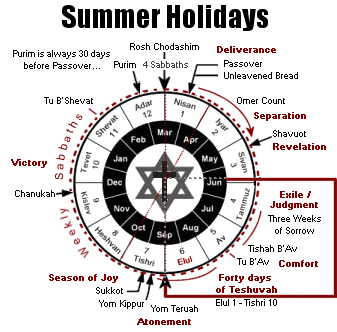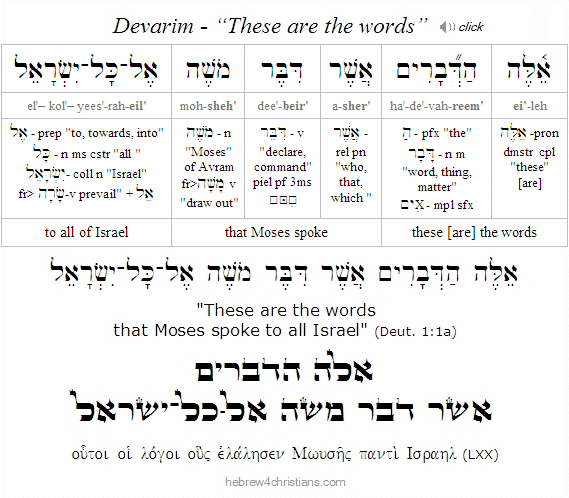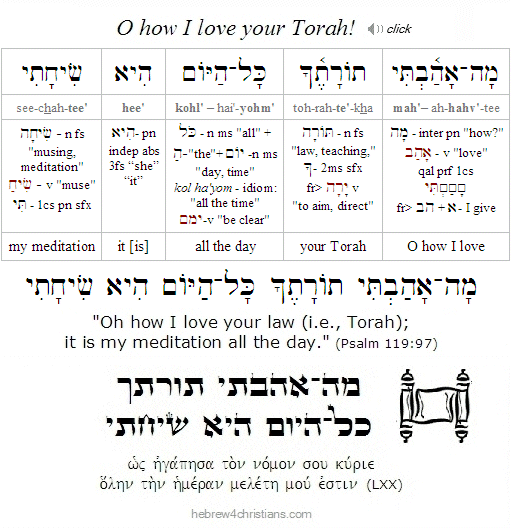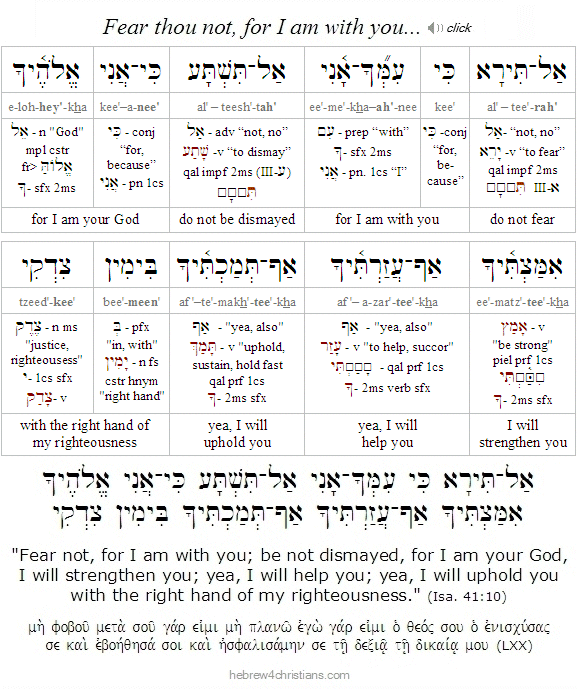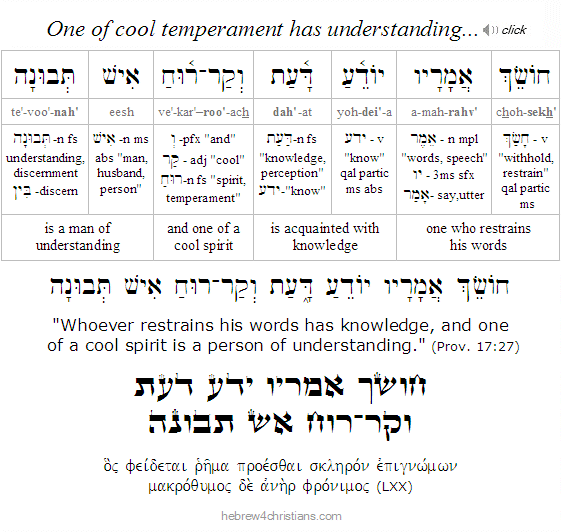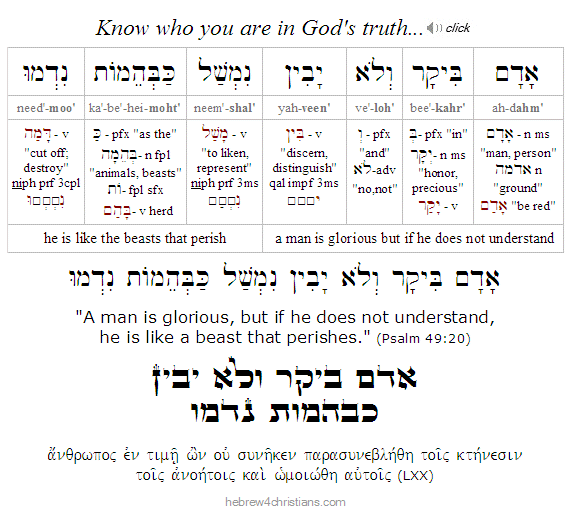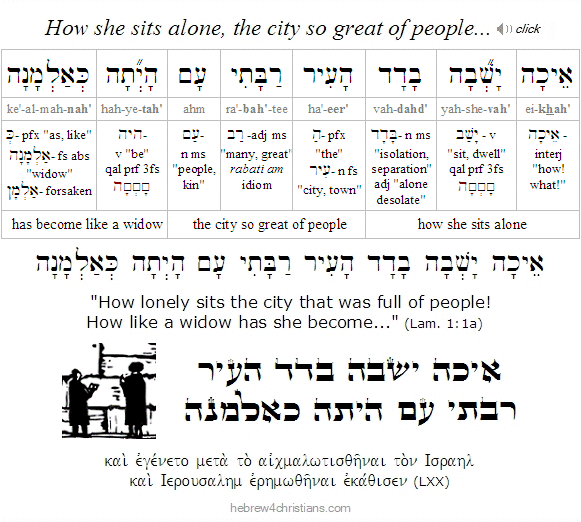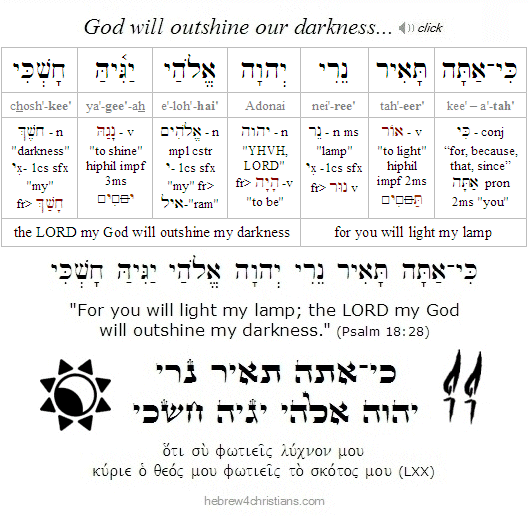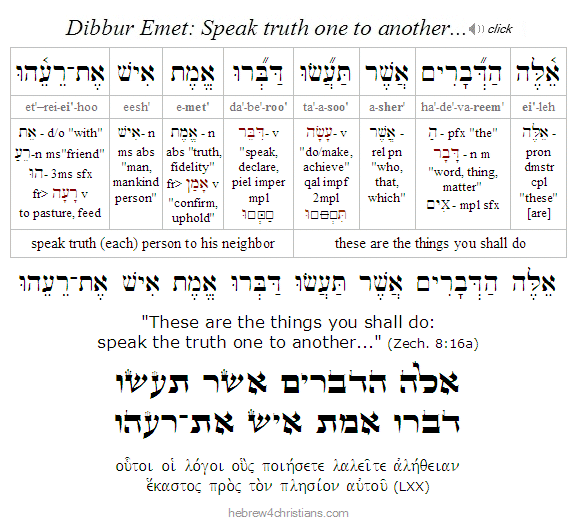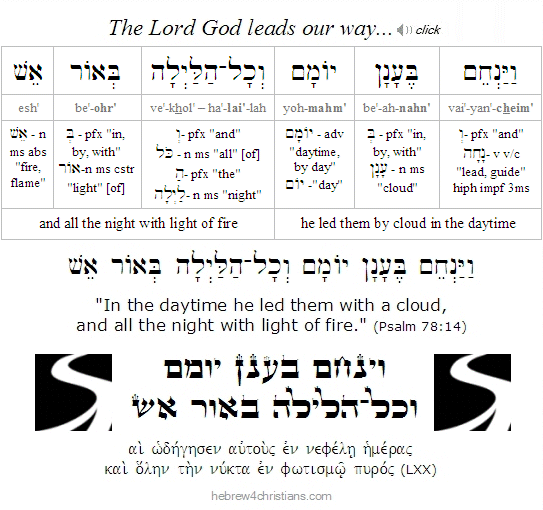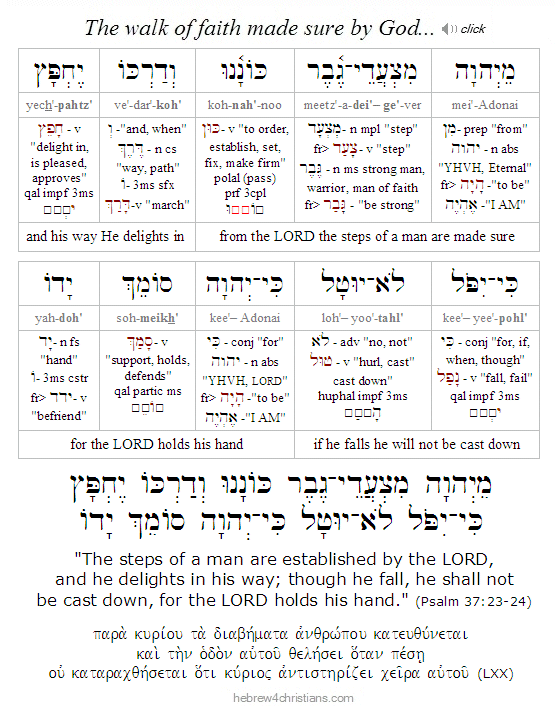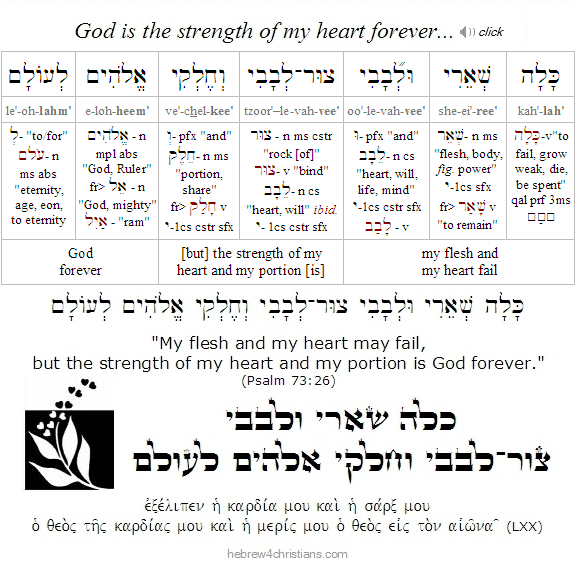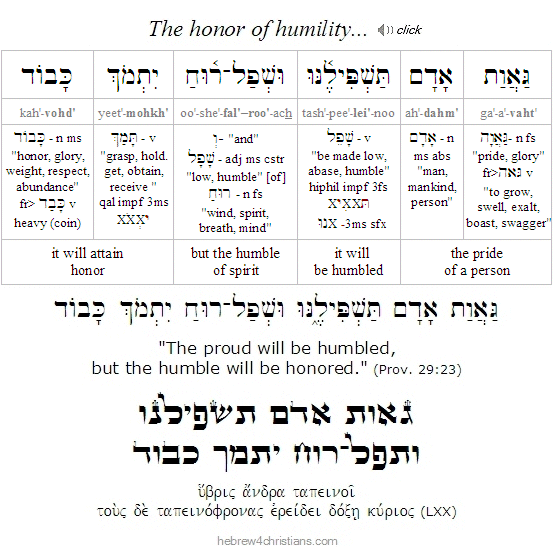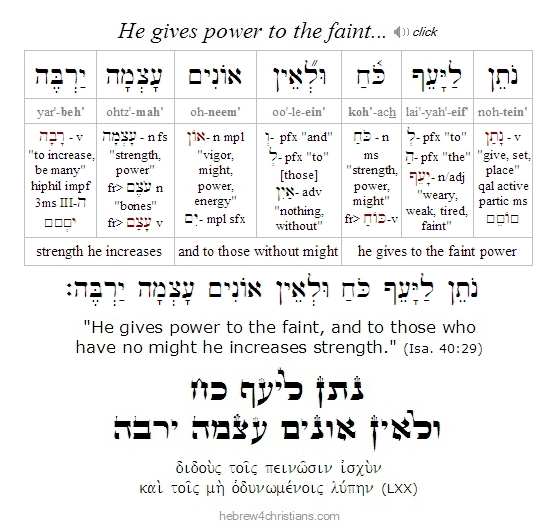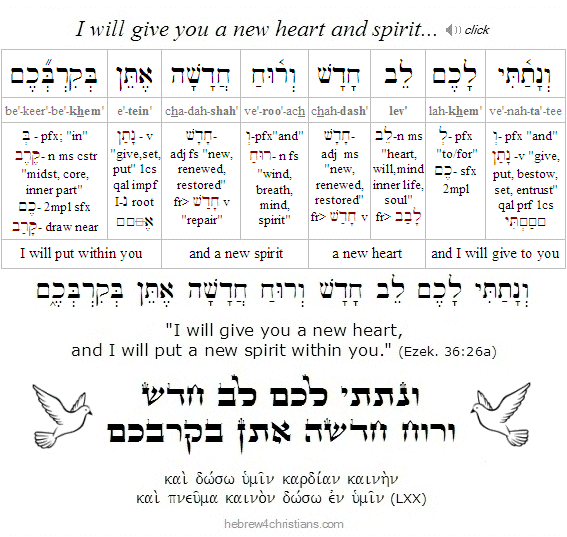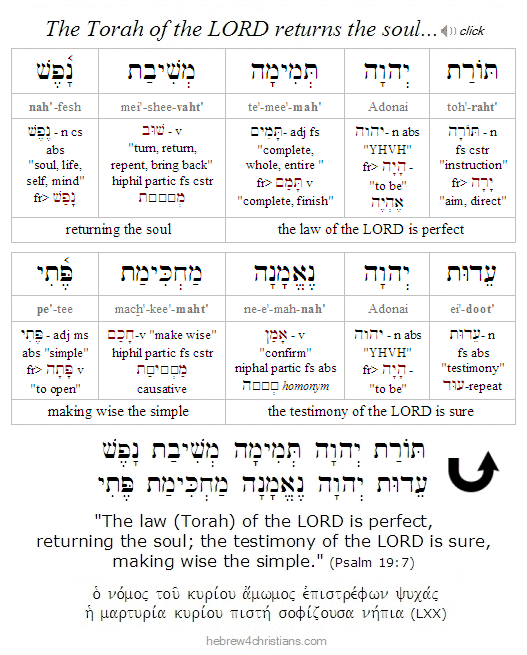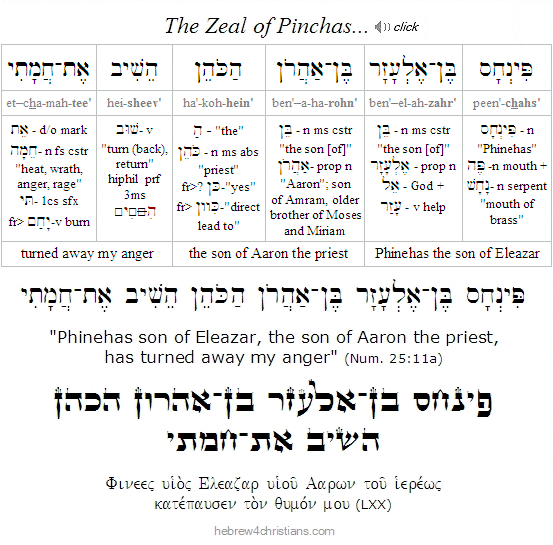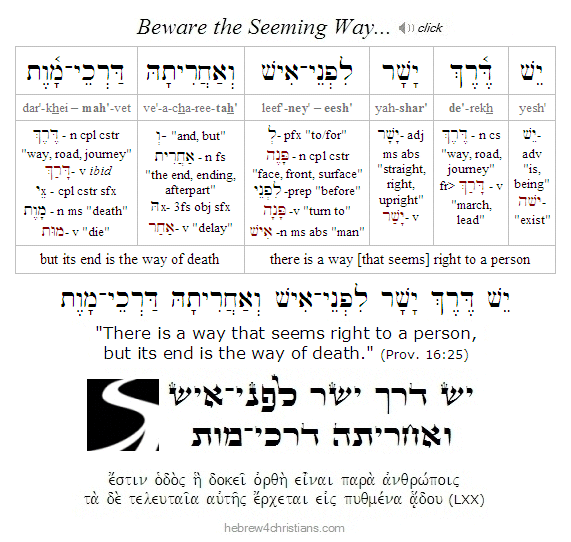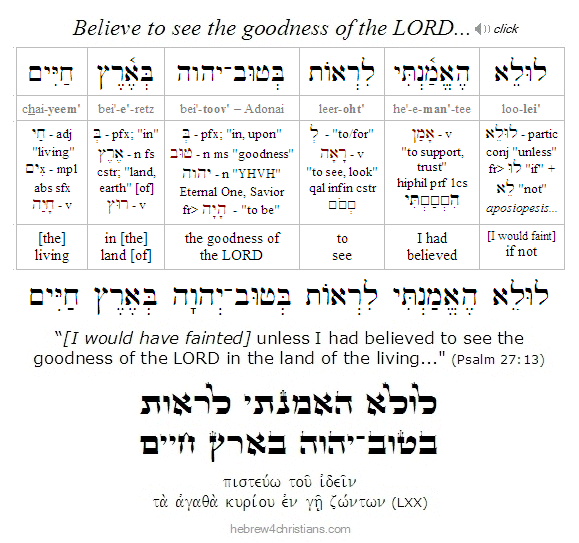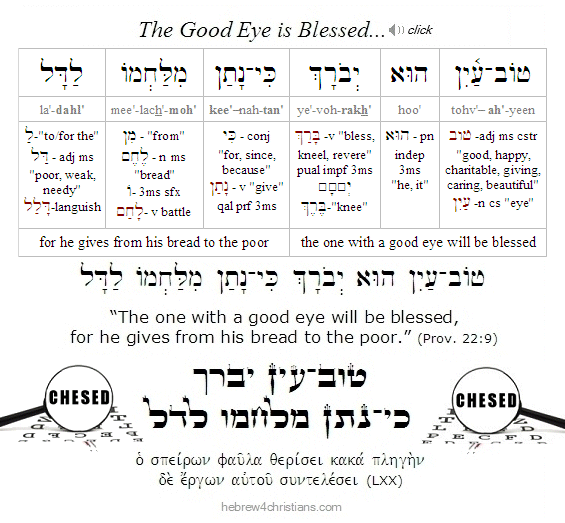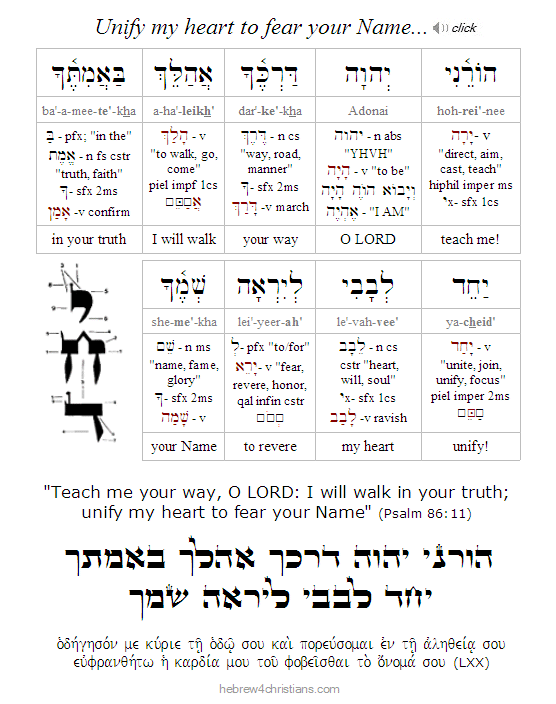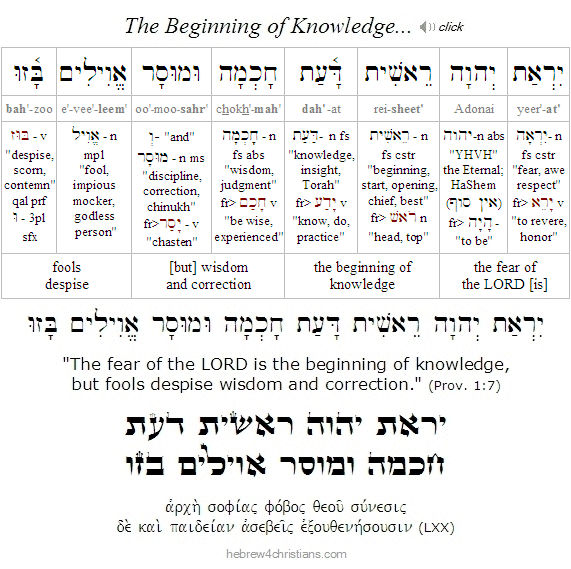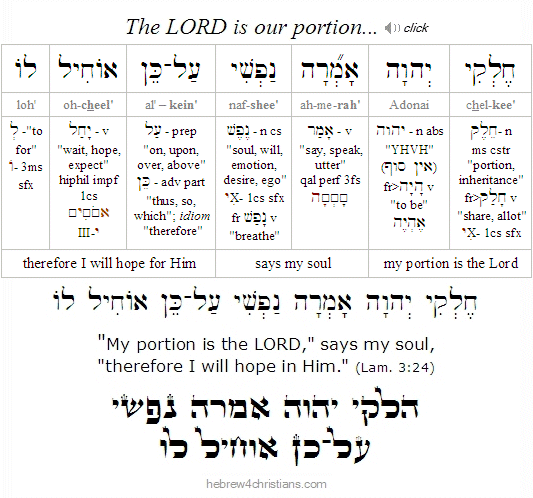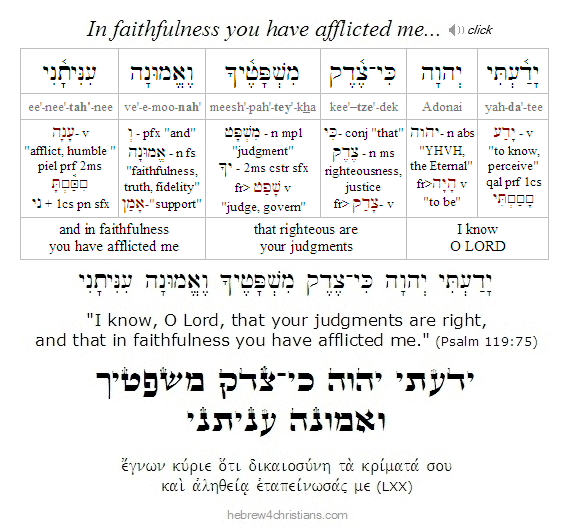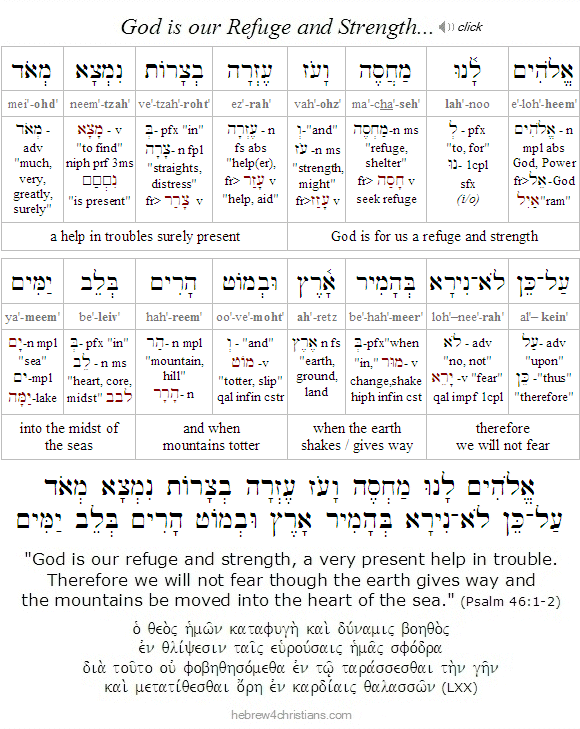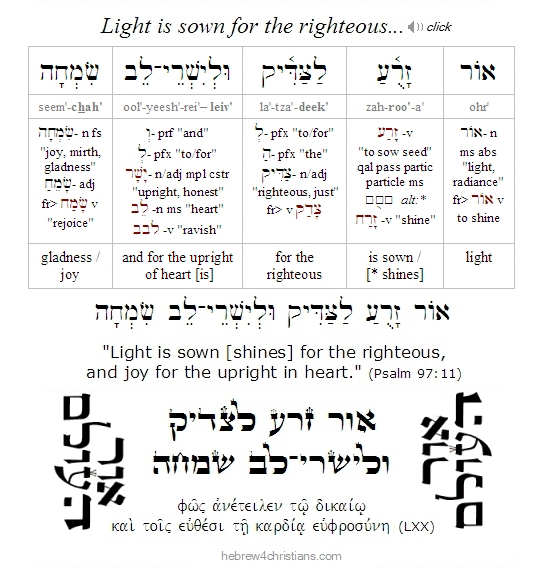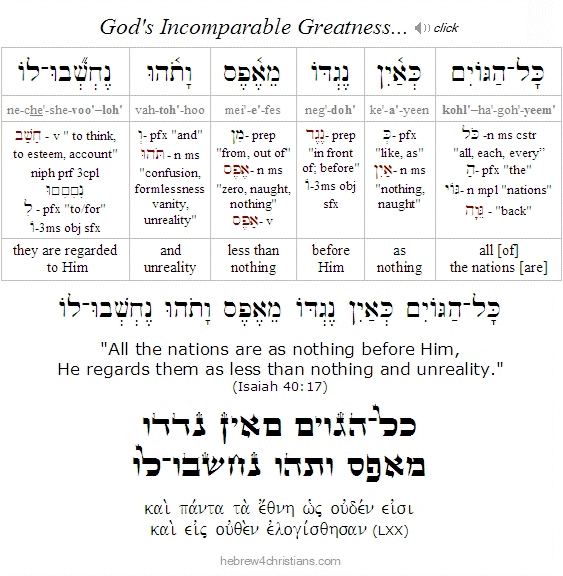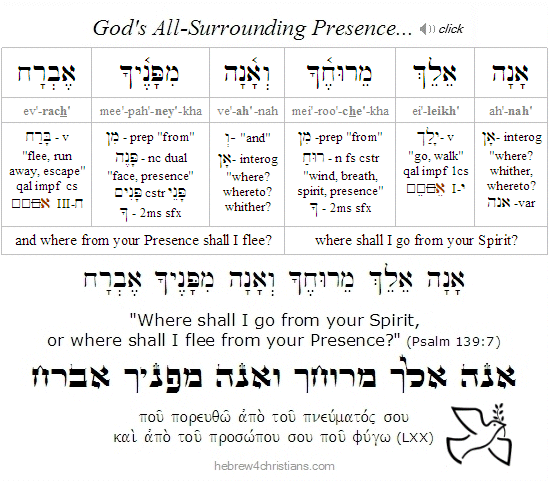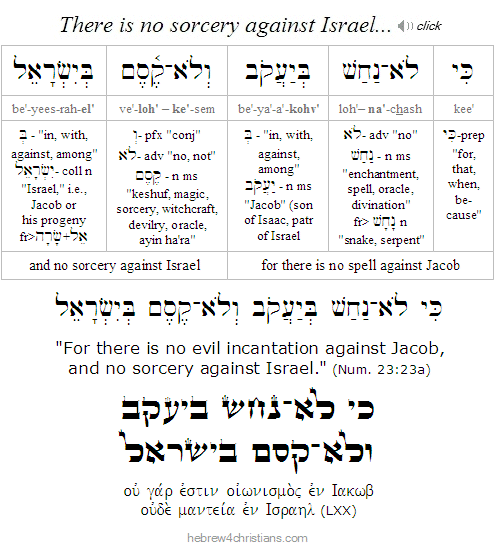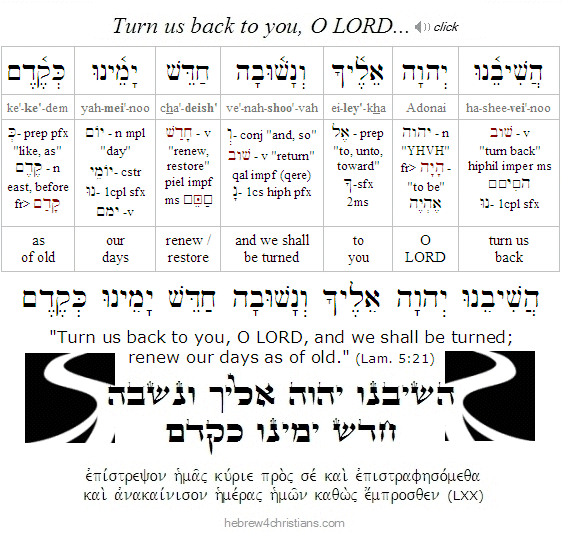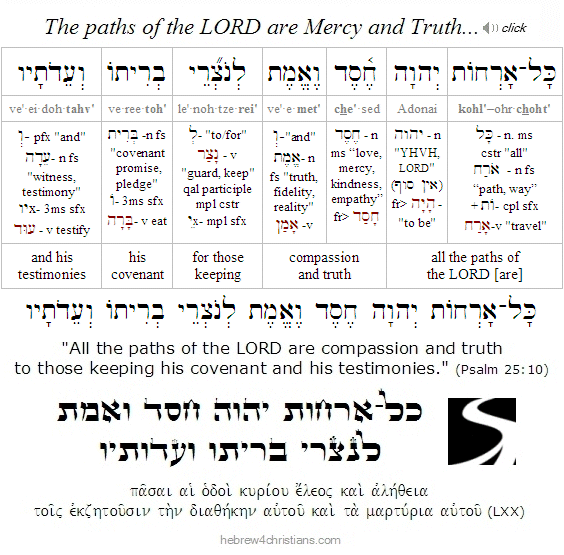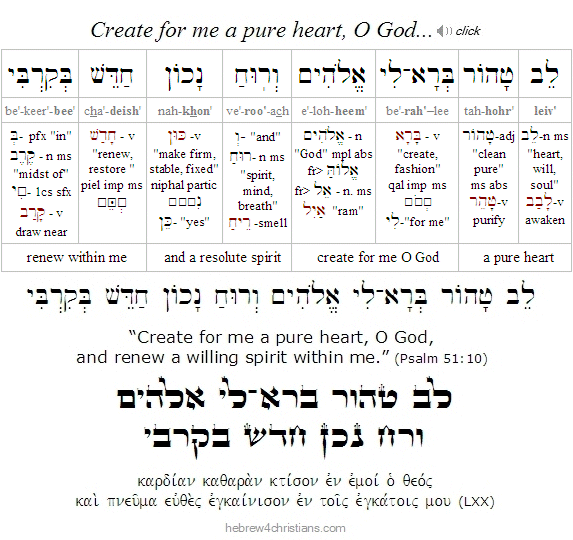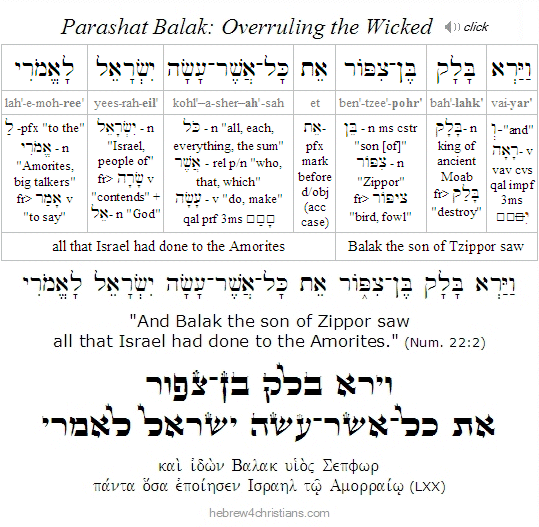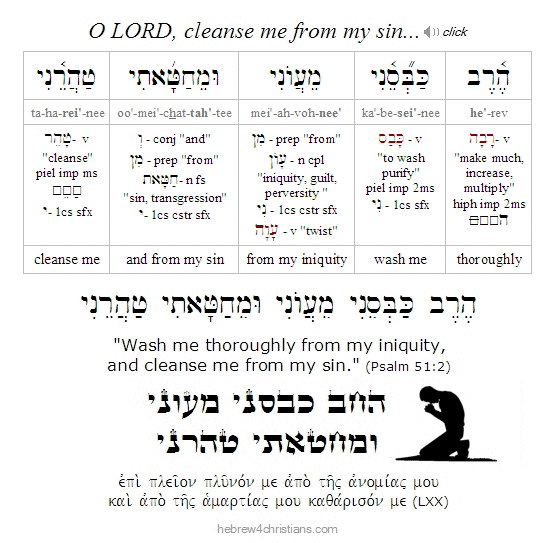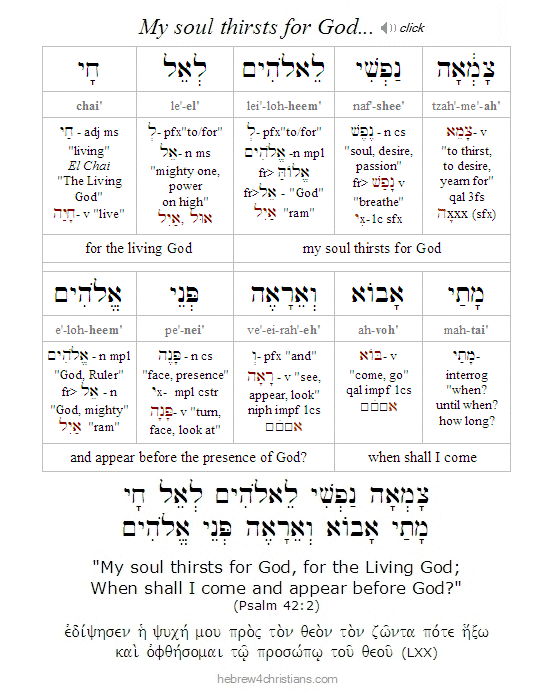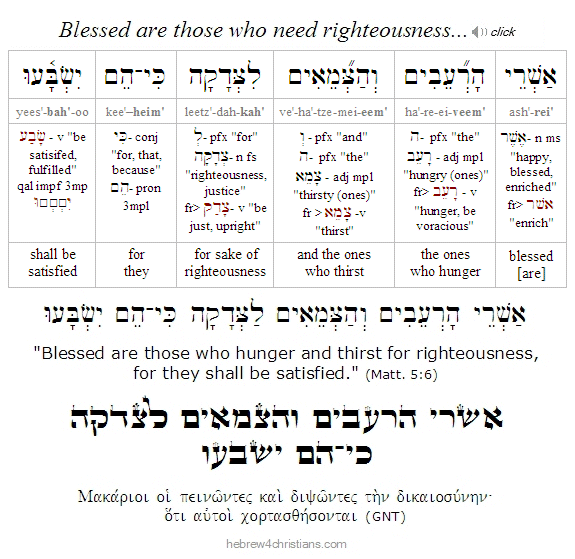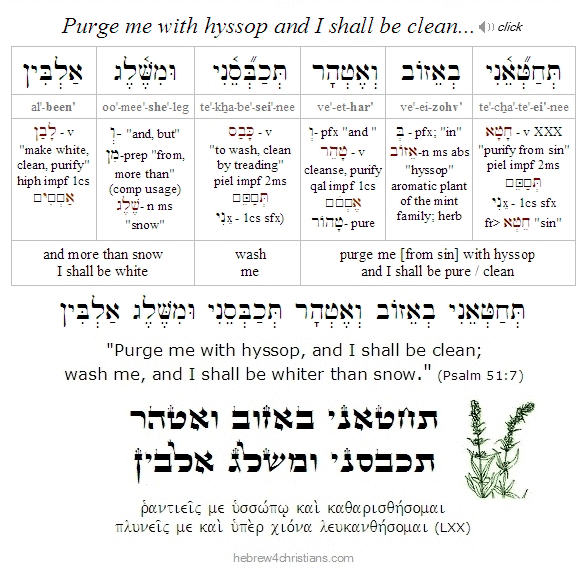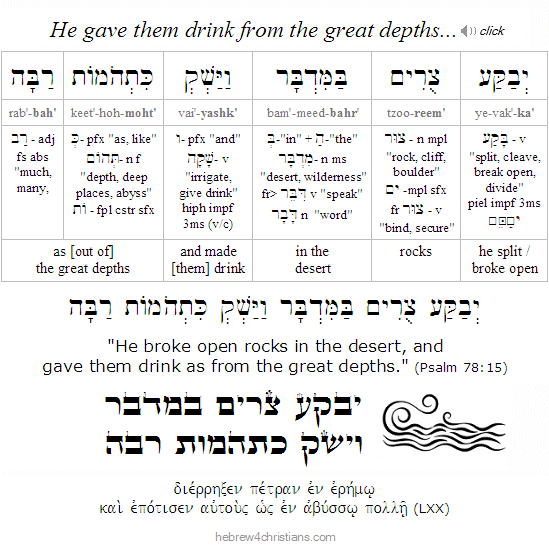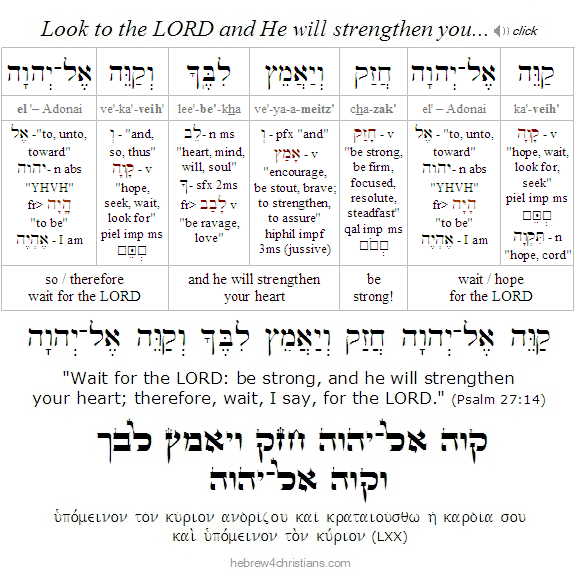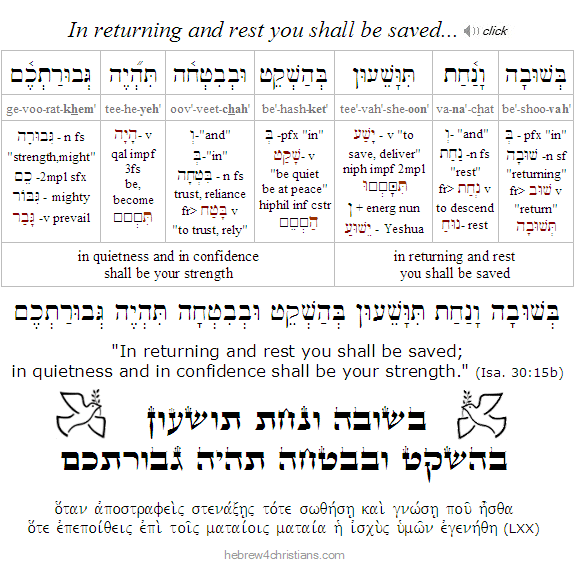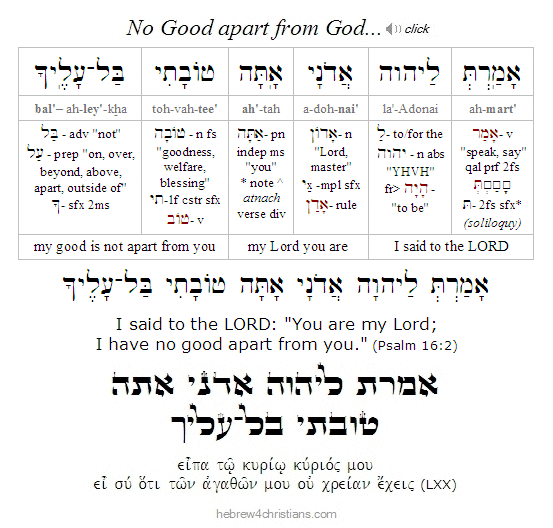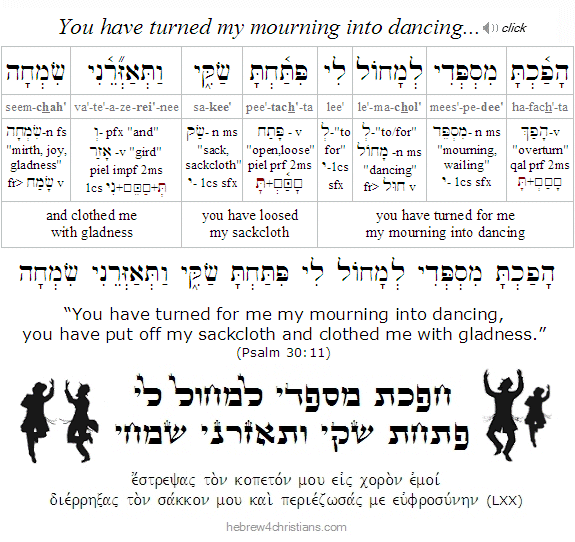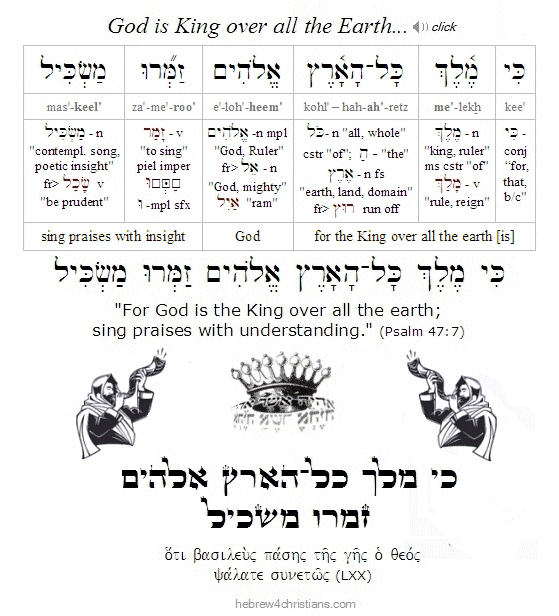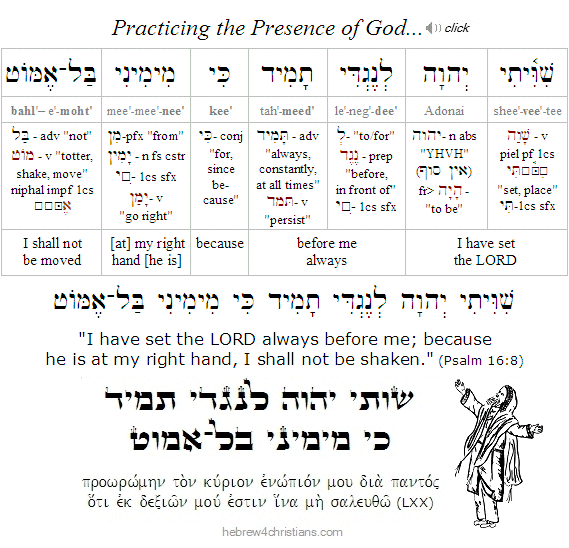|
Jewish Holiday Calendar
For July 2022 site updates, please scroll past this entry....
In the summer there occurs a three week period of mourning that begins with the Fast of Tammuz and ends with Tishah B'Av. The last nine days of this three week period (i.e., from Av 1 until Av 9th) are days of increased mourning. However, after this somber time, the romantic holiday of Tu B'Av, the 15th of Av occurs. Summer ends with the 30 days of the month of Elul, a yearly season of teshuvah (repentance) that anticipates Rosh Hashanah and the fall holidays. The 30 days of Elul are combined with the first 10 days of the month of Tishri to create the "Forty Days of Teshuvah" that culminate with Yom Kippur.
Because they occur between the spring and fall holidays, the summer holidays help us prepare for the second coming of the Messiah:
The Summer Holidays:

Note that in accordance with tradition, holiday dates begin at sundown. Moreover, some holidays may be postponed one day if they happen to fall on the weekly Sabbath:
- Month of Tammuz (Tues. June 28th [eve] - Thurs. July 28th [day])
- Month of Av (Thurs. July 28th [eve] - Fri. Aug. 26th [day])
- Month of Elul (Fri. Aug. 26th [eve] - Sun. Sept. 25th [day])
- Month of Tishri (Sun. Sept. 25th [eve] - Mon. Oct. 24th [day]) - Fall holidays begin!
Note: For more about the dates of these holidays see the Calendar pages....
July 2022 Updates
Shavuah Tov Podcast:
Parashat Devarim...
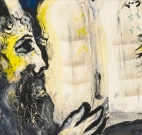
07.31.22 (Av 3, 5782) Our Torah reading this week (i.e., parashat Devarim) is the very first portion from the Book of Deuteronomy (ספר דברים), which is always read on the Sabbath that immediately precedes the somber holiday of Tishah B'Av (תשעה באב). In Jewish tradition, this special Sabbath is called "Shabbat Chazon" (שַׁבַּת חַזוֹן), "the Sabbath of Vision," since the Haftarah that is read (i.e., Isa. 1:1-25) comes from the vision of the prophet Isaiah regarding the destruction of the Holy Temple in Jerusalem. In both Jewish tradition and liturgy, teshuvah (repentance) and viduy (confession of sin) are the themes of this preparatory Sabbath.
The Summary Book of Torah...

07.31.22 (Av 3, 5782) Shavuah tov, friends. This week we begin reading the concluding book of the Torah, called Sefer Devarim (ספר דברים), so named from the phrase eleh ha'devarim ("these are the words...") found in its opening verse (see verse below). In our English Bibles, Sefer Devarim is known as the Book of "Deuteronomy," from a Greek word meaning "second (or repeated) law" (i.e., δευτερονόμιον), a term used to translate the phrase mishneh ha-Torah (i.e. משׁנה התורה, "copy of the Torah," in Deut. 17:18). Generally speaking, this book represents Moses' "farewell address" to the people of Israel before he died wherein he reviewed the history and the laws given to the people and repeatedly warned that obedience would bring blessing while disobedience would bring disaster. The series of personal discourses (or sermons) in this book all have the tone of rebuke and admonition, and indeed some of the sages have said it resembles a sort of "deathbed blessing" not unlike Jacob's blessing given to his sons...
Our Torah portion (פרשה) for this week, called parashat Devarim (פרשת דברים), is the very first reading of the Book of Deuteronomy which begins with Moses recounting the journey from Mount Sinai to the edge of the promised land. Moses mentioned the difficulty of personally governing the people and recalled how he had set up a system of judges to help him administer justice among the various tribes. He then reminded the people of the sin of the spies and the rebellion of the people at Kadesh Barnea which led to God's decree that no one of that generation would live to enter the land of Canaan (except for Caleb and Joshua). Moses then provided an outline of the 38 year exile of the Israelites back toward the Sea of Reeds, into the desert regions, and then back again until the subsequent generation was ready to enter the promised land. For more information, see the links listed below.
Our Meditation all the day...
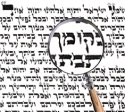
07.29.22 (Av 1, 5782) The Scriptures declare: "Blessed is the man who ... delights in the Torah of the LORD (בְּתוֹרַת יְהוָה); all that he does shall prosper" (Psalm 1:1-3). And while it is true that we are no longer 'under' the terms of the covenant given at Sinai (Rom. 3:23), we still delight 'in' the Torah and meditate on its precepts day and night (Psalm 1:2; 19:8; 119:15, 47, 97; Neh. 8:12, etc.). After all, Torah "written upon the heart" is a mark of the New Covenant believer (Jer. 31:31-33). As it is written in Proverbs: "If you seek it [i.e., the wisdom revealed in the Torah] like silver and search for it as for hidden treasures, then you will understand the fear of the LORD and find the knowledge of God" (Prov. 2:4-5).
Where it is written, "all Scripture is breathed out by God (θεόπνευστος) and is profitable for teaching, for reproof, for correction, and for training in righteousness, that the man of God may be complete, equipped for every good work" (2 Tim 3:16-17), it is evident that the Scriptures referred to here are the Jewish Scriptures (i.e., the Torah, the Prophets, and the Writings), since they are the foundation, the context, and the overarching matrix for the later New Covenant revelation. These were the Scriptures Yeshua used to contextualize and explain his ministry to his followers: "And beginning with Moses and all the Prophets, he interpreted to them in all the Scriptures the things concerning himself" (Luke 24:27; John 1:45).
This implies that the Torah has a logical, linguistic, and theological priority regarding our understanding of the New Testament, and the failure to read in context invariably leads to faulty interpretations and doctrinal errors of various kinds. "To the Jew first, and [then] to the Greek" (Rom. 1:16) is a principle not only of how the gospel message would transcend ethnic Israel to be offered to all the nations, but also about how we should approach the subject of Biblical "hermeneutics." God "breathed out" his revelation in order, and the message itself must be understood in light of that order (John 4:22).
Hebrew Lesson
Psalm 119:97 Hebrew commentary (click):
Personal Note / Update: It has been an extremely busy week for me, with various ministry issues (including Facebook harassment), my mom being hospitalized, my brother-on-law coming out of bypass surgery, my son Josiah being diagnosed with Covid, and Olga's grandmother passing away... Notwithstanding all this, let me wish you "Shabbat Shalom," the peace of the Lord to be upon you, the blessing of the Lord to uphold you, and the love of the Lord to establish your heart in all things. - John
Sufficient unto the day...

07.29.22 (Av 1, 5782) In the Gospel of Matthew we read these words of our Lord: "Therefore do not be anxious about tomorrow, for tomorrow will be anxious for itself. Sufficient for the day is its own trouble" (Matt. 6:34). Soren Kierkegaard comments: "If there is no next day for you, then all earthly care is annihilated. When the next day comes, it loses its enchantment and its disquieting insecurity. If there is no next day for you, then either you are dying or you are one who by dying to temporality has grasped the Eternal, either one who is actually dying or one who is really living... The one who rows a boat turns his back to the goal toward which he is working. So it is with the next day. When, with the help of the Eternal, a person lives absorbed in today, he turns his back to the next day. The more he is eternally absorbed in today, the more decisively he turns his back to the next day." Amen. Today is the day of salvation; today may we hear His voice...
"If there is no next day for you, then either you are dying or you are one who by dying to temporality has grasped the Eternal, either one who is actually dying or one who is really living..." [Kierkegaard]
"For he that loses his life will find it..." (Luke 17:33). But how are we to understand this? An old story from the Desert Fathers comes to mind. A visitor came to the Master and was struck by his radiance. Later he spoke to a disciple and asked him for an explanation. The disciple quoted the Master's words, "Truly, truly, I say to you, unless a grain of wheat falls into the earth and dies, it remains alone; but if it dies, it bears much fruit" (John 12:24). Life is a sacred mystery, but death provides the key to unlock its meaning. We can "turn the key" by surrendering ourselves in silent expectation before God. Once we die to life in this world we are set free and empowered to live in joy and gratitude for everything. We experience serenity as we let go in surrender to God's care.
A person must be content to be as he is; a dependent being, as little capable of sustaining himself as of creating himself. If we choose to forget God and look after our own sustenance, then we are overcome with anxiety. It is certainly praiseworthy and pleasing to God when a person works for his food. But if he forgets God, and thinks that he himself is supporting himself, then he becomes burdened with the necessities of life... Worry about making a living, or not making a living, is a snare. In actuality, it is the snare. No external power, no actual circumstance, can trap a person. If a person chooses to be his own providence, then he will go quite ingenuously into his own trap, the wealthy as well as the poor. If he wants to entrench himself in his own plot of ground that is not under God's care, then he is living, though he does not acknowledge it, in a prison. When the farmer shut the door on the wood dove, the wood dove believed himself to be safe, when in fact he was caught. Or to put it another way, he was shut out from the care of Providence and trapped in a life of anxiety. In a spiritual sense he made himself a captive and "trapped himself unto death." (Kierkegaard UPD)
It is the saddest thing of all if a human being goes through life without discovering his need for God. Therefore blessed indeed are the poor in spirit, for theirs is the kingdom of heaven (Matt. 5:3). It is a "blessed fault" to understand our inner poverty, to know anguish of heart, and to be able to abide in God's salvation one day at a time....
The Spirit cries out: "Fear not, for I am with you..." אַל־תִּירָא כִּי עִמְּךָ־אָנִי. What we need most of all is right here, present in this hour, whether we're conscious of it or not. God is with you, even if you feel alone, lost in darkness, unclean, afraid... "Dear Lord Jesus, I don't know who I am, I don't know where I am, and I don't know what I am, but please love me" (prayer of a sufferer from Alzheimer's disease). That's what we need most, to trust that we are safe in God's love, and that's the ultimate message of our atonement in Messiah.
Hebrew Lesson
Psalm 41:10 Hebrew reading (click):
Words and the Heart...

07.29.22 (Av 1, 5782) During his lectures on Jewish values, Joseph Telushkin used to ask his audience if they could go 24 hours without saying any unkind words about, or to, anybody. Most people said no, they couldn't. Rabbi Telushkin then commended them for their honesty, but then pointed out that if he had asked them if they could go 24 hours without drinking alcohol and they likewise said they couldn't, wouldn't that mean they have a serious drinking problem? (Words that Hurt). His point was that if you can't go 24 hours without saying unkind words about others (or raging at the world), you have lost control of your tongue. As Yeshua explained, words express the condition of the heart, since "from the abundance of the heart the mouth speaks" (Luke 6:45). Therefore the root issue concerns the heart (לֵב), the "midst of the self" that wills, desires, and chooses how to interpret and describe the world. If we choose to see from a heart of fear, we will tend to use our words as a weapon; but if we see with a heart of faith, we will seek to build others up....
In the Book of Proverbs we read, "Whoever restrains his words has knowledge, and one of a cool spirit (i.e., temperament) is a person of understanding" (Prov. 17:27). The Chofetz Chaim comments: "When people are preparing a telegram, notice how carefully they consider each word before they put it down. That is how careful we must be when we speak." As James admonishes us: "Let every person be quick to hear, slow to speak, slow to anger" (James 1:19). Friends, let us pray to be delivered from agitated passions and the hurtful words we sometimes say... May God give us hearts of peace that are restrained by the Spirit of God.
Hebrew Lesson
Proverbs 17:27 Hebrew reading (click):
The Glory of His Image...

07.29.22 (Av 1, 5782) One of the great tragedies of life - perhaps the greatest tragedy of all - is to walk your days without knowing the truth about why you exist and who you really are. Torah reveals that you are created b'tzelem Elohim (בצלם אלהים), in the very "image of God," for the purpose of knowing your Creator and understanding his love for you. Sin, however, has marred the divine image and therefore your heart needs to be recreated by means of the miracle of spiritual regeneration (1 Pet. 1:23). "This is the life of eternity: to know you, the only true God, and Yeshua the Messiah whom you have sent" (John 17:3).
Any "anthropology" or idea of man that is not grounded in this central reason for human existence debases the transcendent realm of human life to that of a "object" subject to impersonal forces... Naturalism reduces man to an animal that perishes and is no more (2 Pet. 2:12). The truth that our inmost existence is healed by regeneration restores us to the realm of the divine, reflecting the image of God anew, and therefore we are instructed to respect ourselves by honoring the gift of life that has been bestowed to us.
It is written: "A man is glorious (or "precious"), but if he does not understand, he is likened to a beast that perishes" (Psalm 49:20). Such a person is dehumanized and loses his connection with who he really is, for like an animal that is without "likeness" (דמה) to God, so he will be devoid of spiritual perspective, reasoning that all that is real concerns the immediacy of the present hour. He will be limited and bound to the dark "matrix" of this world wherein everything seems "natural" and everything happens as a result of material causes alone. The "natural man" can live his entire life without recognizing God's hand at work behind the scenes. His presuppositions and hardness of heart blind his eyes from apprehending spiritual reality. Those who have come alive and know God through the blessing of Yeshua the Messiah, however, shall also bear the image of the man of heaven, and "we all, with unveiled face, beholding the glory of the Lord, are being transformed into the same image from one degree of glory to another. For this comes from the Lord who is the Spirit" (2 Cor. 3:18).
Hebrew Lesson
Psalm 49:20 Hebrew reading (click):
Knowing the Times and Seasons:
The Month of Av...
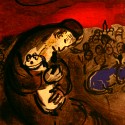
[ Today marks Rosh Chodesh Av, the start of the month of Av... ]
07.29.22 (Av 1, 5782) On the Biblical calendar, the fifth month of the year (counting from Nisan) is called "Av" (אָב) in Jewish tradition. The month of Av is traditionally regarded as the most tragic in the Jewish calendar. On the first day of this month, Aaron (the first High Priest of Israel) died (Num. 33:38), which was considered a ominous event. On the ninth day of the month (i.e., Tishah B'Av), the LORD decreed that the original generation rescued from Egypt would die out in the desert and be deprived from entering the Promised Land because they believed the faithless report of the Spies (Num. 13-14). Later both of the Holy Temples were destroyed on the ninth day of Av as well...
Because both of the Temples were destroyed on the ninth of Av, this date is remembered as lowest point of the "Three Weeks of Sorrow" (שלושה שבועות של צער) that began with the fast of the 17th of Tammuz (undertaken to recall both the shattering of the tablets after Moses discovered the people worshiping the golden calf and also the breach in the walls of Jerusalem by the Babylonians before the First Temple was destroyed). During this period, weddings and parties are forbidden. It is a time for solemn reflection and mourning for Israel.
The last two portions of the Book of Numbers (Mattot - Masei) are always read during the "Three Weeks of Sorrow." The sages say these readings were selected at this time to ultimately comfort us as we look forward to the "apportioning of the land" -- i.e., the ultimate fulfillment of God's promises to us. Indeed, the month of Av -- despite the sorrow of the loss of the Temple -- is sometimes called "Menachem Av" (מנחם אב) - the "Comfort of the Father." One day the lamentations of our present state of exile will come to an end.
Menachem Av may also mean the "comfort of Aleph-Bet" (אב). The Prophet Jeremiah, who witnessed the destruction of the Temple, later wrote the scroll of Lamentations to commemorate this tragic time. The form of Lamentations is an acrostic based on the letters of the Hebrew Aleph-Bet (like Psalm 25, 34, 37, 119, Prov. 31, etc.). The scroll has five sections (perekim). The verses of the first two chapters and the last two chapters all are written in alphabetical order (א,ב,ג). The middle chapter, however, writes its verses using a triple Aleph Bet ordering, i.e., "Aleph, Aleph, Aleph," "Bet, Bet, Bet," "Gimmel, Gimmel, Gimmel," and so on. Since Yeshua is called the "Aleph and Tav" of God (האלף והתו) in Rev. 23:13, the comfort of the Father is revealed in Him! Yeshua is "et" (את), the direct sign and wonder of God!
Since the Book of Deuteronomy is mishneh Torah - a "retelling of Torah," it can be said that the written Torah -- from a narrative point of view -- ends with the reading of these final portions from Numbers, and by extension, with the yearning for Zion. And so it is to this day. We await the return of our Messiah while we live in exile here on earth. And even though the Temple of the LORD is spiritually present in the Person of the resurrected Messiah, it will be made fully manifest in the days to come: first in the Millennial Kingdom (after Yeshua's Second Coming), and later still in olam habah (the world to come) as the eternal community of those redeemed by the Lamb of God (Rev. 21:22-23). So for those of us who hold faith in Yeshua as Messiah, our mourning for the Temple is really mourning for the Presence of our Beloved Savior.
Hebrew Lesson
Lamentations 1:1 reading (click):
Overcoming the Darkness...

07.29.22 (Av 1, 5782) These are indeed dark days, and it is difficult not to be seduced by the profanity and fear of this evil world... The mass media is controlled to run it's scripts; the love of many runs cold; and people are living in fear of the "pestilence that walketh in darkness" and the "destruction that wasteth at noonday." So what do we do but encourage ourselves to look to the LORD for His salvation. We groan; we lament; we protest: "How long O LORD?" And yet we resolve to make our refuge in God's promises "until these calamities be overpast...." (Psalm 57:1; Isa. 26:20)
As a seed planted within soil seeks life by "reaching" for the sun, so our souls are drawn upward by the desire for God. The Lord calls us "out of darkness into his marvelous light" (1 Pet. 2:9); he calls us to awaken, to grow, and to come to the fullness of his life (John 10:10). Being called "out of darkness" means being set free of those spiritual forces that attempt to hold us captive. When we turn to the Divine Light for our sustenance and healing, we are set free from the pain of our fears and the insanity of evil (Acts 26:18). As it is written: "God has not given us the spirit of fear, but of power (δύναμις) and of love (ἀγάπη), and of a "sound mind" (2 Tim. 1:7). The Greek word "sound mind" (σωφρονισμός) comes from the verb sodzo (σῴζω), meaning "to save," from saos (σάος) "safe," in the sense of being under care and influence of the Spirit of God. "God is light, and in him is no darkness at all" (1 John 1:5). Heeding the truth of Yeshua grounds you in what is real and reveals your identity and provision as a child of God, as it is written: "For you are my lamp (כִּי־אַתָּה תָּאִיר נֵרִי), O LORD, and my God lightens my darkness" (Psalm 18:28).
Hebrew Lesson
Psalm 18:28 Hebrew reading (click):
Torah of Speaking Truth...
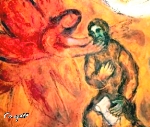
07.28.22 (Tammuz 29, 5782) The Torah of "speaking truth," of being honest and upright (i.e., yashar: יָשָׁר) with ourselves and others, is called dibbur emet (דברי אמת) in Hebrew. Dibbur emet, or speaking truth, is the duty to use words and language with integrity and justice. "These are the things you are to do: speak truth (דַּבְּרוּ אֱמֶת) to one another; render in your gates judgments that are true and make for peace!" (Zech. 8:16; see also Lev. 19:11; Eph. 4:25, Col. 3:9, among other verses). Note that dibbur emet also forbids spreading gossip, sharing worthless news reports, expressing contempt, mockery, or outrage over the viewpoints of others, and so on. An honest person doesn't play games with words but understands that communication is a sacred trust. Our words are to be regarded as sacred, as an expression of truth. God has made us inviolable promises, and just as His word is sacred, so should we strive to be sacred in our speech, too (Matt. 5:37).
Hebrew Lesson
Zechariah 8:16 Hebrew reading (click):
Our ability to use language and reason is essential to the image of God within us, and evil speech, or lashon ha'ra (לָשׁוֹן הָרָה), consequently profanes and corrupts the soul. Therefore the sages identify a metzora (i.e., leper) with hamotzi ra, "one who brings forth evil," and they stress shemirat ha-lashon (שְׁמִירַת הַלָּשׁוֹן), or "guarding of the tongue," as a central virtue of the righteous. In Jewish ethical thinking, speaking the truth must be contextualized with good will and kindness, and this implies that purposely saying something that to shame another person is forbidden. Some of the sages, such as the Chofetz Chaim, have gone so far as to say that you are forbidden to say anything evil about a person even if it is true. There are exceptions to this rule, of course, for example in legal proceedings when eye-witness testimony that a crime was committed is required for the sake of justice, but in general the sages recommend avoid saying anything gratuitously negative about others by using the good eye to look for their good qualities...
Our Lord went well beyond these requirements and told us that whatever is spoken in this life is "echoed" throughout eternity and will be reheard upon the day of judgment: "I tell you, on the day of judgment people will give account for every careless (ἀργὸν) word they utter, for by your words you will be justified, and by your words you will be condemned" (Matt. 12:36-37). Our words, especially the words of our heart, are as prayers spoken to heaven. We are especially warned against making promises we might break: "Let what you say be simply 'Yes' or 'No'; anything more than this comes from evil" (Matt. 5:37). All this implies that our thinking, which is expressed in our words, must be sanctified as well. We have a duty to think clearly and righteously, and therefore evil and fearful thoughts are forbidden as well ...
"Come, O children, listen to me; I will teach you the fear of the LORD. What person is there who desires life and loves many days, that he may see good? Keep your tongue from evil and your lips from speaking deceit. Turn away from evil and do good; seek peace and pursue it." (Psalm 34:11-14). Fearing the LORD means being filled with the wonder of the Divine Presence. The one who fears the LORD will "see good," that is, he will see the goodness of his surroundings in the light of God's Presence. Seeing the good in others, using ayin tovah (a good eye), is therefore the contrary of lashon hara, or slander. Our words should be used to upbuild, edify, and esteem others, not to tear them down. Lashon hara is evidence, then, of a critical spirit, an evil eye, and a suspicious heart. We must look to God for the miracle of seeing the truth of His goodness in all things.
"Set a guard, O LORD, over my mouth; keep watch over the door of my lips" (Psalm 141:3). Those who think it easy to control the tongue have likely never really tried to do so. "The tongue is a small member, yet it boasts of great things. How great a forest is set ablaze by such a small fire! And the tongue is a fire, a world of unrighteousness. The tongue is set among our members, staining the whole body, setting on fire the entire course of life, and set on fire by hell" (James 3:5-6). Ultimately, controlling your tongue is a matter of controlling your inner thoughts, your heart, and your attitude, called shemirat ha-lev (שמירת הלב). Therefore we are admonished to be "quick to hear, slow to speak, slow to anger," since the anger of man never works the righteousness of God (James 1:19). May the LORD our God help us always to speak with grace, "seasoned with salt" (Col. 4:6); and may we all "speak the truth in love to grow up in every way" (Eph. 4:15). "Let my words and the meditation of my heart be acceptable to you, O LORD, my Rock and my Redeemer" (Psalm 19:14). Amen.
Hebrew Lesson
Psalm 19:14 Hebrew reading (click):
Sojourning the Promise...
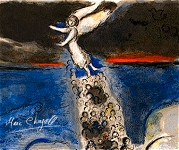
07.28.22 (Tammuz 29, 5782) Our Torah reading this week (i.e., Masei) reviews the journey of the Israelites after the Exodus from Egypt to various places along the way to the Promised Land. The portion begins: "These are the journeys (מַסְעֵי) of the people of Israel, when they went out of the land of Egypt by their companies under the leadership of Moses and Aaron" (Num. 33:1). The portion then continues with a somewhat puzzling statement: "And Moses wrote down their starting places of their journeys (מוֹצָאֵיהֶם לְמַסְעֵיהֶם), as directed by the LORD," and then adds "and these are their journeys to their starting places (מְַסְעֵיהֶם לְמוֹצָאֵיהֶם)." The sages note here that the "starting places" are first mentioned followed by the "journeys to them" to indicate a sort of circularity about where we begin and end on our way to our inheritance. En route to the promise, we will wander and we will settle, and both our wandering and our settling are related to each other. The places we leave and the places we come evoke questions about our overall journey, such as "Where are we finally going? Will we ever arrive? How long before we can move forward?" and so on.
We are all on a journey, and each step of the way represents a starting point that leads to another journey along the way. We walk "as directed by God," literally," according to the Word of the LORD" (עַל־פִּי יְהוָה). "At the command of the LORD we encamp, and at the command of the LORD we journey" (Num. 9:23). Both our going and our coming are supervised by God. The ongoing reassembling of the Mishkan ("Tabernacle"), the arrangement of the settlements, the setting up of tents, and so on, all taught the people to constantly renew their lives before God during the days of their sojourning...
Hebrew Lesson
Psalm 78:14 Hebrew reading (click):
The Way of Escape...
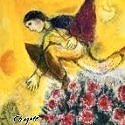
07.27.22 (Tammuz 28, 5782) Where it is written, "God is faithful, and he will not let you be tempted beyond your ability, but with the temptation he will also provide the way of escape, that you may be able to endure it" (1 Cor. 10:13), we note that the Greek text says that God will actively "make with the temptation the way of escape" (ποιήσει σὺν τῷ πειρασμῷ καὶ τὴν ἔκβασιν) so that you may be able to bear it.... When I was younger, I tended to think of temptation as the appeal to gratify my flesh, to impulsively seek hedonistic pleasure, and so on, but now I understand "temptation" (πειρασμό) to encompass far more than just that.
For instance, whenever I regard my experience in human or "natural" terms, apart from the consciousness of God's all-pervading and sustaining Presence, then I am surely under temptation. Fear, anger, despair, self-pity, and so on -- all are temptations to unbelief... This encouraging verse, then, assures us of the Divine Presence in every moment, at every turn of our journey, and in every circumstance. God is always present to help you as you turn to him in faith. The sages state in this regard: "God creates the cure before the plague," meaning that His love is the foundation of all things: עוֹלָם חֶסֶד יִבָּנֶה / olam chesed yibaneh: "steadfast love built the world" (Psalm 89:2). Just as God created mankind only after He created the pathway of repentance (i.e., the "Lamb slain from the foundation of the world": Eph. 1:4, Heb. 4:4, Rev 13:8), so the escape from temptation was likewise foreseen and provided. In all things, then, may we humble ourselves and seek God's face, understanding our radical dependence upon Him for our deliverance. Amen.
Hebrew Lesson
Psalm 37:23-24 reading (click):
Integrity of our Words...

07.27.22 (Tammuz 28, 5782) Our Torah reading this week (i.e., Mattot) discusses various laws regarding vows and oaths... We read: "If a person vows a vow (i.e., neder: נֶדֶר) to the LORD, or swears an oath (i.e., shevuah: שְׁבוּעָה) to bind himself by a pledge, he shall not break his word. He shall do according to all that proceeds out of his mouth" (Num. 30:2). The Hebrew expression "break his word" literally means "profane his word" (יַחֵל דְּבָרוֹ), that is, to defile the soul by causing it to be inwardly divided, irresolute, and cowardly. After all, breaking your word means violating the integrity of who you are, showing that what you say and what you do are not unified, and this leads to feelings of shame. Your words confess your reality and bring it to life... If you cannot keep your word, your word becomes profane, empty, lost -- you become a "stranger to yourself," unsure of what you intend. "Let your "yes" be yes and your "no" be no; learn to say what you mean and mean what you say (Matt. 5:37).
In the Book of Proverbs we read, "When words are many, transgression is not lacking, but whoever restrains his lips is wise" (Prov. 10:19). The Chofetz Chaim comments: "When people are preparing a telegram, notice how carefully they consider each word before they put it down. That is how careful we must be when we speak." As James admonishes us: "Let every person be quick to hear, slow to speak, slow to anger" (James 1:19).
Hebrew Lesson:
Proverbs 10:19 reading (click):
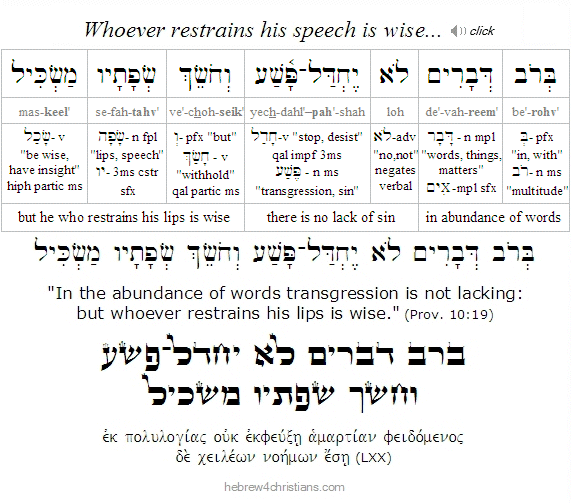 |
Since words represent thoughts, the use of our tongues has to do with how we choose to think... "Think on these things..." We are instructed to "take every thought captive" (αἰχμαλωτίζω, i.e., lead away as a prisoner) to the obedience of Messiah... It is wise to restrain our speech, because, after all, we often have no idea what we are talking about, and therefore our words can become unruly and even dangerous. Whenever we open our mouth to speak, Heaven is listening (Matt. 12:36-37).
The Central Thing...
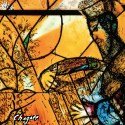
07.27.22 (Tammuz 28, 5782) From our Torah portion this week (i.e., parashat Mattot) we read: zeh ha'davar asher tzivah Adonai (זה הדבר אשׁר צוה יהוה), "This is the thing the LORD has commanded" (Num. 30:1). The language here seems to suggest that there is only one matter that God has commanded, namely, to speak truth and to be faithful in our promises (Num. 30:2). This is because the sacredness of our word is the foundation for all our other responsibilities. After all, if our word is equivocal, it is unclear, unreliable, undecided, and therefore ultimately meaningless.... Insincere words are without genuine commitment, and the lack of decisiveness undermines all Torah. זה הדבר אשׁר צוה יהוה - "This is the thing the LORD has commanded," namely, to accept your duty to honor the truth; to keep your faith in God's word; and to hold sacred your commitment before God. May the Lord help us be people of righteousness and truth. Amen.
Hebrew Lesson
Proverbs 8:7 Hebrew reading (click):
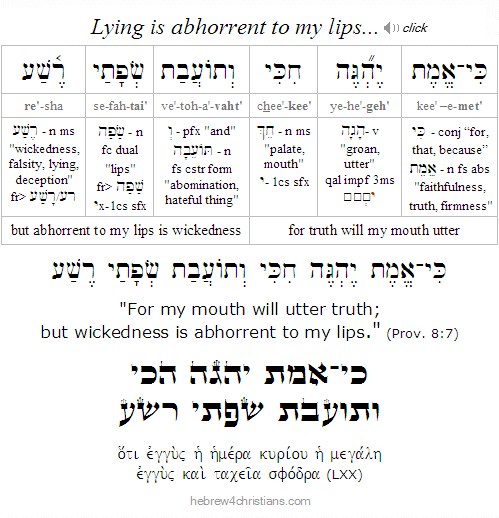 |
Blessing of Inner Peace...
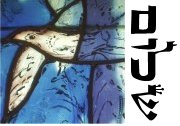
07.27.22 (Tammuz 28, 5782) Our Lord said: "Blessed are the peacemakers, for they shall be called the children of God" (Matt. 5:9). The peacemakers, or "doers of peace" (עֹשֵׂי שָׁלוֹם), are those who choose to bless others and use the "good eye" (העין הטובה) to envision the good and call it forth. Those who bless others are blessed themselves, and their blessing is revealed in their good will and simplicity of heart. No one is blessed through curses, gossip, or blaming others, even if they may feel justified in their "righteous" indignation. Harboring anger, resentment, or vindictive desire creates inner darkness, pain and sorrow.
It's been wisely said that "you can't give away what you don't have," so the first order of business of being a "peacemaker" is to gain assurance of your own blessing and blessed place within God's heart. First know God's peace given to you in Yeshua.... If you are able to rest in God's personal love for you, then inner peace from the Holy Spirit becomes a grace that you can share with others. As you walk in peace and love, you are able to bless others in the truth, and God's compassion and grace will freely flow from your heart...
The Hebrew word shalom (שלום) is often translated as "peace," though it means "wholeness," "completeness," "healing" -- not merely the absence of strife. Shalom implies the positive enjoyment of God and "pleasures forevermore." In Jewish ethical teaching, redifat shalom (רְדִיפַת שָׁלוֹם), "seeking peace," is considered a primary heart quality. Rabbi Hillel is attributed as saying, "Be of the disciples of Aaron, loving peace and pursuing peace" (Pirke Avot 1:2).
The entire life of Yeshua is marked by peace. He is called "Sar Shalom" (שַׂר־שָׁלוֹם), the Prince of Peace (Isa. 9:6). God is called "El Shalom" (אל שָׁלוֹם), the God of Peace (Rom. 15:33, Heb. 13:20, etc.), and indeed the effect of the atonement and salvation itself brings reconciliation (peace) between God and man (Psalm 85:10; Isa. 32:17; Isa. 53:5; Rom. 5:1, Col. 1:20, etc.).
So important is the reconciliation of God that Yeshua states that those who "make peace" will be called the "children of God" (בני אלוהים). The world bestows its honors upon those who are war-makers and who routinely exercise self-aggrandizing "will to power." The way of the Spirit is on a different level: "the fruit of righteousness is sown in peace by those who make peace" (James 3:18). "The work of righteousness shall be peace; and the effect of righteousness quietness and assurance for ever" (Isa. 32:17). Those who seek peace by loving others - including their enemies - are doing as the Father does, and they shall never be shaken.
Hebrew Lesson
Matthew 5:9 reading (click):
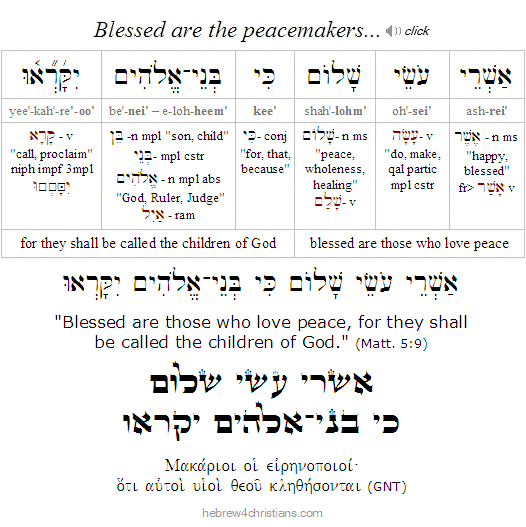 |
Acharit Hayamim:
Faith near the End of Days...
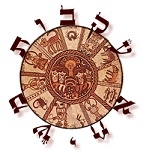
[ Any doubt that the USA (and the entire world) is being prepared for divine judgment can be removed by considering the various evils that have conspired to create the perfect storm of impending disaster for the nations. We are on the edge of the Great Tribulation... ]
07.27.22 (Tammuz 28, 5782) Shalom friends. Our Lord foretold that in the "end of days" there would be perilous times -- moral, political, ethnic, and spiritual chaos throughout the world, "as it was in the days of Noah." Of Noah's generation the Torah says: "The LORD saw that the wickedness of humanity was great in the earth, and that every intention of the thoughts of his heart was only evil continually, so that it grieved the LORD to his heart" (Gen. 6:5-6). Indeed, Paul's description of the character of people before the time of the end is chillingly accurate of our present generation (see 2 Tim. 3:1-7).
With the increasing rise of anarchy and godless tyranny throughout the nations, the Scriptures further foretell the rise of a governmental system that would oppress and subjugate the entire world, using surveillance systems and devices to control every aspect of life, so that no one would be able to buy or sell without being tagged as an compliant member of the system. Once a global (cashless) currency system has been established, the prophesied "man of sin" would then arise to embody the presence of Satan on the earth, in mimicry of the advent of the true Messiah.
At first this "man of sin" (איש החטא) will seem to be a man of peace but after his reign is secured, his malice will be revealed by openly persecuting those who still believe in the one true God, causing great tribulation, particularly for the Jewish people. The rise of this "Messiah of Evil" or the "anti-Christ" will be in accordance with the great vision of the prophet Daniel, wherein the final "week" of "seventy weeks of years" is fulfilled...
Presently we are living in the "gap" between the 69th week and the 70th week of years, but we see signs that the gap is now closing, and soon the world will enter into the "tribulation" period... As things get closer to the time of great judgment (יום יהוה), followers of Messiah will be forcefully removed by God's hand (i.e., raptured) either before the tribulation proper begins ("pre-trib"), or perhaps just before the Great Tribulation period ("mid-trib"), the later view being argued because followers of Yeshua will see the rise of the man of sin (2 Thess. 2:3-4). Either way, however, God has not appointed his followers to undergo the unleashing of his wrath upon the world system during the last half of the seventieth week (1 Thess. 5:9), so "post-trib is not a sound eschatological option. The rapture will occur as we are gathered together with the LORD to meet him in the air (1 Thess. 4:16-17).
The 70th week of the vision will begin when the "man of sin" appears to make a "covenant" with the people of the world, though he will later set up an "abomination" and force all world citizens to bow down to its image (perhaps similar to Nebuchadnezzar's insanity to force people to bow down before the golden image of himself; at this time the rapture of followers of Messiah may occur). Like Daniel's three friends who refused to bow down before the image, many will refuse to comply and outright worldwide persecution of the Jewish people will take place. This is called the "time of Jacob's trouble" and the "Great Tribulation." Satan will rule only "until the end that is decreed is poured out on him" and then the great Day of LORD will seal his doom with the second coming of Yeshua (as described in Rev. 19:11-21).
So, in light of this (very brief) sketch of what is coming -- and as the world system becomes more and more tyrannical as it prepares for the arrival of the "messiah of evil" -- how are you walking out your faith? Spiritual warfare is not "optional" for a follower of Yeshua. How are you keeping free of fear or anger? How are you preparing for the days ahead?
Remember that the evil one "lives" to devour souls, as it is written: "Be sober-minded; be watchful. Your adversary the devil prowls around like a roaring lion, seeking someone to devour" (1 Pet. 5:8). The apostle Paul lists the panoply of armor required for our struggle: "Put on the whole armor of God, that you may be able to stand against the schemes of the devil. For we do not wrestle against flesh and blood, but against the rulers, against the authorities, against the cosmic powers over this present darkness, against the spiritual forces of evil in the heavenly places. Therefore take up the whole armor of God, that you may be able to withstand in the evil day, and having done all, to stand firm. Stand therefore, having fastened on the belt of truth, and having put on the breastplate of righteousness, and, as shoes for your feet, having put on the readiness given by the gospel of peace. In all circumstances take up the shield of faith, with which you can extinguish all the flaming darts of the evil one; and take the helmet of salvation, and the sword of the Spirit, which is the word of God, praying at all times in the Spirit, with all prayer and supplication" (Eph. 6:11-18). In another place Paul refers to this as the "armor of light" (Rom. 13:12). James the Righteous (יעקב הצדיק) gives us remedy by saying: "Submit yourselves therefore to God. Resist the devil, and he will flee from you" (James 4:7).
We are to walk "in truthful speech, and the power of God; with the weapons of righteousness for the right hand and for the left" (2 Cor. 6:7). Let us wear the armor of light (ὰ ὅπλα τοῦ φωτός), being sober (i.e., νήφω, "calm and of sound mind") putting on the breastplate of faith and love; and for an helmet, the hope of salvation" (1 Thess. 5:8). "Therefore, preparing your minds for action, and being sober-minded, set your hope fully on the grace that will be brought to you at the revelation of Yeshua the Messiah" (1 Pet. 1:13).
Hebrew Lesson
Zephaniah 1:14 reading (click):
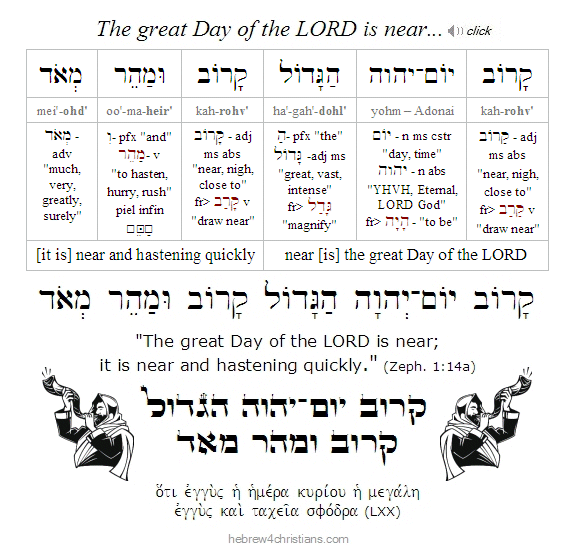 |
Learning to Die Daily...

07.26.22 (Tammuz 27, 5782) Many of us fear dying.... When we pray with all our heart, we ought pray as if it were our last breath... If we can learn to die well today - while we have the opportunity to reach out to the God in this temporal realm - we make passage from time to eternity, from darkness to light, and from exile to our promised land. Anger, bitterness, and regret burden our hearts with pain and fearful sorrow, but believing in forgiveness, being grateful for the people in our lives, and trusting that God's love is all we ever need gives us the courage to let go in hope. In this connection, I once read a wonderful passage from the late Henri Nouwen that I want to share with you here. I hope you will find it helpful, chaverim.
"If I die with much anger and bitterness, I will leave my family and friends behind in confusion, guilt, shame, or weakness. When I felt my death approaching, I suddenly realized how much I could influence the hearts of those whom I would leave behind. If I could truly say that I was grateful for what I had lived, eager to forgive and be forgiven, full of hope that those who loved me would continue their lives in joy and peace, and confident that Jesus who calls me would guide all who somehow had belonged to my life - if I could do that - I would, in the hour of my death, reveal more true spiritual freedom than I had been able to reveal during all the years of my life. I realized on a very deep level that dying is the most important act of living. It involves a choice to bind others with guilt or to set them free with gratitude." (Behind the Mirror)
Hebrew Lesson
Psalm 73:26 reading (click):
The Life is in His Blood...

07.26.22 (Tammuz 27, 5782) "The life is in the blood" that is given for atonement upon the altar (Lev. 17:11). When we say that the blood of Yeshua, the great Lamb of God, cleanses us from our sin, we refer not only to the blood that was poured out upon the cross, but also to the blood of his entire life that was "poured out" in his mission to rescue us from the curse of death (John 3:16). "The life is in the blood" therefore refers to the divine life manifested in the reality of Yeshua: from his miraculous conception as the "promised Seed" of Abraham, through the sacrifice of his life leading up to the cross, and beyond - to his resurrection and ascension. The blood of Yeshua represents the very life and Presence of God that is poured out in intercession on behalf of his people. As it is written in our Scriptures: "Therefore He is also able to save to the uttermost those who come to God through Him, since He always lives to make intercession for them" (Heb. 7:25).
Hebrew Lesson
Lev. 17:11c Hebrew reading (click):
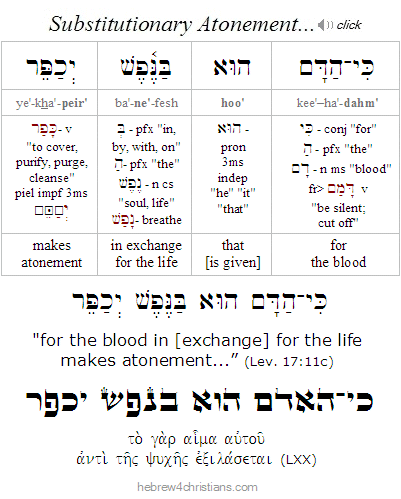 |
His Costly Grace...

07.26.22 (Tammuz 27, 5782) "Cheap grace is the preaching of forgiveness without requiring repentance" (Bonhoeffer: Cost of Discipleship). It's "cheap" because it is offered as salve for a guilty conscience, a "get out of hell free" card that makes no demand and costs you nothing to possess... "Cheap grace is the idea that 'grace' did it all for me so I do not need to change my lifestyle. The believer who accepts the idea of 'cheap grace' thinks he can continue to live like the rest of the world without batting an eye. Instead of following Christ in a radical way, the Christian lost in cheap grace thinks he can simply enjoy the consolations of his grace" (ibid). Because it denies the radical problem of our sin, however, "cheap grace" offers a correspondingly shallow solution to what brings the utmost anxiety and despair to the human heart. Indeed, those who disregard the seriousness of sin correspondingly disregard the significance of grace, for the two are interconnected, as Yeshua said: "To whom little is forgiven, the same loves little" (Luke 7:47).
There is a high cost for the grace of forgiveness, friends, first of all seen in the priceless sacrifice of Yeshua who died a harrowing and bloody death to make it "theologically possible" for us to be forgiven, and secondly, as seen in the wholesale demand to surrender our lives to God in response to his compassion toward us. Forgiveness is not just about our individual acts of sin - those various moral failures and perversities of heart we all have perpetrated - but is about our inner life and about who we ultimately are. Forgiveness is not accidental to our lives but is necessary and essential. We are not sinners because we sin, we sin because we are sinners. The root of our sinful condition is the lethal sickness called "spiritual death."
On the other hand, "costly grace" redeems and transforms the sinner. It is costly because it required all of God's heart, soul, mind and strength, and therefore it likewise requires all our heart, soul, mind, and strength in response... "Salvation is free (for you), but discipleship will cost you your life." We do not receive God's grace as license to coddle our lower nature but to enter into a new realm of existence as a child of God who desires righteousness to reign within our hearts. When Yeshua says to the trusting sinner, "Go and sin no more," he meant "Go in the reality of my love; go in the awareness of my grace; go in the assurance of my acceptance... and you will then sin no more." We best deny ourselves when we forget ourselves in the glory and beauty of our Lord....
Of course we can't do any of this in our own strength. We are saved from ourselves only by the miracle of God. "Not by might, nor by power, but by My Spirit," says the LORD of Hosts (Zech. 4:6). To those who "receive" him, God gives power (i.e., ἐξουσία, transcendent being) to become children of God. They are those "who are born not of blood, nor of the will of the flesh, nor of the will of man, but of God" (John 1:12-13). This is the miracle that comes by faith, for faith "receives" the promise and trusts in God's power to do the impossible for us.
Hebrew Lesson
Psalm 51:1 Hebrew reading (click):
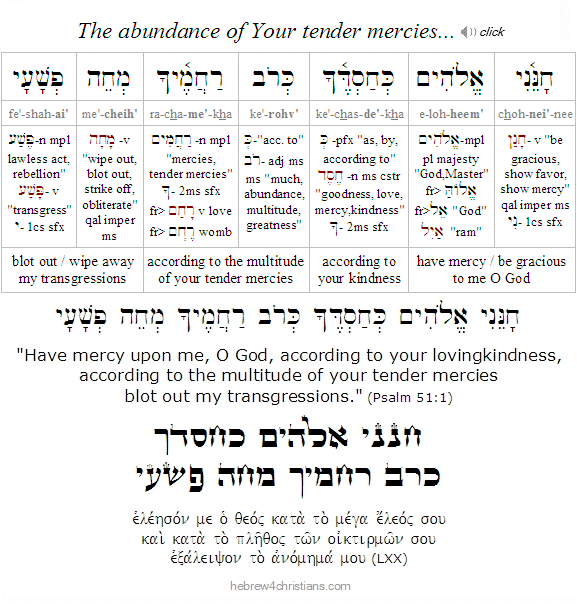 |
Humility and Surrender...

07.26.22 (Tammuz 27, 5782) Following Yeshua is a walk in humility, not a matter of showmanship.... "For by grace you have been saved through faith, and that not of yourselves; it is the gift of God, not of works, lest anyone should boast" (Eph. 2:8-9). The question is not how much are you going to accomplish, but are you in love with Yeshua? We attain humility by being so taken up with the Lord that we lose sight of ourselves, and the effect we have on others testifies of God's power working within us.
People naturally want "heroic" acts; they want to be seen as "spiritual" or "special," but it requires supernatural grace to go through drudgery, poverty, and suffering as a nobody. We sometimes think we should do exceptional things for God, but what is truly exceptional is to be surrendered to the Lord and at peace, despite the meanness and troubles of life...
Regarding those who seek the services of "miracle workers," the Kotzker Rebbe is reported to have said, "There are miracles and then there are miracles... Some people regard it as a miracle if God does someone's will; we regard as a miracle if someone does God's will." Amen, a true miracle, and one greater than the splitting of the sea, is that of a transformed heart that loves God and seeks to do God's will. Similarly, some people seek signs of the times and the End of the World, though the true "end of the world" arrives the moment you truly surrender your life to God's care.
Hebrew Lesson
Psalm 34:2 Hebrew reading (click):
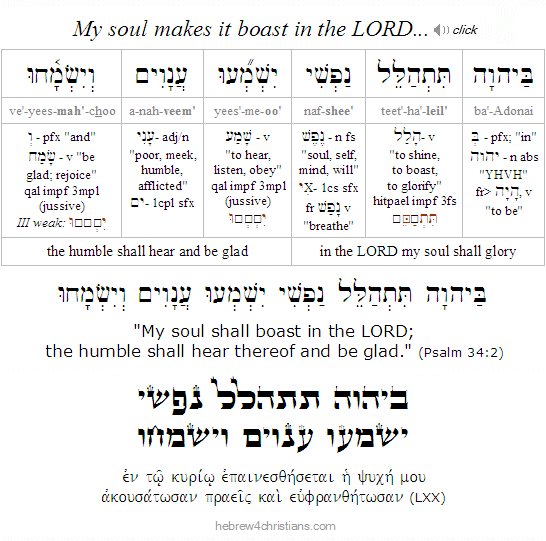 |
The Journey of journeys...
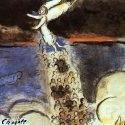
[ The following is related to our Torah portion for this week, parashat Masei... ]
07.25.22 (Tammuz 26, 5782) From our Torah portion this week (i.e., Masei) we read: "These are the journeys of the people of Israel (מַסְעֵי בְנֵי־יִשְׂרָאֵל) who went out of the land of Egypt..." (Num. 33:1). The sages ask why the word "journeys" (plural) was used here, since only the first journey from Rameses to Sukkot literally marked "yetziat mitzrayim," the going out of Egypt and all the other journeys were outside of Egypt, in desert regions. They answer that the journey out of Egypt goes beyond the physical land into the spiritual - an exodus from captivity to the world into the realm of the spirit. As has been said, it took the LORD 40 days to get Israel out of Egypt, but it took 40 years to get Egypt out of Israel... The "journey out of Egypt" is therefore a journey of smaller journeys that leads to the full consciousness of deliverance.
Along the way we are repeatedly tested. The "desert experience" reveals what is hidden in our hearts... The murmuring and rebellion of the Israelites in the desert is our own, and our challenge is to find healing from our fears. Anger, doubt, boredom, cravings, and outright rebellion are symptoms of a deeper problem, and to change we must first confess our inner poverty, neediness, and emptiness (James 5:16). When we stop making excuses we can learn to trust in God's provision for our lives; we will taste of the heavenly manna and be satisfied; we will be delivered from our fears by be filled with God's love. The impulses that sought to lead us away from God will no longer be able to pretend to be the truth, since God's peace and love will direct the heart. We will begin to take hold of the promise...
Be encouraged my fellow sojourners walking by faith through the desert of this present world. The Torah uses a repetitious expression, "Sanctify yourselves and you shall be holy" (הִתְקַדִּשְׁתֶּם וִהְיִיתֶם קְדשִׁים) (Lev. 11:44) because when we make an effort -- no matter how feeble at times -- to draw near to the LORD, He will draw near to us... Indeed the walk of faith is one of ascent and descent and ascent again: It's often "two steps forward, one step back..." It is a long road, a process, as we learn to obey and seek to grow closer to God. Authentic repentance doesn't imply that we will never sin or make any mistakes, of course, but rather means that the oscillating pattern of "up, then down, then up" is the basic way we walk. Our direction has changed for good; we have turned to God for life and hope. We now understand our sins in light of a greater love that bears them for us even as we draw ever closer to the One who calls us home...
Hebrew Lesson:
Zechariah 1:3 Hebrew reading (click):
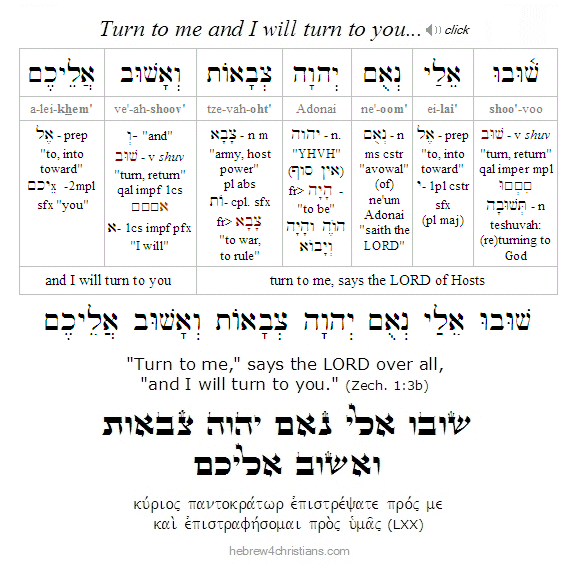 |
The Sanctity of your Heart...

[ The following entry concerns this week's Torah reading, parashat Mattot-Masei... ]
07.25.22 (Tammuz 26, 5782) From our Torah portion this week we read: "Speak to the children of Israel, and say unto them, 'When ye are passed over into the land of promise
drive away all the inhabitants of the land before you; destroy all their carved images, all their molten images, and demolish their high places'" (Num. 33:51-52). The Hebrew term for idolatry is "avodah zarah" (עֲבוֹדָה זַרָה), which literally means strange or "foreign" worship... The worship of anything other than the true God, whether it is pleasure, money, fame, control, security, self-improvement, health, religion, etc., is regarded as foreign, since it alienates us from the truth of reality. We were created to be in relationship with God but we lose sight of this truth whenever elevate what is finite to the status of the infinite. Indeed idolatry is the substitution of what is not-god (לא־אֵל) for the sacred, absolutizing the present and worshiping the temporal. Since our greatest good is found in the eternal verities of the divine communion, the Lord cannot give us an absolute good apart from Him, since there literally is no such thing. "No one can serve two masters," Yeshua said, and "a divided house cannot stand." For our own good, then, God necessarily is the Ultimate Concern of our life, and he wants to spare us the pain, disappointment, and trauma of being double-minded, disintegrated, and full of inner conflict. Spiritual warfare therefore means taking every thought captive before the bar of God's truth, rooting out and destroying all our inner idols so that we can be delivered from the anguish of uncertainty and ambivalence.
What is at stake here is your inner life, or rather the threat of the disintegration of your deepest essence into a fragmented multiplicity without center... The soul must be grounded in Reality or it is lost, dissipated in existential dread and despair. Yeshua said that when your eye is "single" (ἁπλοῦς), your whole being will be full of light (Matt. 6:22), which means that being single-minded and wholehearted unifies and heals the soul.... Being pulled in opposite directions is both painful and debilitating, for there is no overarching reason to direct the will in its decisions. Hating and loving the good is the ambivalence of despair. Being both willing and unwilling weakens the soul, but seeking the good and making God your ultimate concern binds up the broken heart and centers the will. "Your faith has made you whole..."
"Keep your heart with all vigilance, for from it flow the springs of life" (Prov. 4:23). The heart, that is, the willing and desiring center of the self, is to be proactively guarded, and for this sacred task God offers us heavenly comfort and resolve. Courage does not chase away or deny fear and despair, but instead gives us determination to persevere despite these feelings. "Why are you cast down, O my soul, and why are you in turmoil within me? Hope thou in God" (Psalm 42:11). Courage expresses hope in the midst of the struggle; it finds strength to confront pain, danger, or grief with God's help. Courage is grounded in the decision to trust that God is with us, despite our circumstances or feelings of abandonment. How you choose to guard your heart from the corruption and hardness of the world will determine the "road" of your life. If you do not care to keep your heart open and soft, you will become cynical, weary, and more and more selfish. Your way will be lonely, suspicious, and dangerous. If, however, you keep yourself from the hardness of unbelief, you will experience compassion, encouragement, and the joy of loving others.
Hebrew Lesson:
Proverbs 4:23 Hebrew reading (click)
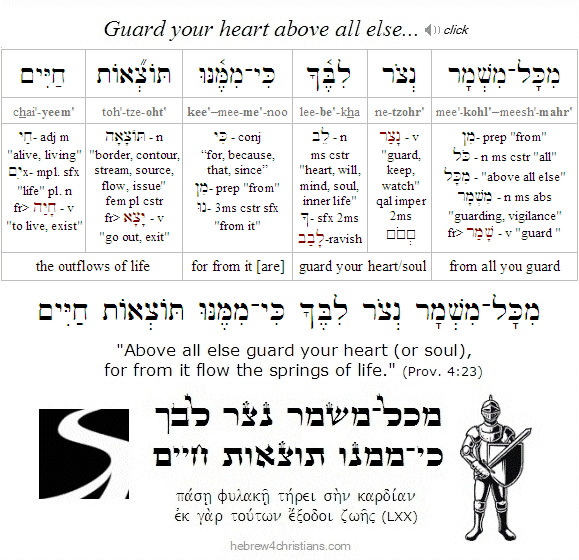 |
This Week's Torah:
Parashat Mattot-Masei...
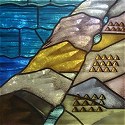
07.24.22 (Tammuz 25, 5782) Shavuah Tov, chaverim! This week we read a "double portion" of Torah that will conclude Sefer Bamidbar, or "the Book of Numbers." Our first Torah portion, called parashat Mattot (מַטּוֹת, "tribes"), begins with the LORD giving laws and prohibitions regarding the making of vows (nedarim). After this, the Israelites were commanded to wage war against the Midianites for seducing the people to sin at the incident of "Baal Peor." During the ensuing battle, the wicked sorcerer Balaam was killed, as well as five tribal kings of the land of Midian. The tribes of Reuben and Gad (and half of the tribe of Manasseh) then asked permission to settle in the pasture land of Gilead (on the east of the Jordan), since they had large herds of cattle. At first Moses hotly disapproved of their request, since he feared that the other tribes would lose heart if these tribes stayed behind during the conquest of Canaan. However, when the tribal leaders made a vow to join the fight while their families remained in Gilead, Moses finally agreed.
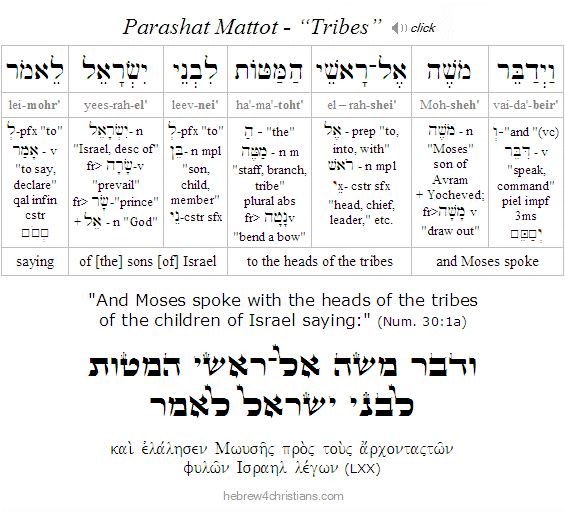 |
In our second Torah portion, called parashat Masei (מַסְעֵי, "journeys"), Moses recounted the various "stations" of the journey, and instructed that when the people crossed the Jordan into the land of Canaan, they were to drive out all the inhabitants and to utterly destroy all traces of their culture and religion. After this, the land would be divided by lot according to tribes of Israel, based on the size of each tribe. God then warned Moses that if the Israelites would not drive out the inhabitants of the land, they would become a "snare" to them, and God would then judge and exile the Israelites as he intended to do to the Canaanites.
The Israelites were then instructed to assign towns with surrounding pasture lands to the Levites. There were to be a total of 42 towns, chosen by lot and distributed throughout the land according to the size of each tribe. In addition, six more cities were to be given to the Levites and designated as "cities of refuge" to which a person who unintentionally killed another may flee to take refuge from an "avenger of blood" (i.e., next of kin). The death penalty required testimony from at least two witnesses and admitted of no "ransom" (plea bargain) to be offered in place of the murderer's execution. On the other hand, a person responsible for involuntary manslaughter of another was required to dwell within the confines of a city of refuge until the death of the High Priest, after which time he was free to return to his home without fear of retribution from an avenger of blood.
The Book of Numbers and the historical narrative of the Torah itself concludes with the resolution of the question of legal inheritance in the land just before Joshua would lead the people into the land of Canaan. The book ends with this statement: "These are the commandments and the rules that the LORD commanded through Moses to the people of Israel in the plains of Moab by the Jordan at Jericho."
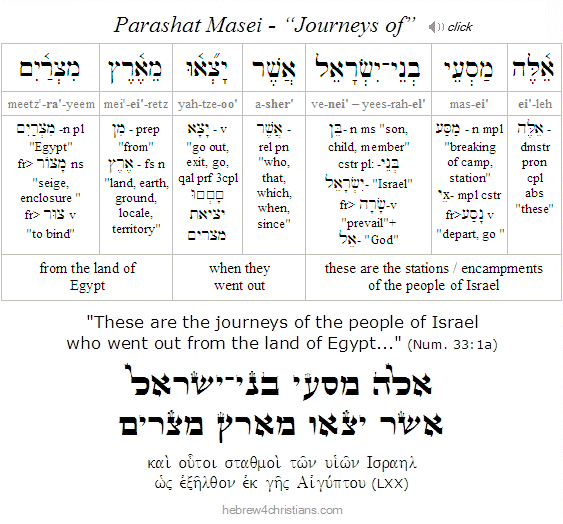 |
Resources:
Awakening to Life...
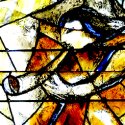
07.22.22 (Tammuz 23, 5782) We shouldn't be surprised that so many people refuse to wake up and realize the profound spiritual danger of their lives namely, the imminent reality of personal judgment and death since the Scriptures declare that people willingly suppress the truth and "celebrate" untruth (see Rom. 1:20-32). Soren Kierkegaard commented: "The world wants to be deceived... intensely, more intensely, more passionately perhaps than any witness to the truth has fought for the truth, the world fights to be deceived; it most gratefully rewards with applause, money, and prestige anyone who complies with its wish to be deceived" (Judge for Yourself). Indeed, any distraction that seduces people to deny reality will suffice for the sake of untruth... The Scriptures state: "And this is the judgment: the light has come into the world, and people loved the darkness rather than the light because their works were evil. For everyone who does wicked things hates the light and does not come to the light, lest his works should be exposed. But whoever does what is true comes to the light, so that it may be seen that his works have been done in the power of God" (John 3:19-21).
"While there is nothing terrifying whatever and no terror whatever, there is nothing that builds up either, no upbuilding whatever. There is forgiveness of sin - that is upbuilding. The terrifying is that there is sin, and the magnitude of the terror in the inwardness of guilt-consciousness is proportionate to the dimension of the upbuilding. There is healing for all pain, victory in all strife, rescue in all danger - that is upbuilding. The terrifying is that there is pain, strife, danger; and the magnitude of the terrifying and the terror is proportionate to what builds up and to the upbuilding." - Soren Kierkegaard, Christian Discourses, 1848.
It is vital to remember that one of the main tactics of the enemy of our souls is to cast a spell over us induce a sense of forgetfulness and apathy... The satan wants you to forget that you are a child of the King. The entire venture of teshuvah (repentance) presupposes that you are created be'tzelem Elohim - in the image of God - and therefore you have infinite value and dignity. This is all the more evident in light of the awesome ransom that Yeshua paid to reconcile you to God. Understand: the judgment is great because the love is so great...
So what is one of the greatest of sins you can commit in your life? To forget what God has done for you... Remaining asleep, unmindful of your true identity is one of the most tragic things of life. Therefore the blast of the shofar is meant to jolt us from our sleep... We are to remember who we really are -- to remember that God is our King. The person who says, "Tomorrow I will do teshuvah" really is saying, "Not now." And then tomorrow comes and he says, "Not now." And in this way his entire life passes by, saying, "Not now." Finally one day he wakes up only to find himself already dead.
May God help us wake up to the Reality that is set before us. The "End of the World" is the moment you will die and give account of how you lived before the Truth of Eternity -- and there will be no more rationalizations, no more evasions, no excuses, no pretense of being a victim, that will bear on the question before the bar of heaven....
Hebrew Lesson
Deut. 30:19b Hebrew reading (click):
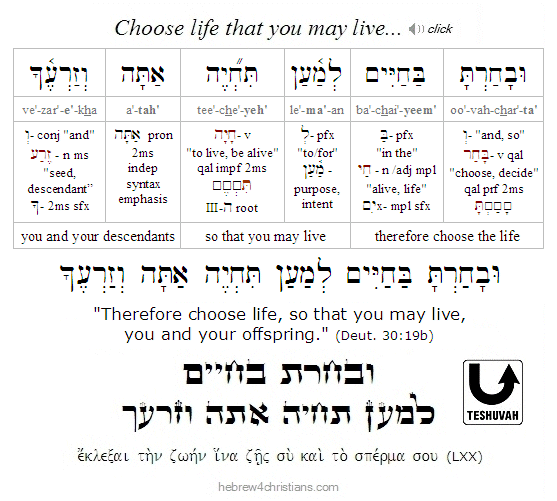 |
Words of Guidance...
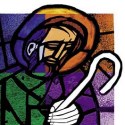
07.22.22 (Tammuz 23, 5782) The great commandment is always Shema - listen - and heed God's Voice: "And your ears shall hear a word behind you, saying, "This is the way, walk in it" (Isa. 30:21). At any given moment of our day, then, we can attune ourselves to hear the "upward call" and come "boldly before the Throne of Grace" (Heb. 4:16). The world knows nothing of this realm and is enslaved by appearances and the delusions of olam ha'sheker (עולם השקר). As Yeshua said, "To you it has been given to know the mysteries of the kingdom of heaven, but to them it has not been given" (Matt. 13:11). The Spirit always says, "Come, my people, enter your chambers, and shut your doors behind you" (Isa. 26:20). The LORD beckons: "Call to me and I will answer you, and will tell you great and hidden things that you have not known" (Jer. 33:3). And I looked, and behold, a door standing open in heaven. And the first voice, which I had heard speaking to me like a trumpet, said, "Come up here, and I will show you what must take place...." (Rev 4:1).
Hebrew Lesson:
Isaiah 30:21a reading (click):
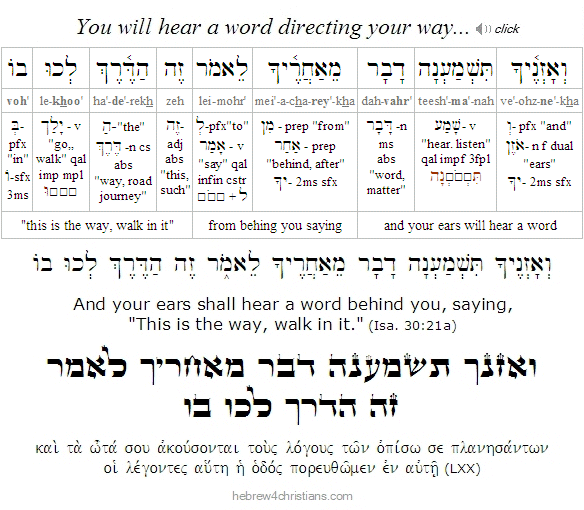 |
Olam Katan - Small World...

07.22.22 (Tammuz 23, 5782) It is written in our Torah portion for this week (i.e., Pinchas), "My offering, my food for my food offerings, my pleasing aroma, you shall be careful to offer to me at its appointed time" (Num. 28:2). Wait. Food for God? What need has the LORD for food? But by this is meant "as you have done it to least of these my brethren, you have done it unto Me" (Matt. 25:40). The offerings you make to tzedakah (giving charity, your time, your kindness, etc.) constitute food presented before the secret place of God's altar...
God created Adam alone, as a solitary being, made in the divine image, to teach us that to destroy a single life is to destroy an entire world, and to sustain a single life is to sustain an entire world. Therefore everyone should say: 'For my sake the world was created' (Talmud). Each of us is olam katan (עולם קטן), a small world that represents the large world. Indeed, one righteous human being can sustain the entire world, as it is written (Prov. 10:25), "the righteous is the foundation of the world" (וְצַדִּיק יְסוֹד עוֹלָם).
On the other hand, balance is of course required here. Each of us is olam katan, a small world, though, as Rabbi Noah of Lekhivitz once wisely said, "if we are small in our own eyes, we are indeed 'a world,' but if we are a 'world' in our own eyes, we are thereby made small." This thought obviously echoes Yeshua's teaching: "Whoever exalts himself will be humbled, and whoever humbles himself will be exalted" (Matt. 23:12).
Hebrew Lesson:
Proverbs 29:23 reading (click):
There are assumptions we bring to the reading of Torah that affect how we read and what we will hear... The sages generally agreed that the greatest principle of Torah is to love your neighbor as yourself (Lev. 19:18), though Ben Azzai further said that even greater is the principle that God created man in His likeness (i.e., bid'mut Elohim, בִּדְמוּת אֱלֹהִים, in "outline" or "silhouette," the word demut [דְּמוּת] is a synonym of tzelem [צֶלֶם], a "shadow" or semblance) since then one cannot say, 'Since I despise myself I can despise another as well; since I curse myself, let the other be accursed as well.' Being made in God's likeness means how we regard ourselves will be the measure we regard even God Himself (1 John 4:20). Therefore the first commandment is always, "I am the LORD thy God..." (Exod. 20:2), since apart from faith, there is no Torah of any kind.
Perfected Strength...

07.22.22 (Tammuz 23, 5782) "Have you not known? Have you not heard? The Eternal One, the LORD, is the Creator of the ends of the earth (בּוֹרֵא קְצוֹת הָאָרֶץ). He does not faint nor grow weary; his understanding is unsearchable. He gives power to the faint, and to him who has no might he increases strength" (Isa. 40:28-29).
Human pride has no objection that God can impart strength, but it objects that strength is found in those who are broken and weary that is, to those mortally wounded in the battle against evil. The principle of the self-life, the ego, religious observance, "doing the law," etc., is a spiritual dead-end. The word is this: God gives strength to the weary, to the faint, to those who are without potency or power. But this means that we first must be emptied, broken, and stripped of our self-sufficiency before the strength of God is manifest in us: "My power is made perfect (τελειοῦται) in weakness" (2 Cor. 12:9). God's way is first to break us, to make us weaker and weaker, so that he can then fill us with the miraculous divine nature.
Like all sacrifices brought to the altar, we must pass through death to life by means of our union with the Messiah at the cross... It is only after the cross that it may be truly said, "It is no longer 'I' who lives; now it is Messiah who lives His life in me" (Gal. 2:20). There is indeed strength, power, and victory but such comes after the cross, after we reckon carnal energy as useless. "Not by might, nor by power, but by My Spirit, says Adonai Tzeva'ot" (Zech. 4:6).
Hebrew Lesson:
Isaiah 40:29 reading (click):
Where we read, "Messiah who loved me and gave himself for me" (Gal. 2:20), we emphasize the object of God's redeeming love; we stress that this word is being spoken to "me," and that Messiah's love is poured out "for me." But how can we justify doing so, in light of the innumerable souls that have been brought forth in the world? The Mishnah asks, "Why was man created alone?" and answers so that each person must say the world was created for me. "Whoever destroys a soul, it is considered as if he destroyed an entire world; and whoever saves a soul, it is considered as if he saved an entire world..." Amen.
Daily Dvar Podcast:
You are Called by name ...

07.22.22 (Tammuz 23, 5782) In today's "Daily Dvar" broadcast (see link below) I hope to encourage you to live without fear because of the great love and grace the Lord has for you. The Lord has personally redeemed you, friend; he calls you by name, and you belong to him. Indeed the Lord loves you "b'ahavat olam" - with everlasting love - and therefore he draws you close to him (Jer. 31:3). Shalom chaverim.
Feeding God's Heart...

[ The following entry concerns this week's Torah reading, parashat Pinchas... ]
07.22.22 (Tammuz 23, 5782) As I've discussed elsewhere on the site over the years, the climax of the revelation at Sinai was not the giving of the Ten Commandments (עשרת הדיברות) to Israel but was instead the vision of the Altar of the sanctuary (מזבח המשכן). However -- as our Torah portion this week makes clear -- the central sacrifice upon this altar was the daily sacrifice (i.e., korban tamid: קרבן תמיד) of a defect-free male lamb with unleavened bread and wine. The LORD calls this "my offering" (קרבני) and "my bread" (לחמי) [Num. 28:1-8]. In other words, the service and ministry of the Mishkan (i.e., Tabernacle) constantly foretold the coming of the great Lamb of God (שה האלהים) who would be offered upon the altar of the cross to secure our eternal redemption (John 1:29; Heb. 9:11-12).
The sacrifice of the lamb represents "God's food," a pleasing aroma (ריח ניחחי), for it most satisfied the hunger of God's heart (Eph. 5:2). Indeed, Yeshua's offering upon the cross represents God's hunger for our atonement, our healing from the sickness of death, since it restored what was lost to Him through sin, namely, communion with his children. God could never be satisfied until He was able to let truth and love meet (Psalm 85:10).
Sometimes we say that we "hunger for God," but it is vital to remember that it is God who first hungers for us. God desires our love and fellowship. He comes to seek fruit among the trees - but does He find any? He walks in the cool of the day, calling out to us, but are we attuned to hear His voice? Do we accept the invitation to be in His Presence? When God "knocks on the door of your heart" to commune with you, what "food" will you be serving? (Rev. 3:20). Every day we are given an opportunity to "feed God" through expressing faith, hope, and love. Ultimately it is our obedience to the truth is what "feeds" Him: "Behold, to obey is better than sacrifice, and to hearken than the fat of rams" (1 Sam. 15:22).
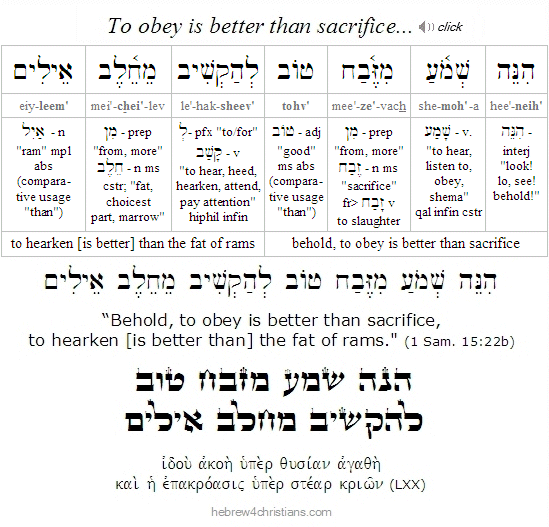 |
We "feed God" by offering heartfelt prayer, by walking in faith, by yearning for Him, by studying Scripture, by participating in corporate worship, by giving tzedakah, by performing acts of kindness (gemilut chasadim) for others, and so on (Heb. 13:15-16). Expressing our love for God is the deepest meaning of teshuvah, which is an "answer" or response to His great love for us (1 John 4:19). Just as God feeds and sustains us through His love, so we "feed Him" by our yearning, our prayers, our praise, and our worship...
For more on this subject, see "The Hunger of God's Heart."
Torah of Empathy...

07.21.22 (Tammuz 22, 5782) There is an old Chassidic story of two men sitting and enjoying a drink together. One of them then says to the other, "You know Ivan, you're my best friend. I really love you, brother!" The other man responds, "Oh yeah? If you really love me, so tell me where I hurt..."
The point of this simple story is that we can't really say we love someone without taking the time to know them -- and that means knowing how they suffer. Most of us are afflicted, of course, but are we able to transcend our own pain to genuinely empathize with others? Conversely, how many people do we trust enough to to confide our own pains and heartaches? The Law of Messiah (תוֹרת המשׁיח) is to bear one another's burdens (τα βαρη, "weights," Gal. 6:2), and that means making ourselves vulnerable -- and making room inside our hearts for the vulnerability of others. James the Righteous tells us that personal healing comes from confessing outwardly (εξομολογεισθε) our sins (τας αμαρτιας) to one another so that we may be healed (James 5:16). Of course it is humbling to acknowledge our sins, our failures, and our hurts to another person, but without an audience for the inner voice of our pain, we suffer all the more...
If someone loves us, they will know "where we hurt"; and if we love them, we will know where they hurt, too. This same principle can also be applied to our relationship to Yeshua... We take comfort that Yeshua sticks closer to us than a brother, praying for us and "knowing where we hurt." But if we say that we love him, are we are not claiming that we know "where he hurts?" Does Yeshua suffer today? The Apostle Paul wrote: "Now I rejoice in my sufferings for your sake, and in my flesh I am filling up what is lacking in Christ's afflictions for the sake of his body, that is, the church" (Col. 1:24). What is "lacking in Messiah's afflictions" is our present sacrifice for the sake of others... Yeshua hungers with those who are hungry, thirsts with those who are thirsty, feels loneliness with those who are abandoned, shivers with those who are cold, weeps with those who are forlorn, is imprisoned with those who are incarcerated, is sick with those who are ill, and so on (Matt. 25:31-ff). Yeshua feels the pain of even the "least of these my brothers." This is where he hurts, chaverim, and he calls to us to extend his compassion to others.
The essential difference between the righteous and the unrighteous is revealed in their response shown to those in need. After all, on the Day of Judgment, both the righteous and the unrighteous will account for their choices in light of the selfsame needy and pain-riddled world. The destiny of each person will be determined by whether he or she took the time to genuinely engage the suffering of others. May the LORD help us to share His heart and passion for a lost and hurting world. Amen.
Hebrew Lesson:
Psalm 116:1-2 reading (click):
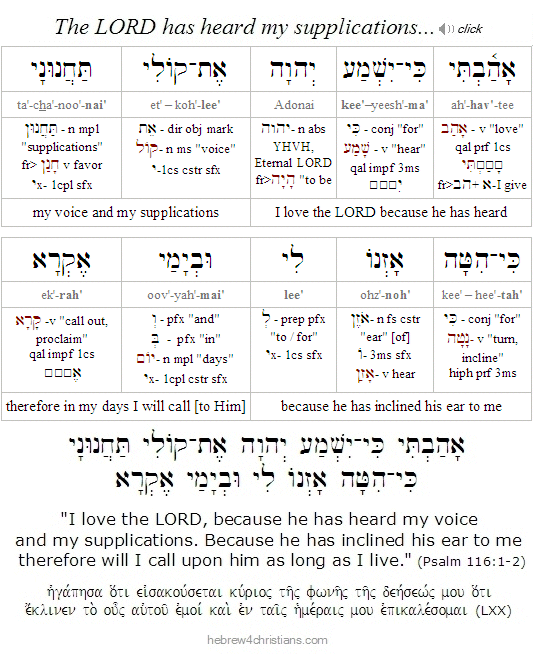 |
God's Providential Care...
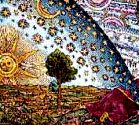
07.21.22 (Tammuz 22, 5782) Since our Scriptures affirm that "all things work together for good" (Rom. 8:28), we must trust God for both perceived evil as well as perceived good, since all circumstances of life come from the hand of the LORD our God (see Job 2:10). Despite appearances that sometimes seem to the contrary, we believe that the all-powerful, supreme LORD has not abandoned the world but actively sustains and upholds it with benevolent intent (Heb. 1:3). "We walk by faith and not by sight" (2 Cor. 5:7). When bad things happen to the righteous, we trust in God's personal care for their ultimate good, despite their present troubles. As the prophet Job said: "Though he slay me, I will trust in Him" (Job 13:15). This is the heart behind the Kaddish, the mourner's prayer, that expresses acceptance of God's world, despite the pain, sorrow, loss, and so on.
The term hashgachah pratit (השׁגחה פרטית) refers to God's personal supervision of our lives (hashgachah means "supervision," and pratit means "individual" or "particular"). Since He is the Master of the Universe, God's supervision reaches to the smallest of details of creation - from subatomic particles to the great motions of the cosmos. God not only calls each star by its own name (Psalm 147:4), but knows each particular lily and sparrow (Matt. 6:28-30, 10:29). Each person created in the likeness of God is therefore under the direct, personal supervision of God Himself -- whether that soul is conscious of that fact or not. As Yeshua said, even the hairs on your head are all numbered (Matt. 10:30). Indeed, the God of Israel is called אלהי הרוּחת לכל־בּשׂר / Elohei ha-ruchot lekhol-basar: "The God of the spirits of all flesh" (Num. 16:22), and that means He is LORD even over those who vainly attempt to suppress His Presence and reality. "Can a man hide himself in secret places so that I cannot see him? declares the LORD. Do I not fill heaven and earth?" (Jer. 23:24).
The Talmud says that when Moses asked God, "Please show me your glory" (Exod. 33:18), he was asking for God's vindication in the light of the gnawing question: "Why do the righteous suffer while the wicked prosper?" Moses was not given an explicit answer, and some of the sages said he wrote the enigmatic Book of Job to demonstrate that the question can only be reduced to God's inscrutable will: "Where were you when I laid the earth's foundation?" (Job 38:4). In other words, the question can only be answered by the One who knows the beginning from the end, the Infinite One who sees the implications and concatenation of all things. As finite beings, we see only a fraction of the big picture, and therefore we must yield our trust to the Wisdom and Power of Almighty God (Deut. 32:4).
It is written, "Your eyes saw me when I was inside the womb; in your scroll everything was written, my days were ordained before they came into existence" (Psalm 139:16). In light of God's providential ordering of our lives, Blaise Pascal asked, "What is left for us but to unite our will to that of God himself, to will in him, with him, and for him the thing that he has eternally willed in us and for us." The Mishnah says it this way: "Do His will as if it was your will that He may do your will as if it was His will" (Avot 2:4). In other words, what else can we do but learn to trust, accept, and to say "yes" to life -- even if at times we may feel like orphans, lost in a fatherless world... All our days are recorded in God's scroll.
Hebrew Lesson:
Psalm 139:16b reading (click):
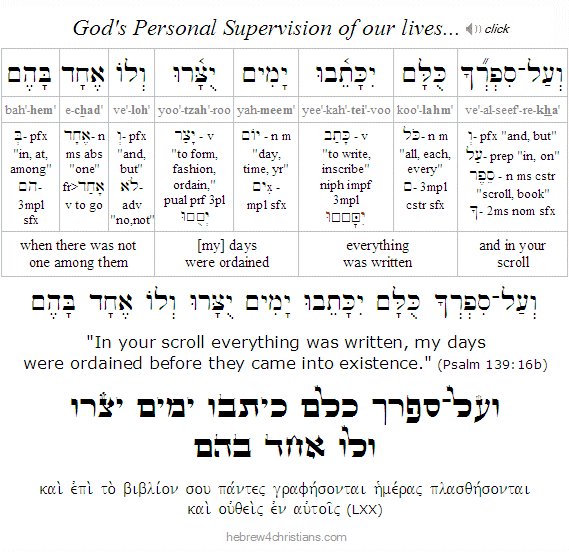 |
Accepting His Crucified Life...

07.21.22 (Tammuz 22, 5782) Some people seem to think that to be "crucified with Messiah" means that we must totally surrender our lives to God by denying ourselves and mortifying every passion apart from the Spirit of Messiah living within us (Gal. 2:20). However, if we could do this - if we really could crucify ourselves, deny ourselves, and completely yield our hearts to God in absolute surrender, we wouldn't need the miracle of salvation, would we? We'd be back at the religious game, attempting to please God through our own "best efforts," and endeavoring to affect spirituality by means of our own merit. On the contrary, Yeshua said that no one is able to come (οὐδεὶς δύναται ἐλθεῖν) to him for life unless God Himself "drags him" (John 6:44). The flesh is scandalized by this, of course, since the ego plays no part. Eternal life is found in the righteousness of Yeshua, and self-denial means to quit thinking about yourself (from α-, "not," + ῥέω, "to speak") by accepting what he has done for you. We have been (already) crucified with Messiah (the verb συνεσταύρωμαι is a perfect passive form), and just as we are identified with him in his death, so we are identified with him in his resurrected life. This is a matter of faith, trusting that God's love for your soul overcomes the law's powerlessness and your own inability to save yourself...
The first duty of the heart is to believe in the miracle of God's love for your soul. Surrender of the heart is deeper than outward obedience, since it is possible to obey God for the wrong reasons. Our motivation must be grounded in God's love first of all (1 John 4:19). This is what it means to "die to yourself" or to be "crucified" with Messiah: you let go; you relinquish control; you trust God to accept you, sustain you, and bless you -- even in your weakest and worst moments. That is the nature of trusting in God's love for you.
Hebrew Lesson
Proverbs 3:5 reading (click):
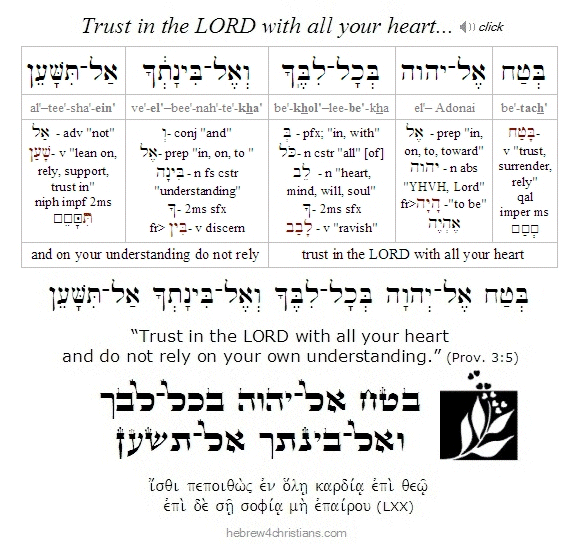 |
The moral law of God is a perfect mirror, revealing the truth about our inward condition. The reality of our sin leads to brokenness and the confession of our need for God's power to change our hearts. But we can only get to that place by means of the cross: We first die to all hope in ourselves and our religious aspirations, and then God does the miracle. The cross demonstrates that any attempt of the flesh to please God (i.e., "religion") is useless and needs to be laid to rest. True obedience, then, means surrendering to the LORD who heals your heart (forgives your sin) and sets you free to know Him. This is the "end of the law," after all - to walk as God's free child who pleases Him out of a relationship of love, trust, and blessing. We can obey God, in other words, only if we first surrender our hearts to his love.
All who surrender obey, but not all who obey surrender... While we are not saved by obeying rules of conduct but solely by trusting in God's love (Eph. 2:9; 2 Tim. 1:9, Titus 3:5, Rom. 11:6, etc.), we will find ourselves willing to obey God from the heart only if we are really convinced that he loves and accepts us, despite our sins... The love of God is not without discipline, structure, and order, after all. Love is polite; it listens; it seeks to serve and worship with reverence and gratitude. So, after unconditionally surrendering our hearts to God, we will desire to do his will, that is, we will want to know and to do his Torah (Psalm 1:2), and the Holy Spirit will therefore lead us to a place of order, faithfulness, and peace - not to disorder and confusion (1 Cor. 14:33,40). There are disciplines to the life of faith that are instilled within our hearts to help us "work out" the inner transformation of God's love into our daily lives. And that is part of the rationale for liturgy, ritual, observing the moedim (biblical holidays), reading the weekly Torah portions, giving tzedakah, performing acts of chesed, and so on. Ideally such things are meant to provide "form" to the inner content of the heart. May the LORD our God teach us the path of his peace....
Hebrew Lesson
Psalm 25:4 reading (click):
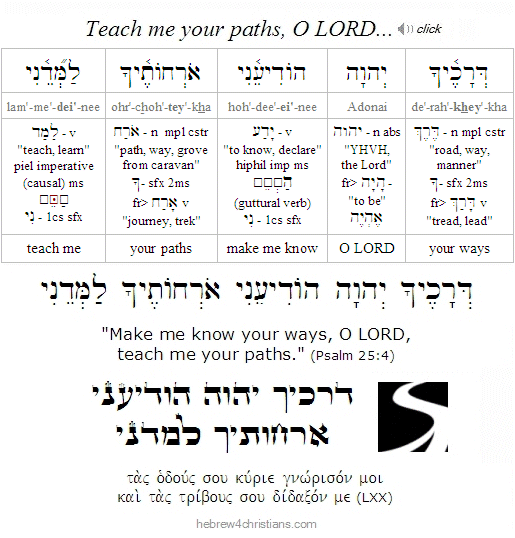 |
The Breath of Life...
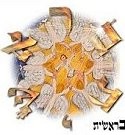
07.20.22 (Tammuz 21, 5782) A verse from this week's Torah (i.e., parashat Pinchas) reveals yet another great Name of God: Elohei ha'ruchot le'khol basar (אלהי הרוחת לכל־בשׂר), which can be translated "the God of the breath of all flesh" (Num. 27:16). This Name reveals that the LORD is the Source of your breath, the One who exhales to you nishmat ha'chayim (נשימת החיים), the "breath of life" that enables you to live (Job 12:10). The sages use the analogy of a glassblower who creates a glass vessel. Just as the glassblower blows into a tube to form a vessel from molten glass, so the "breath" (i.e., neshamah: נְשָׁמָה) that comes from the LORD functions as spirit (i.e., ruach: רוּחַ) that forms and fills the human soul (i.e., nefesh: נֶפֶשׁ). Note especially that the Name YHVH (יהוה), the LORD, first appears in this connection (Gen. 2:7), a designation that also means "God is Present" (Exod. 3:14) and "God is Mercy" (Exod. 34:6-7). Note also that each letter of the Name YHVH represents a vowel sound (i.e., breath), suggesting that God's Spirit is as close as your very next breath. Like the wind that cannot be seen, so is the spirit the essential part of your identity. Truly in God we "live and move and have our being" (Acts 17:28).
Hebrew Lesson:
Num. 27:16 reading (click):
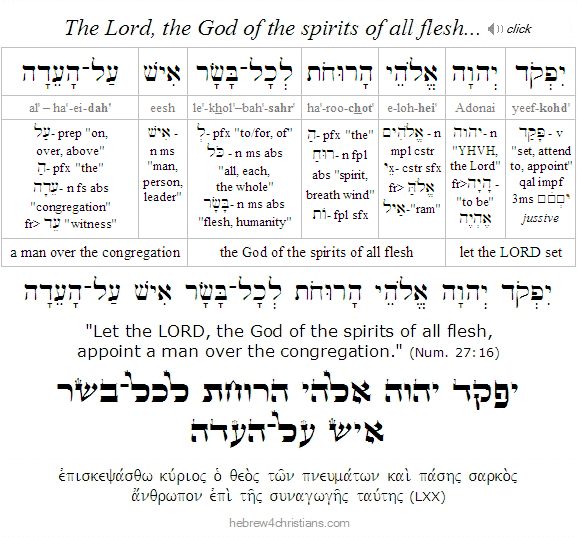 |
True and False Zeal...
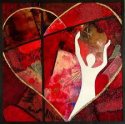
[ The following entry concerns our Torah reading for this week, parashat Pinchas... ]
07.20.22 (Tammuz 21, 5782) You may be entirely sincere in your convictions, but you may be sincerely wrong... In the time of the Second Temple, for instance, the Zealots despised the rule of Rome. Their political hatred caused them to blindly regard anyone who didn't share their passion as a personal enemy. In one of the great tragedies of Jewish history, these Jewish zealots actually killed more Jews than did the Romans themselves! And how many Christians these days "kill" relationships with other believers because of their particular zeal regarding some doctrinal question? I am not suggesting that doctrine is unimportant, of course, but before you pick up that sword to do the business of Pinchas, you might do well to consider your heart's attitude...
"In this respect fundamentalism has demonic traits. It destroys the humble honesty of the search for truth, it splits the conscience of its thoughtful adherents, and it makes them fanatical because they are forced to suppress elements of truth of which they are dimly aware." - Paul Tillich
We need to be careful with our passions. There is a "false zeal" that leads to estrangement and confusion. Withholding love from others is ultimately grounded in an appeal to God as the administrator of Justice. It is an appeal to God as Elohim (אֱלהִים), not as YHVH (יהוה), the Compassionate Source of Life. If we insist on our rights, we appeal to principles of justice, i.e., to God as the Lawgiver. But if we intend to have God be the Judge of others, we must appeal to Him to be our own Judge as well. If we have an unforgiving spirit toward others, we will not receive our own forgiveness (Matt. 6:15); if we are judgmental toward them, we ourselves will be put on trial; if we are cruel and ungiving toward them, we will experience life as hellish, miserable and mean. This reciprocal principle of Kingdom life appears throughout Yeshua's teaching. According to your faith, be it done unto you (Matt. 9:29).
Hebrew Lesson:
Psalm 18:26 reading (click):
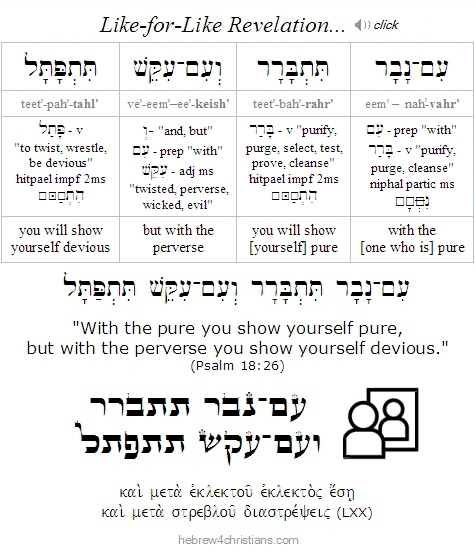 |
Note: For more on this important topic, see "Parashat Pinchas: God's Greater Zeal."
Losing and Finding yourself...

07.20.22 (Tammuz 21, 5782) Shalom chaverim. Many of us deal with inner conflicts, self-reproach, and meagerness of faith... It is reported that on his deathbed Reb Zusya said, "I am not afraid that the Holy One will ask me, 'Zusya, why were you not more like Moses?' Rather, I fear the Holy One will say, 'Zusya, why were you not more like Zusya?'" This Hasidic story is interesting because, on the one hand, how could Zusya be anyone other than he is? and on the other, why is Zusya afraid that he is not who he should be? Zusya's parable reveals that there is an inner conflict in his soul. He senses that has not lived as he ought, that he has failed himself (and God), and that he is lost in the rift between the ideal and the real... His struggle, then, is with himself. Who he is and who he thinks he should be are at odds within his heart.
The question of who we are meant to be haunts us, and consciousness of the failure to practice our ideals leads to a sense of guilt, anxiety, and shame. For those who believe in Yeshua the question is essential to the question of what it means to be an authentic disciple. How are we to live before God and be accountable for what we do? For instance, we read Yeshua's message in the Sermon on the Mount and we eventually realize - if we are honest with ourselves - that it is not within our nature to be able to do as he teaches, and this leads us to a despair not unlike that which Zusya experienced. A divided house cannot stand....
Reb Zusya's despair can be remedied only by overcoming the inner divide through a personal relationship with Yeshua, for salvation is not simply deliverance from the accusations of conscience (i.e., the verdict of the law) but constitutes the healing grace that delivers us from ourselves. Yeshua did not die on the cross to simply take away our sins, but to create within us indestructible new nature that it no longer enslaved to the power of sin. The message of the gospel is that your heart can be - and ultimately will be - transformed by the miracle of God given in Yeshua.
Salvation is not a matter of "religion" or of man's attempt to justify himself by some kind of reformation of character. Yeshua is not the "second coming of Moses," after all. Try as you might to live a "good life," keep the commandments, and aspire to elevate yourself spiritually, you will eventually come to realize that it is impossible to change yourself. You will then be faced with a decision: either to deceive yourself about who you are, or to be honest and confess your wretched and hopeless condition. This is the "lawful use of the law," that reveals the "ought-to-be" self, so that the gap between the ideal and the real becomes unsurpassable, and we know ourselves as lost sinners who are in peril over ourselves...
In our natural estate we are "fallen," shattered of heart, full of trouble "as the sparks fly upward." As Simone de Beavoir once wrote: "In the very condition of man there enters the possibility of not fulfilling who he is" (Ethics of Ambiguity, 1947). The breach between who we are and what we ought to be creates a sense of alienation from ourselves, a "shadow self" that we deny, suppress, or try to control. In a moment of rare lucidity, the "natural man" cries out to God: "What do you want from me?" This is the moment when truth has its opportunity, when the heart is stirred to confess its need for deliverance and to accept God's love, despite the brokenness and incoherence of life.
When by miracle we escape from the "hard yoke" of our laws, our vain attempts at self-justification, we do not encounter another set of laws, or another heavy yoke, but we take hold of the love of God, a personal love, and we engage in relationship with God as the central (and unifying) reality of our lives. Deliverance from ourselves is not found in religious (or "spiritual") recipes of any kind but in our connection with the truth of who God really is, trusting in his love and healing for all that we are, have been, and ever shall be, amen.
"Salvation is of the LORD," which means that God does the work of righteousness within you. It is God who saves you; it is God who sanctifies you, and ultimately it is God alone who heals you. Whenever you say "I can't," you are either looking at yourself or at God. If you are looking at yourself, "I can't" is better understood as "I won't," and the problem then is a lack of faith. On the other hand, if you are looking at God, "I can't" is followed by "but You can, O Lord" and faith trusts that God will complete the good work that he has begun in you.
It has been said that God sends each soul into the world with a special message to deliver, a revelation that only he or she can disclose... No one else can bring your message to this world - only you can do this. And since God is entirely unique, you are called to be who you were created to be, and not someone else. As George MacDonald once said, "I would rather be what God chose to make me than the most glorious creature that I could think of; for to have been thought about, born in God's thought, and then made by God, is the dearest, grandest and most precious thing in all thinking." That's the good news of the gospel, friends: God not only saves us from ourselves, he remakes us to be true bearers of his image and likeness. He works all things together for his glory and our good.
Amen, let it be so, O Lord!
Hebrew Lesson
Ezekiel 26:26a reading (click):
Healing the Divided Self...

07.20.22 (Tammuz 21, 5782) Who you are is the most important thing about what you are... Soren Kierkegaard understood the "self" - that is, that which is most essential to who you really are - to be a "dialectical relationship" you have with your own inner life, namely, with your thoughts, your feelings, and so on. He famously said: "The self is a relation which relates to itself, or that in the relation which is its relating to itself. The self is not the relation but the relation's relating to itself" (Sickness unto Death). This might seem like a nonsense statement, but what Kierkegaard meant was that you are always having a conversation with yourself, and there - in that dialog or "dialectic" - you are always deciding what matters most to you, what you really want, what you choose to believe, and so on. As strange as it may sound, "you" are always in relationship with yourself - both as speaker and hearer, and you are also the one who reasons and makes judgments about what to do in the midst of the ongoing conversation... Now what is most significant about this inner discourse, this "court of decision," is both the reasons for or against something, as well as the moral competence and authority of the judge. How could the "divided self" be unified, after all, if it made decisions that were not based on reality and truth?
Of course much of the time we are not conscious of what we are thinking, but we act from impulse acquired through unreflective habit and the passive acquiescence of worldly "assumptions" made about the meaning of things. This is the mode of the "mass mind" that has gone asleep and no longer bothers to ask searching questions about what is real... However, since whatever is thought is indeed based on assumptions, it is important to discern what those assumptions are and to question their veracity.
For example, you might "find yourself" feeling upset over the political affairs of the world, anxious about the future, and so on. "The world is falling apart," you might say, or "everything is coming undone!" It is wise, in this case, to discover the assumptions being employed that give reasons for your fear. What "argument" is being made within yourself that leads you to conclude that fear (or outrage or despair) is the appropriate response? What "axioms" or premises are at work in your thinking? Perhaps you assume that "God takes care of those who take care of themselves" and therefore you must "take control," you must fight against evil, and that you are responsible (somehow) for the state of the world, and so on.
If you take time to honestly examine your reasons for believing that your fear (or anger, or despair) is justified, you will eventually encounter foundational assumptions that are paradoxical and contradictory, such as notions that you are (both) responsible for everything yet nothing is within your control, or that you are (both) "free" yet determined by necessity, that God is (both) distant and yet very near, and so on. And this is where things get interesting and vitally important: in the midst of these tensions, in the midst of the "dialog" you have with such ultimate questions, in the midst of such ambiguity, you (both) must make a practical decision and yet you are unable to do so. Though you "hear" the arguments pro and con within your heart, you are simply unqualified to make a decision about what you should do: you are "double minded, unstable in all your ways."
It is not hopeless, however, because you were never meant to be the judge and moral authority of your life, since that role belongs to God alone who is the Sovereign LORD over all reality, and the only one who truly defines what is "good" and what is "evil." The original sin, after all, was the usurpation of God's authority over our lives. When Adam ate from the Tree of the knowledge of good *and* evil, he sat himself upon the throne of the heart as the god of his own life. The dreadful fall...
Healing comes through teshuvah, or returning to God as the true Authority of our lives. In the midst of the inner dialog of the self, your ego or "false judge" must abdicate the throne before the LORD, sincerely submitting to God's wisdom and truth. Doing so presents another "Voice" to the inner conversation of your self, namely the Voice of God's presence, power, and authority as the true Judge and Lord of our lives. This is the deeper meaning of "Shema," that is, to listen to God, to submit to his terms of reality, and to engage this within the deepest recesses of the self. Doing so yields "shalom" because you rest in God's wisdom and care for your life, instead of anxiously debating about what to do in the midst of the ambiguity and confusion of this world. Let's face it, you make for a poor god...
When you are tempted to despair, friend, when you seek to lose yourself in distractions of rage or fear, turn to God and ground yourself in what is real. Pray. Ask for divine wisdom; ask for truth in the midst of your inner conflict and uncertainty (Heb. 4:16). Then listen. Open your heart and ready yourself to hear the "still small voice" that will guide you. Doing so will purify your heart and transform your mind. "Let the words of my mouth and the meditation of my heart be acceptable to You, O LORD, my Strength and my Redeemer" (Psalm 19:14).
Hebrew Lesson:
Psalm 19:14 Hebrew reading:
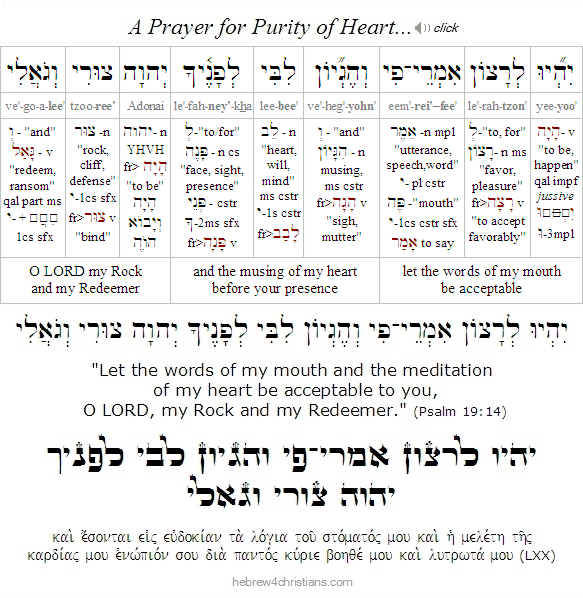 |
Heart of the Torah...

07.19.22 (Tammuz 20, 5782) The Hebrew word לב (i.e., lev, "heart") is made up of the first and last letters of the written Torah scroll (i.e., Genesis begins with בּ and Deuteronomy ends with ל), though we can only make this connection after we reach the end of the scroll, that is, after we read back and review what we have learned... If we only read forward and forget to go back, we would end up with the word בּל (i.e., bal, not, negation, denial).
The Baal Turim notes that these two letters, בּ and ל, are the only two in the Hebrew alphabet that can be combined with the letters of the Name of the LORD (יהוה) to form meaningful words (e.g. בּיהוה ,ליהוה, and so on), whereas none of the other letters can do this. He concludes that the heart is the point through which we connect with the LORD.
It is written that the words of Torah "return the soul" (Psalm 19:7) because the Hebrew words and letters themselves contain spiritual power and life (Heb. 4:12; 1 Pet. 1:23). Indeed some of the sages note that the first few words of Scriptures point to the Hebrew alphabet: בְּרֵאשִׁית בָּרָא אֱלהִים אֵת, "In the beginning God created et (אֵת)," that is, א and ת, or the Hebrew alphabet itself... In this connection note the first letter of the Torah (i.e., בּ in "bereshit") and the last letter of the New Testament (i.e., ן in "amen") combine to form the word בּן (i.e., ben, son), alluding to the all-encompassing wisdom, power, and glory of God the Son, the very revelation of YHVH (יהוה) to mankind.
Hebrew Lesson
Psalm 19:7 reading (click):
Beloved Shepherds...
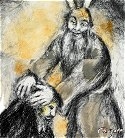
[ The following entry concerns this week's Torah reading, parashat Pinchas... ]
07.19.22 (Tammuz 20, 5782) The Hebrew word for "beloved" is yedid (יְדִיד), which comes from the word dod (דּוֹד), as used in the verse ani le'dodi ve'dodi li (אֲנִי לְדוֹדִי וְדוֹדִי לִי), "I am for my beloved and my beloved is for me" (Song 6:3). The name "David" (דָוִד) likewise comes from this root. It is interesting to see that the word yedid is formed by combining or joining the Hebrew word for "hand" (i.e., yad: יָד) together (i.e., יָד+יָד), which pictures two friends walking together while holding hands...
When Moses realized that his son Gershom would not be his successor, he asked God for a shepherd to lead the people, and the LORD told him ve'samakhta et yadkha alav - "put your hand on Joshua" (Num. 27:18). Moses, however, not only placed one hand on Joshua, but both hands (Num. 27:23), which suggests that he was wholehearted for the things of God, and to symbolically regard Joshua as yedid (יְדִיד), that is, "hand-in-hand" with Moses' heart for the welfare people...
Shalom chaverim; stay strong in hope... Do not listen to voices of fear, but hear (shema) the LORD calling out your name to abide in His love and care! Yeshua is our Good Shepherd who always lays down his life for his sheep...
Hebrew Lesson
Psalm 90:17 Hebrew reading (click):
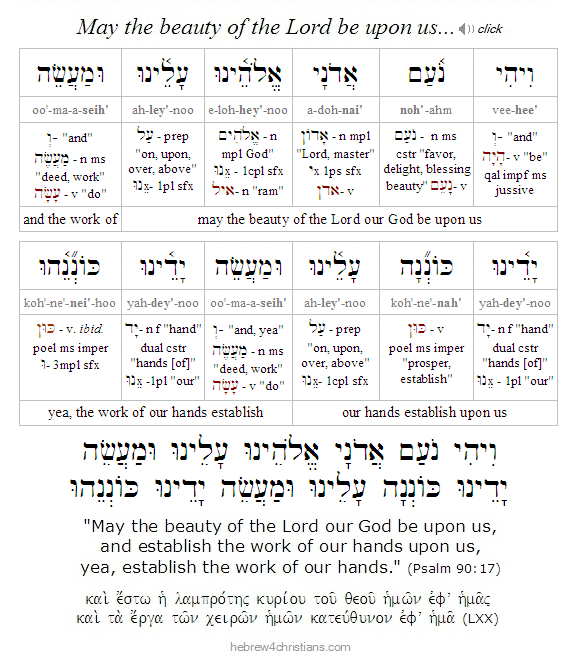 |
Seeking God's Presence...

07.19.22 (Tammuz 20, 5782) The Hebrew word for "world" or "age" is olam (עוֹלָם), which is derived from a root verb (עָלַם) that means "to conceal" or "to hide." God "hides" His face from us so that we will seek Him, and that means pressing through ambiguity of this world to discern and take hold of the truth. Therefore King David said, בַּקְּשׁוּ פָנָיו תָּמִיד/ bakeshu fanav tamid: "Seek His face continually" (Psalm 105:4). Note that the Hebrew gematria (numerical value) for the word "fanav" (i.e., "His face") is the same as that for the word "olam." When we truly seek God's face (i.e., His Presence), that is, "do teshuvah," we are able to discern the underlying purpose for our lives in this age... As it is written in our Scriptures: "Blessed is the one who endures temptation, for when he is tried, he shall receive the crown of life (עֲטֶרֶת הַחַיִּים) that the LORD has promised to those who love him" (James 1:12). The present age, then, constitutes a test that God providentially designs to lead us to the "crown of life," and we are made happy when we go through its fires and are not consumed. Indeed, only those who love the Lord will be able to withstand the fires... The "crown of life" symbolizes that we have truly received the purpose for which we were created and that we are identified with God's own passion and love. The light of the crown represents the Divine Presence within us, the Life that overcomes despair on our behalf.
Hebrew Lesson
Psalm 105:4 reading (click):
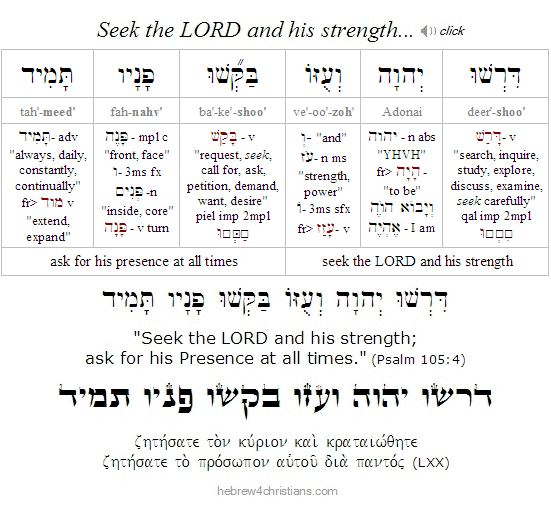 |
"It is not the path which is the difficulty; rather, it is the difficulty which is the path." The ancient Greek version of the Torah (i.e., the Septuagint) translates this verse, "Seek the LORD and be strengthened; seek His face through everything (διὰ παντός)." The LORD God gives us "inner strength" (i.e., ἐγκράτεια, from εν-, "in" + κράτος, "strength" or "power") when we yield to "the power of His might" (ἐν τῷ κράτει τῆς ἰσχύος αὐτοῦ) (Gal. 5:22-23; Eph. 6:10). Therefore we must remember God's power and glory, for "He is the LORD our God (הוּא יְהוָה אֱלהֵינוּ); His judgments are in all the earth" (Psalm 105:7).
The Shepherd's Call...
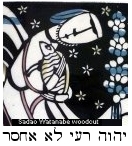
07.19.22 (Tammuz 20, 5782) A message of teshuvah from our Lord: "What do you think? If a man has a hundred sheep, and one of them has gone astray, does he not leave the ninety-nine on the mountains and go in search of the one that went astray? And if he finds it, truly, I say to you, he rejoices over it more than over the ninety-nine that never went astray" (Matt. 18:12-13). Though it involves sorrow and the pain of being lost, repentance is ultimately about finding joy, and when we return to God, we have reason to rejoice. The Good Shepherd says, "Rejoice with me, for I have found my sheep that was lost. Just so, I tell you, there will be more joy in heaven over one sinner who repents than over ninety-nine righteous persons who need no repentance" (Luke 15:6-7).
The Son of Man came to seek and to save the lost: "For thus says the Lord the Eternal: Behold, I, even I, will search for my sheep and I will seek them out. I myself will be the Shepherd of my sheep, and I myself will make them lie down, declares the Lord GOD. I will seek the lost, and I will bring back the banished, and I will bind up the injured, and I will strengthen the sick..." (Ezek. 34:11,15-16).
Hebrew Lesson
Ezekiel 34:11 reading (click):
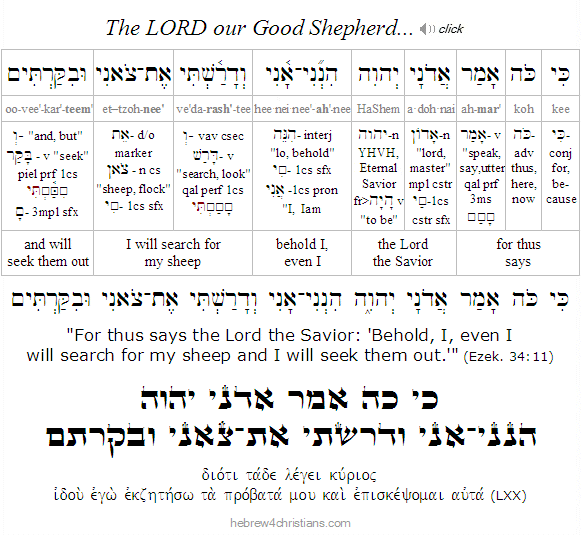 |
Faith and Loneliness...

07.18.22 (Tammuz 19, 5782) A.W. Tozer once wrote: "The loneliness of the Christian results from his walk with God in an ungodly world, a walk that must often take him away from the fellowship of good Christians as well as from that of the unregenerate world. His God-given instincts cry out for companionship with others of his kind, others who can understand his longings, his aspirations, his absorptions in the love of Christ; and because with his circle of friends there are few who share his inner experiences, he's forced to walk alone. The unsatisfied longings of the prophets for human understanding caused them to cry out in their complaint, and even our Lord himself suffered in the same way.
"The man (or woman) who has passed on into the divine Presence in actual inner experience will not find many who understand him. He finds few who care to talk about that which is the supreme object of his interest, so he is often silent and preoccupied in the midst of noisy religious shoptalk. For this he earns the reputation of being dull and over-serious, so he is avoided, and the gulf between him and society widens. He searches for the friends upon whose garments he can detect the smell of myrrh and aloes and cassia out of the ivory palaces, and finding few or none, he, like Mary of old, keeps these things in his heart. It is this very loneliness that throws him back upon God. His inability to find human companionship drives him to seek in God what he can find nowhere else."
Such was Abraham's test, as he had no way to communicate his burden regarding the sacrifice of his beloved son Isaac. And there is also a loneliness that arises when you must wrestle through disappointment in your walk with God... This is an empty place where you realize that you're request has been denied, and yet you must continue to walk on in trust. That is a hard place, too.
"Blessed are those who mourn, for they shall be comforted" (Matt. 5:4). Yes, blessed are those who suffer such desperate need, who know inner emptiness, who are not made numb to the ache, and who cry from the heart for deliverance. Blessed are those who are in dread over themselves, who fall as one dead before the Divine Presence, who know they are undone, ruined, and dying for life... The great danger, spiritually speaking, is to become complacent, untouched by poverty of heart, to be lulled asleep, lost within a dream, made comatose, living-yet-dead. The gift of faith first reveals our own lostness and then imparts courage to live with ourselves despite ourselves as we seek God's healing and life...
Hebrew Lesson:
Matt. 5:4 Hebrew reading:
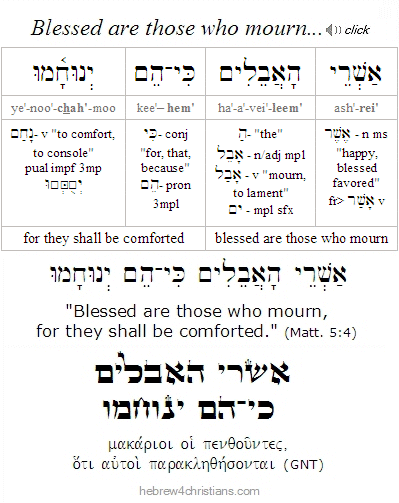 |
Our Wounded Shepherd...

[ The following concerns this week's Torah reading, parashat Pinchas....
07.18.22 (Tammuz 19, 5782) From our Torah this week (i.e., parashat Pinchas) we read how Moses appealed to God for the one who would serve as his successor: "Let the LORD, the God of the spirits of all flesh (אלהֵי הָרוּחת לְכָל־בָּשָׂר), appoint a man over the congregation who shall go out before them and come in before them, who shall lead them out and bring them in, that the congregation of the LORD may not be as sheep that have no shepherd" (Num. 27:16-17). The Koznitzer rebbe commented here that Moses asked God to appoint a leader "for all flesh," le'khol basar (לְכָל־בָּשָׂר). Rearranging the letters of basar (בָּשָׂר), he formed the word shavar (שָׁבָר), which means "to break in pieces," and concluded that a true leader should be one with a broken heart (לב שבור), that is, one who can sympathize and have pity on his people (Heb. 2:8; 4:15; 5:1-ff). God's leader should not be proud or aristocratic, but like a shepherd, a plain and simple person, who patiently guides his people to observe the ways of the LORD. Therefore our beloved Yeshua, the Good Shepherd, is also called a "Man of sorrows acquainted with grief" (Isa. 53:3).
Hebrew Lesson
Isaiah 53:3 reading (click):
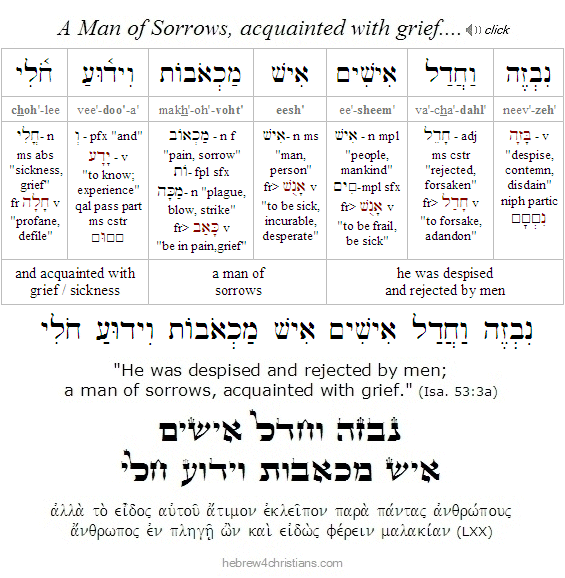 |
Shavuah Tov Podcast:
Parashat Pinchas...

07.17.22 (Tammuz 18, 5782) The audio podcast for parashat Pinchas provides an overview of the Torah reading as well as a discussion of the meaning of faith, the importance of the gospel message, and how Yeshua is revealed in the life of Pinchas... I also discuss the "Three Weeks of Sorrow" leading up to the somber holiday of Tishah B'Av as well as the significance of the Jewish holidays (mo'edim) in general. I hope you find it helpful.
This week's Torah:
Parashat Pinchas - פינחס

07.17.22 (Tammuz 18, 5782) Last week's Torah portion (i.e., parashat Balak) first introduced us to a man named Phinehas (i.e., "Pinchas"), the son of Eleazar the priest and grandson of Aaron, who, during the tragic rebellion at Baal Peor, zealously removed evil from Israel by driving a spear through a tribal prince who was brazenly cavorting with a Midianite princess in defiance of God's law. On account of Pinchas' zeal for the truth of Torah, God stopped the plague and Israel was delivered from great destruction... This week's Torah portion (i.e., parashat Pinchas) begins with the LORD rewarding Pinchas by granting him a "covenant of peace" (ברית שׁלום) and an everlasting priestly line in Israel (ברית כהנת עולם). As I hope you will see, Pinchas pictures the Messiah Yeshua, and the covenant of priesthood given to him is a picture of the greater priesthood after the order of Malki-Tzedek.
Jewish tradition says that when Aaron and his sons were commissioned as the exclusive priests of Israel (Exod. 40:12-15), the office applied only to themselves and their future descendants. Since Aaron's grandson Pinchas had already been born at the time the promise was given, however, he did not automatically receive this honor, especially since his father Eleazar (the son of Aaron) was married to an "outsider" -- namely, the daughter of Yitro (also called Putiel, Exod. 6:25). This explains Rashi's statement that the other tribes mocked Pinchas. How dare this "son of an outsider" kill a nassi (prince) of Israel (i.e., Zimri), especially since Pinchas' mother was regarded as an idol worshipper! The LORD honored Pinchas' zeal, however, and overruled the tribalism of the Israelites, and he was therefore elevated to be a priest with special honor before the LORD.
God looks at the heart, chaverim, and is able to make those who have zeal for Him true priests of the LORD! You don't have to be born Jewish to impress the LORD God of Israel, since He's "no respecter of persons" (Rom. 2:11). Not only can He create spiritual children of Abraham from the stones of the ground (Matt. 3:9; Luke 3:8), but He can turn someone considered a non-Jew (by the rabbis, anyway) into a highly honored priest of Israel (1 Pet. 2:9-10). Indeed, many descendants of Pinchas later became the most faithful of the High Priests of Israel during the First Temple period.
Note that according to one midrash, when Zimri and Cozbi (the Midianite princess) were cavorting, they actually ran inside the Tabernacle compound itself, directly past Moses and the people who were weeping at its entrance (Num. 25:6)! Pinchas then took a spear from the Tabernacle guards and followed after them. When he caught up with them within the Tent of Meeting itself, he pierced them through (Num. 25:7-8). After this, thousands of men from the tribe of Simeon ran in after him, seeking to kill him. Pinchas was in such a state of terror that "his soul left him" and the souls of Nadav and Abihu (Aaron's deceased sons) entered his body -- and by this means he became a Kohen.
Parashat Pinchas (like parashat Emor in Leviticus) also mentions of all of the (sacrifices of the) mo'edim (holidays) given to the people Israel (Num. 28). These include the daily (tamid), weekly (Shabbat), monthly (Rosh Chodesh) sacrifices, as well as the sacrifices assigned to the special holidays: Passover, Shavuot, Rosh Hoshannah (Terumah), Yom Kippur, Sukkot and Shemini Atzeret. The sages said that remembering the joys of the Temple and the special celebrations of the Jewish people promote the call to do teshuvah during the otherwise somber time of the Three Weeks of Sorrow.
Dangers of Fooling Yourself...

07.15.22 (Tammuz 16, 5782) It has been said that there are two ways to be fooled. One is to believe what isn't true; the other is to refuse to believe what is... Hence thinking that you are spiritual when you really are not is to deceive yourself, but so also is thinking you are not spiritual when you really are. In the former case you are a hypocrite, but in the latter case you are a person of little faith... If you are willing to honestly examine the status of your spiritual life, see whether you are trusting in your own will to believe, in your own obedience to the moral law, etc., or whether you are trusting in the Reality and power of the resurrected Savior to give you life from the dead...
We've learned from repeated failures that "the power of sin is in the law" (1 Cor. 15:56), that is, in the unjustified pride of the flesh (ego) that attempts to validate or justify itself. The business of working on yourself, excusing yourself, defending yourself, and so on runs so deeply within that Paul calls it the "law of sin and death" (תּוֹרַת הַחֵטְא וְהַמָּוֶת). Often we have to keep revisiting the same sins over and over until the message sinks in and we begin to "get it." Only God Himself knows how many iterations are needed, but the flesh seems irrepressible in its pride and therefore keeps attempting to operate "under the law." Living under the law, however, means living under the principle of self-justification, which invariably leads to failure, guilt, and the need for further self-justification. "Religion" can serve as a construction of the ego, an acronym that means "easing God out." The solution to this ever-turning "wheel of sorrow," this infinite and self-defeating "loop," is to "die to the law" and its demands and be raised to live in newness of life (Rom. 7:1-6; Gal. 2:19-21).
We read in the Torah: "Now the man Moses was exceedingly humble, more than any other person on the face of the earth" (Num. 12:3). Note that the word "humble" (i.e., anav: עָנָו) can be rearranged to spell the word "iniquity" (i.e., avon: עוֹן) by swapping the letter Vav (ו), the symbol for man (i.e., "flesh"), in place of the letter Nun (נ), the symbol for life/Yeshua. This suggests that when we put ourselves as the center, we cease to be humble but instead become perverse; conversely, putting Yeshua in the center of your life instills true humility...
Hebrew Lesson
Prov. 16:25 reading (click):
Faith and Knowledge...
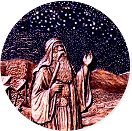
[ This entry is intended for seekers and those who are unsure of the meaning of truth... ]
07.15.22 (Tammuz 16, 5782) All thinking is a form of believing, and therefore there is no truth apart from faith. The scientist who carefully observes phenomena, for instance, is a person of faith who believes that an external world exists, that it is knowable by the human mind, that the future "resembles" the past (i.e., the uniformity of nature), that causal relationships exist, that the scientific method is able to reliably use logical inference to reach tentative conclusions, and so on. Indeed, the entire scientific worldview relies on metaphysical assumptions no less than any other religious view.
On a practical and existential level, then, we note that everyone trusts and makes decisions based on metaphysical presuppositions that they (sub)consciously assume to be trustworthy. Regarding such assumptions, (i.e., axioms of ultimate meaning and "consequential weight"), we are constrained to give account, though we cannot settle the truth of such assumptions using the science or a naturalistic worldview without begging questions...
Some examples of matters of ultimate meaning include: "Why is there something rather than nothing?" "Does God exist?" "Is the universe a finite closed-system of cause and effect or the handiwork of a personal Creator, or neither?" "Is there a purpose to life, and if so, what is it?" "What is the nature of reality? Is everything categorically made up of "matter" (however you define it) or is there a non-material, spiritual dimension to reality as well? On the other hand, could everything be made up of spirit (or mind) and the idea that matter matter "exists" is just a fictive product of the mind?" "Is the universe governed by impersonal forces or does God personally supervise all that happens?" "How do we know things, and indeed, how can we properly define knowledge?" "Do we acquire knowledge exclusively through our senses or may it be attained by reasoning, intuition, or mystical revelation as well?" And so on...
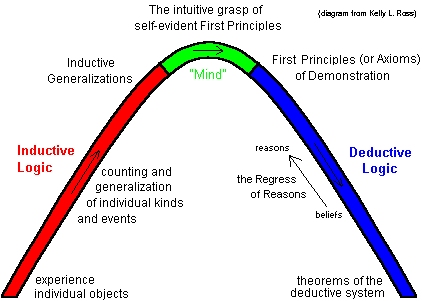 |
How we answer these sorts of questions reveals what we trust as ultimately real and worthy of our confidence. In other words, since thinking is necessarily a form of believing, and since believing is necessarily a form of "believing that," or believing in some sort of "object" that answers to the intentionality (or focus) of the mind, then every decision we make regarding the most prosaic of concerns to the most cosmic, presupposes a "deeper narrative" that contextualizes and gives meaning to our lives. This is inescapable to the human condition.
The narratives we believe are not trivial but are "weighty" in their consequence, and the more we trust in the "story" of what is real, the more authority and influence it has over our lives. Practically speaking, you can ask yourself who you would turn to when you are faced with a difficult decision to make. We may not be fully conscious of it, but apart from ourselves, each of us has a list of others whom we regard as worthy of our trust.
We "walk by faith, not by sight," and this is true of every soul, regardless of their educational level, socioeconomic status, gender, and so on. Each of us is a sojourner in this world; each of us is "going someplace" with the faith that animates our steps.
"Knowledge" has been defined as "justified true belief," but since belief is axiomatically assumed, what's left is the verdict we give that regards a particular truth claim to be justified, or warranted. That is how we esteem things to be "facts" or a true matter, after all. It would make no sense for me to say "I know x" when I am unsure if x is true, and what makes me sure that x is true are reasons (or justification) for my faith in the assertion: "I know x." Truth is a form of "correspondence" or "agreement" with language that points to something and affirms its reality (or state of being). Of course we sometimes get it wrong, and our descriptions are not accurate to what is real; our "x" may not be true, and if it were demonstrated that "x" was not the case, we would conclude that we were mistaken, that what we thought we knew was not really so, that we were wrong in our claim, and so on.
I hope you understand that it is a form of the "straw man" fallacy to say that "faith" is a matter of religious conviction, since, as we have seen, everyone has a system of faith and everyone is bound to assumptions they make about what is "true" belief (i.e., knowledge) and what is not. As G.K. Chesterton said: "It is idle to talk always of the alternative of reason and faith. Reason itself is a matter of faith. It is an act of faith to assert that our thoughts have any relation to reality at all." The difference in matters of ultimate questions has to do with the "direct object" of your faith. What are you relying on to be the best explanation for the meaning of your life? For atheists and humanists, the object of faith is their own reasoning, not God who created mankind in his "image and likeness." Theirs is a rather dismal myth that the universe "evolved" into being without any discernible reason, that human life is ultimately experienced as inexplicable and vain, and that the "end of the story" is found in the "heat death" of the universe. The best people can do is learn to love the machine in which they are enmeshed and hope for a meager happiness before they die and are extinguished forever.
No matter who you are, then, if you are able to think at all, you are a person of faith, trusting your fallible sense and fragile sense of rationality to justify or make sense of your worldview. This is inescapably certain, for to deny it requires faith in your thinking to the contrary. Despite this, there is no demonstrable certainty for your conclusions - and therefore you are consigned to the way of faith - even if you are a hidebound atheist or other comedian of the mind. It all comes down to who or what you are listening to, and to whom you yield authority. Every person has a "web of belief" that frames the "grammar" of their life, and the deepest question comes down to: "What are you trusting concerning your life?"
Hebrew Lesson
Psalm 27:13 reading (click):
The Good Eye Blessing...

07.15.22 (Tammuz 16, 5782) "The one who utters a blessing is blessed; the one who utters a curse is cursed" (Ruth Rabbah). This does not mean that we walk about blessing others in a formulaic (i.e., insincere) way as much as it expresses the great truth that as we are within, so we are without: as we forgive, so we are forgiven; as we give, so we receive... But we can't give to others what we have not received, and that means first of all learning to see how we are loved by God, despite ourselves. We must use ayin tovah, the "good eye" for the sake of our own inner peace. We must extend to ourselves "good will" and compassion before we can offer it to others. If you can't yet love yourself, ask the Lord to help you begin by not hating yourself, by turning away from the fear that hides behind your anger. As Rashi wisely said, "hatred causes a person to forget his identity."
Hebrew Lesson
Proverbs 22:9 reading (click):
Daily Dvar Podcast:
Matters of Death and Life...

07.15.22 (Tammuz 16, 5782) Shalom chaverim. Today's "Daily Dvar" broadcast discusses matters of death and life in terms of the gospel message of Yeshua our Messiah. I hope you will find it encouraging. You can listen by clicking the link(s) below:
Finding Purity of Heart...

07.15.22 (Tammuz 16, 5782) "Who shall ascend to the hill of the LORD? or who shall stand in his holy place? The one who has clean hands and a pure heart, who does not lift up his soul to vanity (לא־נָשָׂא לַשָּׁוְא) and who does not swear deceitfully" (Psalm 24:3-4). Yeshua expounded: "Blessed are the pure in heart, for they shall see God'" (Matt. 5:8). The Greek word translated "pure" is katharos (καθαρός), sometimes used describe the cleansing of a wound (catharsis), or to describe the unalloyed quality of a substance revealed through refining fire (the corresponding Hebrew word for the "pure of heart" (בַּר־לֵבָב), used in Psalm 24:4, comes from a root (בָּרַר) that likewise means to purify by fire). Metaphorically, then, purity of heart refers to separation from the profane - singleness of vision, wholeheartedness, passion, and focused desire for the sacred. As the Beatitudes reveal (Matt. 5:3-8), only those who are impoverished in spirit, who mourn over themselves and hunger for God's mercy, are refined by their struggle to see God (the Greek text implies these will see God now with inward vision and in the world to come). Because the pure in heart use ayin tovah, the good eye, they walk "in the light, as He is in the light" (Matt. 6:22). When we are undivided in heart, the Spirit imparts to us a hidden wisdom (1 Cor. 2:6-7) and we are able to discern hidden realities that others do not see (1 Cor. 2:14). As we center our affections on Yeshua, we become unified, made whole, and healed of our inner conflicts. We see the Lord both in this world, through his effects, and then panim el panim (פָּנִים אֶל־פָּנִים), "face to face," in the world to come. Our hope purifies us for the coming day of full disclosure (1 John 3:2-3; Heb. 12:14).
Hebrew Lesson
Psalm 86:11 reading (click):
The heart is a miracle, an "engine" that distributes life, and the heartbeat is a great mystery, inexplicably pulsing with energy, contracting the muscles, pumping blood.. The pulse of the heart, then, is the "center of the center" of a person's physical life... If we are impure of heart, we will be inwardly divided, unfocused, fragmented, filled with destabilizing anxiety, envy, anger, and so on. More tragically, because we seek to escape ourselves, we will be devoid of a true center, without a focal point or abiding purpose, and therefore we will be lost to ourselves, wandering and without rest....
Daily Dvar Podcast:
The Fear of the LORD...

07.15.22 (Tammuz 16, 5782) "The fear of the LORD is the first principle of knowledge, but fools despise wisdom and correction" (Prov. 1:7). In this "Daily Dvar" broadcast (see link below) I discuss how reverence or respect is axiomatic for a genuinely good life. Fearing God expresses the confidence that life is a sacred trust and that each soul is answerable to the Creator. Such godly reverence infers that nothing is trivial or inconsequential, and that all things will be accounted before the bar of divine truth. I hope you will find it helpful, friends.
Relying on God Alone...
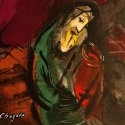
07.14.22 (Tammuz 15, 5782) "We we were so utterly burdened beyond our strength that we despaired of life itself, yes, we felt that we had received the sentence of death; but that was to make us rely not on ourselves, but on God who raises the dead" (2 Cor 1:8-9). This marks the end of carnal hope, when we realize we are but "dead men walking," and from this extremity of inner desperation and clarity we learn to rely solely on God for what we need. Here we abandon ourselves to God's care, despite the despair, darkness, and fear. We rely on "God who raises the dead," because all other remedies have been vanquished. It is a great gift to be so afflicted, for these "troubles of love" teach us to trust God alone for all we need. The only way out is through. We don't seek an easy way of life, but only that the LORD our God be with us throughout our troubles. "My portion is of the Lord," says my soul, "therefore will I hope for him" (Lam. 3:24).
Hebrew Lesson
Lamentations 3:24 reading (click):
Note: I need your prayers, friends... I have not been feeling well the last few days, and I have been tempted to discouragement because, after over 20 years of doing online ministry, it has never been more difficult because of various forms of censorship, shadow-banning, and other issues. Sometimes I grow weary, though God is faithful. Thank you for praying. - John
Torah of Adversity...

07.13.22 (Tammuz 14, 5782) How we deal with trouble and suffering (i.e., tzuris) makes all the difference. We may be tempted to bitterness over our lives, but then what? To paraphrase Soren Kierkegaard, the way of life is how more than it is what. You may be powerless to control reality, but you are nevertheless responsible for how you respond to it. Check your attitude. Do you chose to live in lament over a healing that has not yet happened, or perhaps regard yourself as a hapless victim? Or will you attempt to justify your suffering as a means of personal atonement, accepting it passively as a "good child" or martyr? Does your suffering stretch your heart, or does it cause you to shrink back in fear or self-pity?
In this connection, recall that when the Jews came to Marah, they "could not drink the water because it was bitter" (Exod. 15:23). The Hebrew, however, could be read, "they could not drink the water because they (i.e., the people) were bitter (כִּי מָרִים הֵם). The problem is often not "out there" but within the heart (Matt. 15:19-20). How we choose to see, in other words, says more about us than it does the external world. If you make the mistake of reading the daily news and taking it seriously, you will see only ugliness, and you run the risk of becoming hardhearted. Worldly despair eclipses apprehension of the Presence of God....
We have to use ayin tovah, "a good eye," whenever we encounter the inevitable (and ubiquitous) adversities of life. Instead of seeing ourselves as victims of undeserved trouble, and instead of harboring resentment over the past and entertaining fear of the future, we must learn to see adversity in the light of faith that teaches lessons about finding resilience and hope. Faith affirms that adversity has an end that is ultimately good. Faith will not bow the knee to dark visions and live in dread of worldly fate.
It's been said, "hurt people hurt people," which means that if healing is not found for our woundedness, our pain will likely "leak out" as depression and hostility toward others... Finding inner peace is therefore crucial lest we become poisoned through a "root of bitterness" that defiles many (Heb. 12:15). The worst sort of prison is the one we make for ourselves, by choosing to be taken captive by fear and anger. May the Lord show us mercy and help us grow in grace and in the knowledge of his heart in all things. Amen.
Hebrew Lesson
Psalm 119:75 reading (click):
The Call to Pray...

07.13.22 (Tammuz 14, 5782) The Scriptures admonish us to pray for all who are in authority so that we may lead a peaceful and quiet life, godly and dignified in every way (1 Tim. 2:2). Unlike the world that uses violence to express its will, the weapons of our warfare are not "carnal" (i.e., based on human agency) but are "mighty through God" through the pulling down of strongholds of evil that seek to enslave people in darkness and fear (2 Cor. 10:5). Above all this is a spiritual battle, friends - a fight for the heart and soul of humanity. Ask the Lord to intervene and thwart the schemes of the wicked who collude among themselves to "deconstruct" (i.e., deny) their responsibility to live and love the truth. The hour is now, and it is on our watch that the battle lines have come.
Ruth Graham was reported to have said that if God did not judge America, he would have to apologize to Sodom and Gomorrah. Pray for our country, that the Lord will have mercy upon this land. However the time of tribulation indeed draws near, friends, and the hour of testing for God's people may be approaching. Regardless of the insanity of our age, we serve the LORD our God who is our King forever. We trust that he will providentially guide all things for the ultimate good of those whom he has chosen to be heirs of salvation. So pray with all your heart, and with all your heart let go and trust God for the outcome. Faith, not fear. Our God reigns forever and ever. Amen.
Hebrew Lesson
Psalm 46:1-2 reading (click):
Heaven's Last Laugh...

07.13.22 (Tammuz 14, 5782) "Blessed are you who weep now, for you shall laugh" (Luke 6:21). Despite the heartache of our present life and the grief we now bear, sorrow will not be given the last word, but rather laughter and joy... And even now, in the midst of our afflictions, we can laugh at the prospect of the coming great Day when all things shall be completely healed, the untrue will be made true, the crooked made straight, and our hearts deepest dream for love will be fulfilled...
Nonetheless we still weep because we see the world as painful, tragic, and filled with so much sadness; we cry out for deliverance; we mourn over our lives and for the lives of others we love... If you have a heart that still can feel, you know the crushing weight of sin, you share the agony of others who struggle with their sufferings; and you may feel nearly suffocated by the darkness, pain, and inconsolable despair. Indeed only those who are heartless can laugh at the troubles of this world, unmoved and untouched by the sorrows of others, perhaps because they are insulated in their moneyed indifference or else because they scorn life as "hard" and unforgiving, yet in either case we hear Yeshua add, "Woe to you who laugh now" (either in levity or in bitterness), "for you shall mourn and weep" (Luke 6:25). So you see how it is: God's people will always be "out of step" with this world and its godlessness and idolatry. Genuine faith is a form of protest against any interpretation of reality that denies or minimizes the truth of the Divine Presence and therefore it suffers as the world exchanges truth for the lie.
Indeed God's people are "strangers" in this world; they are estranged and live as "resident aliens" -- here, yet not here.... Those who 'settle' here, who lay claim to life in this world, therefore make God their stranger. Thus King David said to the LORD: "We are strangers with You (כִּי־גֵרִים אֲנַחְנוּ לְפָנֶיךָ) and sojourners like our fathers; our days on earth are like a shadow (כַּצֵּל יָמֵינוּ) without abiding (1 Chron. 29:15). Faith in Yeshua affirms that underlying the surface appearance of life is a deeper reality that is ultimately real and abiding. It "sees what is invisible" (2 Cor. 4:18) and understands (i.e., accepts) that the "present form of this world is passing away" (1 Cor. 7:31). The mode of faith therefore calls us to live as toshavim - sojourners - who are at an infinite "distance" from the world of appearances and who seek the Eternal. We are "just passing through" this world, as we look forward to our promised home in heaven (Heb. 11:9-10). Then the days of our mourning shall be turned to dancing and God himself shall wipe away all tears from our eyes (Rev. 7:17; Isa. 55:11).
Hebrew Lesson
Psalm 97:11 reading (click):
Divine Transposition...
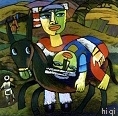
07.12.22 (Tammuz 13, 5782) There is a "transposition" of values, a "holy irony," in the realm of the Spirit. From God's perspective that which considered great in the eyes of men is considered of little account, and that which is considered insignificant in the eyes of men is considered of great importance (Luke 9:48). The wisdom of this world (i.e., pragmatic, self-promoting egotism, etc.) is regarded as folly before God (1 Cor. 1:20, 3:19). Therefore Yeshua "made himself nothing" and disguised himself in the form of a lowly servant (ἀλλὰ ἑαυτὸν ἐκένωσεν μορφὴν δούλου λαβών). Unlike various systems of religion that attach merit and status to those who have attained "respectable levels" of personal sanctity, those who are called "great" in the Kingdom of Heaven will be identified as the servants of all (Mark 9:35; 10:44). Like the hidden light of the menorah within the inner chamber of the Tabernacle, the deeds of the humble are beheld inwardly, where the Heavenly Father "sees in secret" (Matt. 6:4). As Yeshua Himself said, כִּי מַלְכוּת הָאֱלהִים בְּקִרְבְּכֶם / "The Kingdom of God is a matter of your inmost heart" (Luke 17:21).
Spiritual pride is inherently self-flattering, self-exalting, and therefore antithetical to spiritual life. Indeed, the term itself is an oxymoron (e.g., like "bittersweet"), since genuine spirituality is always rooted in humility (i.e., anavah: עֲנָוָה). The humble soul understands its finitude and radical contingency -- and therefore recognizes its absolute need for God's help. Spiritual pride is really a disguised mode of intolerance, a cocksure smugness regarding matters of infinite significance, and therefore represents a state of negation toward others... It is impatient to listen, spurns self-questioning, and refuses to accept uncertainty about some of life's deepest questions. Such pride often pretends to "have the answers" regarding all the riddles and mysteries of life. Humility, on the other hand, confesses that it does not always know and is not always so sure. It is a state of openness, of listening, of being teachable. It is aware of our insufficiency, our frailties, and our limitations...
"You have never talked to a mere mortal. Nations, cultures, arts, civilizations - these are mortal, and their life is to ours as the life of a gnat. But it is immortals whom we joke with, work with, marry, snub and exploit - immortal horrors or everlasting splendors" (C.S. Lewis: The Weight of Glory). Regardless of the outcome of the US presidential election, understand that the LORD is upon the throne forever, and it is God who sets up and dethrones powers and authorities according to His good pleasure (see Psalm 75:6-7; Prov. 16:33; Job 42:2; Lam. 3:37-39; Sam. 2:7; Rom. 9:17, Col. 1:16-17, etc). "All the nations are as nothing before Him; he regards them as nothingness and unreality" (Isa. 40:17).
Hebrew Lesson
Isaiah 40:17 reading with comments (click):
"Blessed are those who weep while the world goes on laughing, for theirs is the kingdom of heaven; blessed are the meek, for they shall overcome; blessed are those who realize they know little, for they shall find treasure; blessed are those who realize they are unrighteous, for they shall find healing; blessed are the misfits who are disowned by the world as fools, for they shall find mansions in heaven; blessed are the weak, for they shall be made strong; blessed are those who weep, for they shall obtain eternal consolation; blessed are those who refuse to assimilate into this world and its idols, for they shall be called victors in the world to come..."
God turns everything "upside down," for what is esteemed in this world is regarded as vanity in the world to come, and vice-versa. The Scriptures teach, "Light is sown for the righteous (tzaddikim), and joy for the upright (yashar) in heart" (Psalm 97:11). May it please the LORD God to renew our courage to live wholeheartedly according to His truth, and to resist the pressure to conform to the idolatry (i.e., fear, rage, and desires) of this world. Amen.
 |
The Mystery of Spirit...

07.12.22 (Tammuz 13, 5782) The word "spirit" points to wonder, to something extraordinary and beyond our expectation, that is, to the mysterious Divine Presence that pervades all things yet rises above all things. Yeshua likened the Ruach (רוּחַ) with the inscrutable motions of the wind: "The wind blows where it wishes, and you hear its sound, but you do not know where it comes from or where it goes. So it is with everyone who is born of the Spirit" (John 3:8). We see the effect of the wind, but not the wind itself, which illustrates that the wind is ultimately beyond our grasp and control. To be "born of the Spirit" is therefore a mysterious intervention from heaven (John 1:13), just as being "led by the Spirit" implies seeing differently, that is, apprehending the Divine Presence in the mysterious motions of life.
Hebrew Lesson
Psalm 139:7 reading (click):
Soren Kierkegaard connects the movement of the Spirit with a deep sense of longing: "The wind blows where it will; you are aware of its soughing, but no one knows whence it comes or whither it goes. So also with longing, the longing for God and the eternal, the longing for our Savior and Redeemer. Comprehend it you cannot, nor should you; indeed, you dare not even want to attempt - but you are to use the longing. Would the merchant be responsible if he does not use the opportune moment; would the sailor be responsible if he does not use the favorable winds - how much more, then, is the one who does not use the occasion of longing when it is offered" (Kierkegaard: Discourses).
The Torah of Balaam...

07.12.22 (Tammuz 13, 5782) In our Torah portion for this week (i.e., Balak), we read how Balaam intended to curse the Israelites, but God "took hold of his tongue" and made him bless the people instead... It is encouraging to realize that despite the repeated failures of the Israelites in the desert, the LORD never let go of his people... Indeed, as the story of Balaam reveals, if a spiritual enemy should secretly arise to curse Israel, God would take the sorcerer "by the tongue" to evoke God's blessing instead (Deut. 23:4-5). As Balaam himself later confessed: "there is no sorcery (i.e., nachash: נחש) against Jacob; there is no divination (i.e, kesem: קסם) against Israel" (Num. 23:23).
Unlike scheming Balaam, who was willing to say whatever people wanted to gain temporal reward, God is "not a man that he should lie, nor a son of man, that he should change his mind" (Num. 23:19, 1 Sam. 15:29). Whatever the LORD has promised he will invincibly perform: His word is full of integrity and truth: "The grass withers, the flower fades, but the word of our God will stand forever" (Isa. 40:8). Amen. The God of Israel is forever faithful in his love, and no one can overrule his desire (Num. 23:20; Rom. 11:29; Isa. 40:13).
You can trust in your promised future, friend. As it is written: "No weapon fashioned against you shall succeed, and you shall refute every tongue that rises against you in judgment. This is the heritage of the servants of the LORD (זאת נחלת עבדי יהוה) and their vindication from me, declares the LORD" (Isa. 54:17).
Hebrew Lesson
Numers 23:23a reading (click):
Fast of the Fourth Month...

[ This year the Fast of Tammuz begins at dawn Sunday, July 17th and lasts until sunset...]
07.12.22 (Tammuz 13, 5782) According to Jewish tradition Moses shattered the tablets on the 17th day of the 4th month, after he came down from Sinai and found the people worshipping the golden calf. Today, this tragic date is commemorated as a fast day (i.e., the "Fast of Tammuz"), which marks the beginning of a Three Week season of mourning that culminates on Tishah B'Av (i.e., the date when the people tragically believed the evil report of the spies and were sent into exile).
During this Three Week season of national lamentation, the weekly readings from the prophets are all "Haftarahs of Rebuke" that warn the people about imminent judgment from heaven, and therefore the theme of most Jewish religious services is teshuvah (repentance). In addition, weddings or other joyous events are usually not held during this time of year. Indeed, among the very Orthodox, the last nine days of the three weeks are the most rigorous and solemn. Beginning on the first day of the month of Av, traditional mourning customs are practiced in anticipation of the most solemn fast day of Tishah B'Av, when the Book of Lamentations (Megillat Eichah) is plaintively recited during the evening service.
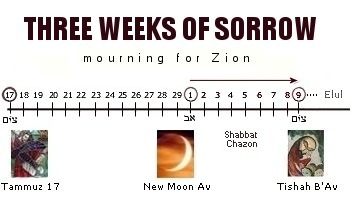 |
This year the Fast of Tammuz begins at dawn Sunday, July 17th and lasts until sunset. Tishah B'Av begins sundown Saturday, August 6th and ends at sunset the following day. Note that both dates are postponed one day to offset the weekly Sabbath this year....
Hebrew Lesson
Lamentations 5:21 reading (click):
The Enigma of Balaam...
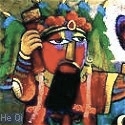
07.11.22 (Tammuz 12, 5782) In our Torah reading for this week (i.e., parashat Balak), we are introduced to a strange character named "Balaam" (בִּלְעָם), who was famously rebuked by a talking donkey, though in light of his supposed ability as a "seer" who could prophesy in the Name of the LORD (יהוה), we may wonder what to make of this man. Was Balaam, who was a Midianite, a true prophet or a mere puppet in the hands of God?
Jewish scholar Nehama Leibowitz (1906-1997) notes two essential differences between Balaam (who was a Gentile) and the Hebrew prophets of Israel. First, Balaam sought "special visitations and visions," building altars and performing rituals to "force" the prophetic spirit. The Hebrew prophets, on the other hand, never engaged in these sorts of activities to hear from the LORD, and many were reluctant messengers, convinced of their own unworthiness and nothingness. Second, the Hebrew prophets cautiously spoke in the name of the LORD ("thus saith the LORD...") to authenticate their message, but Balaam took credit for his visions, flamboyantly regarding himself as a "great seer" with special powers. Based on Joshua 13:22 (which describes him as a sorcerer), it is likely that Balaam was given a temporary gift of prophecy, perhaps like the "witch of Endor" was allowed to temporarily communicate with the dead (1 Sam. 28:7-20). In other words, God raised up Balaam to demonstrate his authority over the powers of darkness and to reassure Israel of God's ongoing protection of his people.... Ein od milvado.
In the New Testament, Balaam is described as one who sought to corrupt others for his own personal gain. The Apostle Peter does not call him the "son of Beor" but "son of Bosor" (τοῦ Βοσόρ), apparently a play on the Hebrew word basar (בָּשָׂר), meaning "flesh," implying that he was a "son of carnality" who enticed of Israel to sin at Baal Pe'or (see 2 Pet. 2:15; Num. 31:16). Peter further described him as a spiritual hireling who loved the "wages of unrighteousness" (μισθὸν ἀδικίας ἠγάπησεν), and who (like the Sophists of ancient Greece) was willing to sell his spiritual "services" without regard for the truth (Num. 22:7, Deut. 23:4-5). Balaam so loved the prospect of reward and the flattery of men that he justified his venture into darkness. "An evil eye, a haughty spirit, and a lusting soul - these are signs of disciples of the wicked Balaam" (Avot 5:22).
The Hebrew word melekh (מֶלֶךְ) means "king" and shares the same letter value as the word lemech (לֶמֶךְ), a name that means "powerful," but can also mean "fool." The sages reasoned that since the letter Mem represents the brain (מוֹחַ) or thought (מַחֲשָׁבָה), and the letters Lamed-Kaf refers to the kidneys (כליות), a king is one who uses right thinking to rule the heart (מ-לך), but a fool reverses the order and makes thinking a servant of the passions and the lower nature... Therefore Balaam was properly regarded as a fool (Josh. 13:22).
Hebrew Lesson
Psalm 25:10 reading (click):
Note: For more on this topic, see the article: "The Way of Balaam."
The Hidden Kingdom...

07.11.22 (Tammuz 12, 5782) When the disciples asked Yeshua how they should pray, he began with the words: "Our Heavenly Father, sacred is your name; may your kingdom come, may your will be done..." (Matt. 6:9-10). You might overlook it, but these words imply that God's kingdom is not naturally within us, and indeed, as Yeshua taught elsewhere, what is "naturally" within the heart is just the opposite: "For from within, out of the heart of a person, come evil reasonings (οἱ διαλογισμοὶ οἱ κακοι), adulteries, fornications, murders, thefts, covetousness, wickedness, deceit, lewdness, an evil eye, blasphemy, pride, foolishness. All these evil things come from within and defile a person" (Mark 7:21-23). So when Yeshua told the Pharisees that the kingdom of God is "within you," he meant that the kingdom is a matter of a heart that has been reborn by the Spirit - not that people are naturally endowed with a divine "spark" (ניצוץ) within them. No, the default condition of the unregenerated heart is one of selfish autonomy that refuses to submit to God's right to reign. Its creed is: "I am the master of my fate: I am the captain of my soul" (Henley). The natural man is a rebel against God; a usurper of the prerogatives of God, and therefore he "eats from the apple" to define "good" and "evil" in his own self-serving terms....
The "default" condition of the soul is one of "spiritual death," an appearance of life that is actually "cut off" or alienated from the truth of God, and is therefore devoid of eternal life. As Yeshua told Nicodemus, "unless a person is born again (i.e., γεννηθῇ ἄνωθεν, "born from above"), they cannot see the kingdom of God" (John 3:3). The spiritual seed of the kingdom must be planted within the heart by the Spirit of God. "That which is born of the flesh is flesh, and that which is born of the Spirit is spirit. Do not marvel that I said to you, 'You must be born again.' The wind blows where it wishes, and you hear the sound of it, but cannot tell where it comes from and where it goes. So is everyone who is born of the Spirit" (John 3:6-8).
The miracle of new life comes through a supernatural conception, "from above" (ἄνωθεν), which means that we are entirely powerless in our natural state to impart life to ourselves. And that, of course, is the essential problem of human nature -- that despite our natural desire to be "godlike," we are monstrous in our estate, and therefore what we most need is "deliverance from ourselves," that is, salvation from the horrors of selfish existence.
The Scriptures declare that all our supposed acts of righteousness are "as filthy rags" before the LORD God (Isa. 64:6), so again, we need divine intervention, an "external healing" that comes from Yeshua alone, an entirely new existence that does not derive from "blood, nor the will of the flesh, nor of the will of man" (John 1:13). Only those who are reborn by God's Spirit are given "power to become the children of God" (John 1:12). Interestingly the Greek word translated "power" is eksousia (ἐξουσία), a compound word formed from the preposition ek- (ἐκ), meaning "out of," and the noun ousia (ουσία), meaning "being," thereby suggesting something ontologically different than "natural" reality. Indeed, the word points to the indestructible life of the resurrection of the Lord himself.
From our point of view, the agency of experiencing newness of life is a matter of the "mustard seed" of faith, a humble image that from something seemingly insignificant will come forth blessing and abundant life. This is how the kingdom of God grows - from the "bottom up," or from our brokenness and humility. Recall that when King David prayed, "Create in me a clean heart O God," he did not use the word "yatzar" (יָצַר), meaning to "form" or "shape" something into being, but he instead used the word "bara" (בָּרָא), the same word used to describe God's sovereign creation of the universe (Gen. 1:1; Psalm 51:10).
We may affirm "I can do all things through God who strengthens me," but we must understand what "all things" means... We can love the unlovely; we can bless those who curse us; we can suffer more than we know; we can endure in our desperation; we can thank God in our afflictions, and we can do all these things because we have been crucified with Messiah, and that the life we now live is grounded in our relationship with the indwelling Spirit of God. Paradoxically, the Christian life is a dying life, and our union with the death of Yeshua is also the gateway to the power of the resurrection life. We gain ourselves when we lose ourselves: "Not I, but Christ lives in me." By faith we are "incorporated" into Messiah: the 'old man' (i.e., unregenrated nature) has been crucified with him, and the 'new man' (i.e., regenerated nature) is created to know him as the central reason and dialog of life.
The kingdom of God is "within you" when God the true King lives within your heart, though this is hidden from the "eyes of the flesh," that is, from the pretenses of the natural man (1 Cor. 2:14). Consider the focus of our Lord. Yeshua did not esteem the things man regards as important; he was detached from the dramas and affairs of the political world. He pointed to flowers, birds, seeds, yeast in dough, fish, and other simple matters to illustrate the principles of the kingdom of God. Moreover his disciples were "nobodies" in the world; the people he healed were outcasts, strangers, unknown... And even our Lord himself was disguised in poverty and insignificance: "He sprouted up like a twig before God, like a root out of parched soil; he had no stately form or majesty that might catch our attention, no special appearance that we should desire him" (Isa. 53:2). God Almighty emptied himself of heavenly glory to become "baby Jesus" for us; he was born in a manger, in poverty and obscurity.
The "mustard seed" of faith... the hidden miracle of life that grows by God's power into a place of refuge and grace. It may seem like a slow or even tedious process, but the fruit of the Spirit is produced according to his will: "like a tree planted by the rivers of water that brings forth its fruit in its season" (Psalm 1:3). The process of spiritual growth is ultimately mysterious and divine: "The Kingdom of God is like someone who spreads seed on the ground. He goes to sleep and gets up, night and day, and the seed sprouts and grows, though he does not know how. By itself (αὐτομάτη, "automatically") the soil produces a crop, first the stalk, then the head, then the full grain in the head. And when the grain is ripe, he comes in with his sickle because the harvest has come" (Mark 4:26-29).
In light of all of this, be patient and continue to trust that the Lord to do the impossible within your heart (Matt. 19:26). "For I am sure of this very thing, that the one who began a good work in you will perfect it until the day of Yeshua the Messiah" (Phil. 1:6). "He will strengthen you to the end, so that you will be blameless on that day" (1 Cor. 1:8). "Now to Him who is able to keep you from stumbling, and to present you faultless before the presence of His glory with exceeding joy, to God our Savior, Who alone is wise, be glory and majesty, Dominion and power, Both now and forever" (Jude 1:24-25). Amen.
Hebrew Lesson
Psalm 51:10 reading (click):
Parashat Balak:
Overruling the Wicked
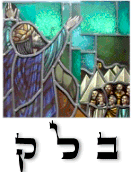
07.10.22 (Tammuz 11, 5782) Our Torah reading for this week is named after an ancient Moabite king named "Balak" (i.e., בָּלָק, "the destroyer") who sought to curse Israel by hiring the services of a flamboyant Midianite conjurer named "Balaam" (i.e., בִּלְעָם, "one set above the people"). It begins this way: "And Balak the son of Zippor saw all that Israel had done to Amalek (e.g., אֱמרִי) and grew fearful. King Balak's plan was to employ Balaam's sorcery (i.e., kashafut: כַּשָׁפוּת) against the Israelites to prevent them from entering the Promised Land. Similar to the delicious irony that befell the villain Haman in the Book of Esther, however, King Balak's scheme was upended, and the curse he sought to put on the Jewish people was repeatedly pronounced as a blessing by Balaam instead. After several foiled attempts, Balak fretfully dismissed the prophet, but before departing from the dejected king, Balaam ironically prophesied the destruction of the Moabites and the victorious establishment of Israel. Some peoples lives, it seems, are meant to serve as warning of the dangers of self-destruction.... The shameful story of Balaam reveals that "there is no enchantment against Jacob, no divination against Israel" (Num. 23:23). Ein od milvado (אֵין עוֹד מִלְבַדּו) - no weapon or scheme devised against God will ever prosper (Isa. 54:15-17).
But who was this mysterious prophet named Balaam? According to Jewish tradition, Jacob's wicked uncle Laban had a son named Beor (בְּעוֹר), who became the father of Balaam. In other words, the "cursing prophet" Balaam was none other than the grandson of Laban:
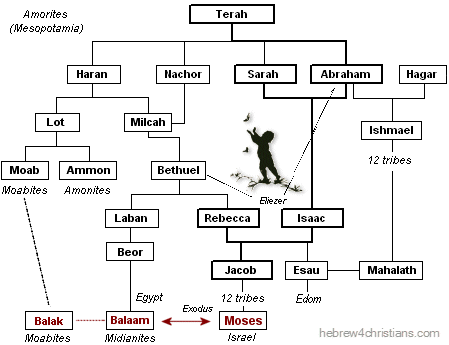 |
Note that the name "Beor" first appears in connection with a king of Edom (Gen. 36:32), which suggests that Balaam might have once been a king of the Edomites (i.e., the descendants of Esau). Further note the phonetic similarity to Peor. If Beor and Peor are the same, then Balaam was actually a prophet of Baal Peor, a local Semitic god.
Balaam was regarded as a great seer, magician and an adept in the occult. He had an "evil eye" and drew the spirit of demons to anything he gazed upon (Avot 5:22). His notoriety made him famous, and powerful people asked him to invoke curses on their enemies. The Talmud (Sanhedrin 106a) states that Balaam became so famous as a magician that he later became a chief advisor to Pharaoh. It was Balaam who advised the new Pharaoh to enslave the Israelites and to afflict them with brutal taskmasters (Exod. 1:8-11). For more information about the identity of Balaam, see the entry entitled, "The Curses of Balaam."
Cleansing from Death...
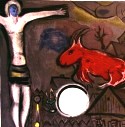
[ The following entry concerns this week's Torah reading, parashat Chukat, though the mysterious themes of purity and impurity are first described in parashat Tzav... ]
07.08.22 (Tammuz 9, 5782) Contact with the dead causes spiritual impurity (i.e., tumah) because death, as the separation from life, is the ultimate expression and consequence of sin. People routinely deny the meaning of death, explaining it away as the result of some cause from which one might escape ("he worked too hard," "she got sick," "it was an accident," etc.). People rationalize death because they refuse to see it as the effect of sin, the consequence of the original transgression of Adam and Eve that humanity as a whole has "inherited" (Gen. 2:17; 3:19; Rom. 5:12). Therefore the Torah states that the birth of a child results in impurity (Lev. 12:2,7). Full atonement comes from "digging up the root of sin" by being purified from its source, namely, the metaphysical curse of death itself. The Red Heifer alludes to the sin of the Golden Calf, which finds its source in the original idolatry of Adam and Eve. Even the blood of the sacrifice was burned to ash "outside the camp," putting a complete end to the "life of death" and its power to corrupt. The Red Heifer is therefore a special sort of "sin offering" (chatat) that cleanses from contact with death itself (Num. 19:9).
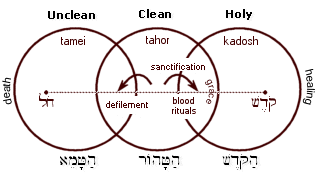 |
Note: The "fall" of man implies that we have contact with death - both inwardly and outwardly. The sacrifice of Yeshua as our "Red Heifer" cleanses us from all tumah and lovingly makes us clean (tahor) before the Father. The "water and the blood" is part of the "olah sacrifice" of Yeshua for our redemption and purification before God offered at Calvary (John 19:34, 1 John 5:6). The water and blood flowing from His wounds are the means by which we are purified from sin and death... All this comes from the love (chesed) of God given in our Messiah and Savior. Just as the sacrifice of the Red Heifer cleansed from the effects of physical death, so the sacrifice of Yeshua cleanses us from the effects of spiritual death. For more on this subject, see the "Gospel of the Red Cow." Shabbat shalom and love to you, chaverim.
Hebrew Lesson
Psalm 51:2 reading (click):
A Divine Discontent...

07.08.22 (Tammuz 9, 5782) In the busyness of the day, in anxious murmurings of the heart, Lord, I have missed you... in my haste, I have lost sight of you; I have heeded voices of fear; I have sought after my own way... Dear LORD God, leave me not, neither forsake me - despite my wandering, despite the ambivalence of my soul, for "whom have I in heaven but you," and to whom shall I turn for life in this world? I have no good apart from You... Help me escape the vanity and deceit of my own heart; help me to focus on what is real. Let not this day be lost to triviality; let it not be marked by unuttered prayer or lost passion for heaven. "As a deer longs for streams of water, so my soul longs for you, O God. I thirst for God, for the living God. When shall I come and appear before God?" (Psalm 42:1-2). Grant me this blessed hunger and thirst for you; impart holy desperation and longing for you alone; turn my heart to seek you bekhol levavkha, with all my heart...
As I've said before, God's people are always "strangers" in this world; they are literally "e-stranged" -- living here, yet not here. We are outsiders and pilgrims, not at home in this world, and our faith therefore is both a type of "protest" against any interpretation of reality that excludes, suppresses, denies, or minimizes the Divine Presence as well as a longing for the place where we truly belong.... If you feel crazy in an insane situation, then you are really quite sane... The world will feel oppressive and strange once you have been awakened from its madness and refuse to be moved by the delusions of the crowd... Life in olam hazeh (this world) is a place of poignant passing that leads to the world to come. Our faith affirms that underlying the surface appearance of life is a deeper reality that is ultimately real and abiding. It "sees what is invisible" (2 Cor. 4:18) and understands (i.e., accepts) that the "present form of this world is passing away" (1 Cor. 7:31).
"Blessed art Thou, LORD our God, who never leaves nor forsakes us, and who draws us close through hunger and thirst." We are truly blessed when we ache with heartfelt longing for the Divine Presence... Feeling content, cocksure, satisfied, numb, etc., is a sign of a dreadful condition of heart. "You, God, are my God, earnestly I seek you; I thirst for you, my whole being longs for you, in a dry and parched land where there is no water" (Psalm 63:1).
"Now to the One who is able to keep you from falling, and to cause you to stand, rejoicing, without blemish before His glorious presence, to the only God our Savior through Yeshua the Messiah, our Lord and great Lamb of God, be glory, majesty, power, and authority, before all time, and now, and for all eternity. Amen." Shabbat Shalom and may you be filled with all the fullness of God's love in our beloved Savior and LORD.
Hebrew Lesson:
Psalm 42:2 reading (click):
Blessed Hunger and Thirst...

07.08.22 (Tammuz 9, 5782) Our Lord said: "Blessed are those who hunger and thirst for righteousness..." (Matt. 5:6). Yes, blessed are those who suffer such desperate need, who know inner emptiness, who are not made numb to the ache, and who cry from the heart for deliverance. Blessed are those who are in dread over themselves, who fall as one dead before the Divine Presence, who know they are undone, ruined, and dying for life... The great danger, spiritually speaking, is to become complacent, untouched by poverty of heart, to be lulled asleep, lost within a dream, made comatose, living-yet-dead. The gift of faith first reveals our own lostness and then imparts courage to live with ourselves despite ourselves as we seek God's healing and life... Let us press on, dear friends.
Hebrew Lesson:
Matthew 5:6 reading (click):
Paradox and Faith...

07.08.22 (Tammuz 9, 5782) Our Torah portion this week (i.e., Chukat) describes the sacrifice of parah adumah (פרה אדומה), or the "Red Heifer" (see Num. 19:1-10). The Red Heifer is considered paradoxical to most Jewish thinkers, since the one who offers this sacrifice becomes ritually impure, while the sprinkling of the ashes from it makes people clean... The ritual is considered chok (חק) within Jewish tradition, meaning that it makes no rational sense. The Talmud states that of all the 613 commandments given in the Torah, even King Solomon with all his wisdom could not fathom this decree. However, the sacrifice of Yeshua the Messiah can be understood as the fulfillment of the symbolism of the Red Heifer: Both were entirely rare and without defect (sin); both were sacrificed "outside the camp"; both made the one who offered the sacrifice unclean but made the one who was sprinkled by it clean; and finally, both sacrifices cleanse people for priestly service.
The Red Heifer had to be a perfect specimen (temimah) that was completely red, "without blemish, in which there is no defect (mum)." The rabbis interpreted "without blemish" as referring to the color, that is, without having so much as a single white or black hair. This is the only sacrifice in the Torah where the color of the animal is explicitly required. Moreover, the Red Heifer was never to have had a yoke upon it, meaning that it must never have been used for any profane purposes.
Unlike all other sacrifices offered at the altar, the red heifer was taken outside the camp and there slaughtered before the priest, who then took some of its blood and sprinkled it seven times before the Mishkan (thereby designating it as a purification offering). [During the Second Temple period, the High Priest performed this ceremony facing the Temple while atop the Mount of Olives.] Then the red heifer would be burned in its entirety: its hide, flesh, blood, and even dung were to be burned (unlike other Levitical korbanot). Do not miss this: unlike all other animal sacrifices, all the blood of the offering was to be burned in the fire.
Hyssop, scarlet yarn, and a cedar stick would then be thrown upon the burning Red Heifer (these same items were used to cleanse from tzara'at, skin disease). In other words, the blood was assimilated into the ashes of the sacrifice, which were then gathered and mixed with water to create the "water of separation" (mei niddah) for the Israelite community. Note that the word "separation" (niddah) refers to menstrual impurity and hearkens to Zech. 13:1: "On that day there shall be a fountain opened for the house of David and the inhabitants of Jerusalem, to cleanse them from sin and from niddah."
Anyone (or anything) that came into contact with a corpse (the embodiment of sin and death) was required to be purified from tumah by means of the mei niddah. The purification procedure took seven days, using stalks of hyssop dipped into the water and shaken over the ritually defiled person on the third day and then again on the seventh day. After the second sprinkling, the person undergoing the purification process would be immersed in a mikvah (pool of running water) and then be unclean until the following evening.
According to Jewish tradition, the red heifer sacrifice was to atone for the sin of the Golden Calf, though the Torah itself does not make this association. The LORD Yeshua, our High Priest of the New Covenant, is the perfect fulfillment of the Red Heifer, since he was completely without sin or defect (2 Cor 5:21; John 8:46); he was sacrificed outside the camp (Heb 13:13); he made himself sin for us (2 Cor 5:21); his sprinkling makes us clean (1 Pet 1:2; Heb 12:24; Rev 1:5); and the "water of separation" that his sacrifice created is the means by which we are made clean from the impurity of sin (Eph 5:25-6; Heb 10:22).
As mentioned above, Torah commandments (mitzvot) that defy reason are called "chok" (חק). The Jewish sages tend to focus on the Red Heifer as the "mother of all mystery mitzvas," but surely we must go back to the Akedah - that is, to the sacrifice of Isaac at the hand of his father Abraham - as the greatest of God's decrees that defy human reason. The willingness of both Abraham and Isaac to obey - despite their inability to understand - was a direct result of their unwavering faith in God's love and promises. Likewise the heart of our faith says simply: "Jesus saves." His sacrifice saves us from sin and death, yet this also is "chok" - a matter of faith... We may seek logical reasons or explanations, but ultimately it is a matter of divine mystery, just as the darkness covered the earth while the Savior suffered for us on the cross at Calvary (Mark 15:22). "Jesus saves" is the mystery of our confession (Rom. 10:9-10). We are cleansed by our contact with sin and death through him, just as he bears our sin and defilement on our behalf. as it is written: "God made the One who did not know sin to be sin for us, so that in him we would become the righteousness of God" (2 Cor. 5:21).
"But when Messiah appeared as a High Priest (כּהֵן גָּדוֹל) of the good things that have come, then through the greater and more perfect tent (not made with hands, that is, not of this creation) he alone entered once for all into the Holy Places, not by means of the blood of goats and calves but by means of his own blood, thus securing an eternal redemption (גְּאוּלַּת עוֹלָם). For if the blood of goats and bulls, and the sprinkling of defiled persons with the ashes of a heifer (אֵפֶר הַפָּרָה), sanctify for the purification of the flesh, how much more will the blood of Messiah (דַּם הַמָּשִׁיחַ), who through the eternal Spirit (בְּרוּחַ עוֹלָם) offered himself without blemish to God, purify our conscience from dead works to serve the living God (אֱלהִים חַיִּים)?" Heb. 9:11-14
The Torah of the new covenant is inner, deeper, and eternal, whereas the Torah of the older covenant is outer, limited, and subject to obsolescence (Heb. 7:12; 8:13). The older covenant foretold of the coming Substance by means of the "ashes that purify the impure yet make the pure, impure." Only after we have been "sprinkled with the ashes" are we made clean from death; only when we make contact with the "ashes of Yeshua" offered on our behalf are we cleansed from sin and death (1 Pet. 1:2; Heb. 10:22).
Podcast:
Hebrew Lesson
Psalm 51:7 reading (click):
The Sin of Moses...
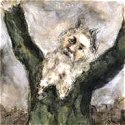
07.08.22 (Tammuz 9, 5782) Our Torah portion this week (i.e., parashat Chukat) includes the account of the sin of the great lawgiver of Israel: And God said, "Speak to the rock..." but Moses struck the rock twice with his staff" (Num. 20:8,11). This was Moses' transgression for which his punishment was exile from the Promised Land. The punishment might seem severe, but God intended Moses' actions to be prophetic. When the people first demanded water at Rephidim, Moses was told to strike the rock with his staff (Exod. 17:6). The Hebrew word used to describe how Moses "struck" the rock is the same used to describe how Yeshua was "smitten by God" (Isa. 53:4). The Rock symbolized the Messiah, the One stricken for His people to give them waters of life (Isa 55:1; 1 Cor. 10:4). Moses' act of disobedience implied that rock needed to be stricken again to give life, instead of speaking to it as the "Living Rock." In his frustration, Moses lost sight of the LORD by suggesting that he and Aaron were responsible for the miracle of the water ("listen, you rebels, shall we bring forth water for you?"[Num. 20:10]), and God could not leave those words unanswered before the people. That is why God told Moses that his exile from the land was the result of his sin not sanctifying (i.e., honoring) the LORD before the people of Israel (Num. 20:12).
Hebrew Lesson
Psalm 78:15 reading (click):
Note: The sages sometimes expressed dismay that Moses was bereft of seeing his dream come true by entering the Promised Land, but we know that there is a happy ending regarding that point (see Matt. 17:3).
Seeing beyond the Seen...

07.08.22 (Tammuz 9, 5782) Yeshua told us: "Blessed are those who have not seen and yet have believed" (John 20:29). Despite the struggle of this life - our sorrows, pains, and even death itself - we believe in God's love and promise for us, even if we do not presently see the fulfillment of our hope, just as Abraham believed the promise that he would be the father of an innumerable multitude long before he saw any sign of its fulfillment. Abraham "believed the impossible" and "hoped against hope" (παρ᾽ ἐλπίδα ἐπ᾽ ἐλπίδι), meaning that hope kindled within him even though there was nothing to see in the realm of the natural -- he believed in an unseen good; he trusted in the One who gives life to the dead and who "calls into existence the things that do not exist" (Rom. 4:17). The Scripture comments: "He did not weaken in faith when he considered his own body, which was as good as dead (since he was about a hundred years old), or when he considered the deadness of Sarah's womb. He did not stumble over the promise of God through unbelief but was strong in faith, and gave glory to God, fully persuaded that God was able to do what he had promised, and that is why his faith was counted to him as righteousness" (Rom. 4:19-22).
Likewise we are called to believe in an unseen good, an unimaginably wonderful destiny for our lives, as it says, "Things no eye has seen, nor ear heard, nor mind imagined, are the things God has prepared for those who love him" (1 Cor. 2:9). Faith does not use natural reason or the evidence of the senses to see the unseen, but it "believes to see" through "eyes of the heart" to know the hope of God's calling and to attain the blessing (Eph. 1:18). Faith in God's love comes from a different source and has a different means of apprehension than human wisdom, so that no matter how things might appear in this fallen world, the LORD God may be known and trusted to work all things for our ultimate good. "Blessed are those who have not seen and yet have believed." Amen.
Hebrew Lesson:
Psalm 27:14 Hebrew Reading:
Finding Inner Peace...

07.07.22 (Tammuz 9, 5782) An ultimate question is whether you feel "safe" with the truth of who you really are... When you are all alone, in a moment of still silence, when the entire world is asleep and suspended, what is the message of your heart's cry? Are you okay? Do you trust who you are or what is happening to you, or do you experience anxiety, a sense of lostness, inner pain? Comfort is found in God's grace. His promise is given to the sick at heart, to those who understand their need for a physician (Matt. 9:12). Since there is nothing about you to commend before God, you are made free to abandon yourself to the divine love. This is the "Name of the LORD," after all, and your heart's cry for love is a "prayer" uttered in that Name. Your heavenly Father sees in secret (Matt. 6:6). Consider the birds of the air; they are unreflective, alive in the atmosphere of God's care.
What a great blessing to let go of your fear; what sweet relief! Surrender to the truth of your helplessness; rejoice that you are "poor in spirit," and discover that yours is the Kingdom of Heaven (Matt. 5:3). So don't give up your faith, my friend. God promises to be with you to the end, leading you to the place where your heart will forever be satisfied in his love.
Hebrew Lesson:
Isa. 30:15b Hebrew Reading:
No Good without God...

07.07.22 (Tammuz 8, 5782) As believers in the LORD we must learn to see beyond the temporal to behold the eternal; we must look past the shadows to see the Substance. In a sense we have to close our eyes and walk in the darkness of faith to see the supernal light which transcends the atmosphere of this world (2 Cor. 5:7). Faith separates us from the visible and temporal realm (i.e., chayei sha'ah: חיי שעה) before the invisible and eternal realm (i.e., chayei olam: חיי עולם); it hears (shema) the "yes" of the LORD in the midst of worldly dissipation and despair. Faith is the heartache, the groaning, and the yearning for undying love. "Whom have I in heaven but you? And there is nothing on earth that I desire besides you. My flesh and my heart may be consumed, but God is the strength of my heart and my portion forever" (Psalm 73:25-26). This world appears to the eye of faith a strange place, and here we are no more than sojourners as we look for our heavenly habitation whose builder and maker is God (Heb. 11:10; John 14:1-3). Our hearts yearn for the unseen good, healing beyond death to life, the realm of promise and blessing and unending grace... (selah!)
The Torah begins: "In the beginning (בראשׁית) God created the heavens and the earth, and the earth was "tohu va'vohu v'choshekh" (תהו ובהו וחשׁך) - confusion and emptiness and darkness - which the sages interpret to mean that when we truly understand that God created the heavens and the earth, we will realize our earthy desires to be barren, empty and unreal. In their despair, Plato and the early Greek philosophers sought "timeless universals" which they believed disclosed the reality of an "upper world," a heavenly realm of unchanging goodness, beauty, and truth. The world we experience with our senses is a shadowy place of change and decay; but the real world, discerned by clear thinking, is a place of permanence, goodness and illumination. Likewise the righteous soul trusts that despite this fleeting world that turns to dust, there is an eternal realm, a place of abiding love, and a heavenly home. "For here we have no lasting city, but we seek the city that is to come" (Heb. 13:14). Therefore "we look not to the things that are seen but to the things that are unseen; for the things that are seen are transient (πρόσκαιρος), but the things that are unseen are eternal. For we know that if the tent that is our earthly home is destroyed, we have a building from God, a house not made with hands, eternal in the heavens" (2 Cor. 4:18-5:1). In this world we suffer exile, groaning to be with our Savior, the Source of all blessing: "I say to the LORD, "You are my Lord; I have no good apart from you" (Psalm 16:2).
Hebrew Lesson
Psalm 16:2 reading (click):
Faith (i.e., emunah) is a "double movement" of the heart. It both "sees what is invisible" (2 Cor. 4:18) and understands (i.e., accepts) that the "present form of this world is passing away" (1 Cor. 7:31). Faith rests in God's providential hand over the chaos and flux of creation. The eye of faith beholds the Presence of God and His reign over all the mundane affairs of this world. Indeed, it is only by fixing our hope upon the eternal that we are enabled to rightly apprehend the nature of the temporal world itself. In fact, the word emunah (אמונה) shares the same root as the Hebrew word for truth (אמת). In that sense, "seeing what is invisible" (τὰ μὴ βλεπόμενα) is a more fundamental type of "seeing," since the truth of hope ultimately interprets all other ways of seeing...
Sowing and Reaping...
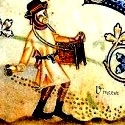
[ We are always "sowing" into our hearts and "reaping" its consequences in our lives... ]
07.07.22 (Tammuz 8, 5782) "Do not be deceived: God is not mocked, for whatever one sows, that will he also reap. The one who sows to his own flesh will from the flesh reap corruption, but the one who sows to the Spirit will from the Spirit reap eternal life" (Gal. 6:7-8). Here we see the importance of feeding the divine nature given to us in Messiah - to "sow" or "plant" truth within our hearts so that we will yield the "fruit of righteousness." However, feeding the lower nature, gratifying the desires of the flesh, disregarding the truth of eternity for the sake of temporal pleasure, and so on, leads to corruption and to death. "For to be carnally minded is death, but to be spiritually minded is life and peace" (Rom. 8:6).
Spirituality (רוּחניוּת), then, is of utmost importance to us, as we learn to "renew our minds" and yield ourselves to the truth of God (Gal. 5:16). We are engaged in the battle daily - an internal struggle to direct our hearts and to make the decision to be awake to the Lord's Presence or to surrender to our fallenness, fear, and despair (Rom. 8:13). The Lord has promised us his very strength for the battle, but we must choose to believe in order to receive the blessing. Since God will help us as we seek to honor and do His will (see 1 John 5:14), we can be confident of blessing as we draw near to the Throne of Grace to receive mercy and find grace to help in time of our need (Heb. 4:16). God is forever faithful and makes the way of escape for those who trust in him (1 Cor. 10:13). The LORD God Almighty says to your heart: "Fear not, for I am with you; be not dismayed, for I am your God: I will strengthen you, yea, I will help you, yea, I will uphold you the right hand of my righteousness (Isa. 41:10).
Hebrew Lesson
Isaiah 41:10 reading (click):
Beauty for Ashes....

[ The following is related to this week's Torah reading, parashat Chukat... ]
07.06.22 (Tammuz 7, 5782) The ashes of the red heifer represented the death and sacrifice of something extremely rare, valuable, and precious. The ashes were mixed with "living water" (מַיִם חַיִּים) to reveal the truth that though the end of all flesh is but dust and ashes, the Spirit gives cleansing and life. Indeed the word ashes (אֵפֶר) may be rearranged to spell both cure (רַפֵא) and beauty (פְאֵר). The author of the book of Hebrews argues from the lesser to the greater: If the sprinkling of water mixed with the ashes of a red heifer purify the flesh from contamination with physical death, how much more does the blood of Messiah purify the soul from the deeds that cause spiritual death? (Heb. 9:13-14). Indeed, because of Yeshua's sacrifice we are given "beauty for ashes, the oil of joy for mourning, the garment of praise for the spirit of heaviness," that we may be called oaks of righteousness, the planting of the LORD, that He may be glorified (Isa. 61:3).
Hebrew Lesson
Psalm 30:11 reading (click):
Keep the Faith (לִשְׁמוֹר אֱמוּנִים)

[ "Salvation is free, but discipleship will cost you your life." - Dietrich Bonhoeffer ]
07.06.22 (Tammuz 7, 5782) When Israel believed the report of the faithless spies, Moses commented: "You were not willing to ascend (וְלא אֲבִיתֶם לַעֲלת), but became embittered (מָרָה) against the Word of the LORD your God" (Deut. 1:26). Moses' rebuke was not that the people were afraid to conquer the land as much as that they had lost heart and no longer desired to take hold of God's promise. The people gave up their dream; they forsook their hope; and they had lost the "devotion of their youth, their love as a bride, how they followed the LORD in the desert, into a land not sown" (Jer. 2:2). The people's failure was on two levels: First they lapsed in faith by abdicating trust in God's word, and second, they had lost the passion of their first love. In light of this, the sages say that the greater problem was that of losing heart, since the heart directs the will to believe in the miracle of God, or not...
Moses' rebuke of the people's heart condition recalls the sober warning Yeshua gave to the Ephesian believers: "I know your works, your toil and your patient endurance, and how you cannot bear with those who are evil, but have tested those who call themselves apostles and are not, and found them to be false. I know you are enduring patiently and bearing up for my name's sake, and you have not grown weary. But I have this against you, that you have abandoned the love you had at first. Remember therefore from where you have fallen; repent, and do the works you did at first. If not, I will come to you and remove your menorah from its place, unless you repent" (Rev. 2:2-5). Likewise the author of the Book of Hebrews commented: "And to whom did he swear that they would not enter his rest, but to those who were disobedient? And with whom was he provoked for forty years? Was it not with those who sinned, whose bodies fell in the desert? So we see that they were unable to enter because of unbelief" (Heb. 3:17-19). The question of our faith is essential: "It is a fearful thing to fall into the hands of the living God" (Heb. 10:31).
Hebrew Lesson
Psalm 119:10 Hebrew reading:
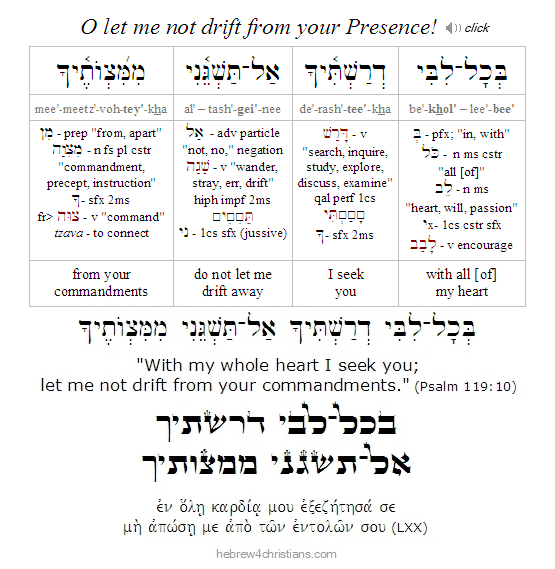 |
Testing and Offense...
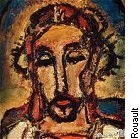
07.06.22 (Tammuz 7, 5782) People today are quick to take offense, made prisoners of their own insecurities... Ironically, the more you seek your own honor, the less you'll find. Turn yourself around; get out of yourself: "Whoever exalts himself will be humbled, and whoever humbles himself will be exalted." "If anyone would be first, he must be servant of all" (Mark 9:35). "And blessed is the man who is not offended" (וְאַשְׁרֵי הָאִישׁ אֲשֶׁר לא־יִכָּשֵׁל).
The devil (and his political advocates in this world) seeks to "divide and conquer" people by emphasizing what makes them different. The evil one creates fear to manipulate and terrify others: he seeks to sow seeds of mistrust, suspicion, and hatred based on fear and ignorance. We must fight the power of the lie by means of the truth of the LORD God Almighty. All people are created be'tzelem Elohim (בְּצֶלֶם אֱלהִים), intended to be image-bearers of the Divine, and each soul will give account for its life for every careless thought, word, and deed (Matt. 12:36-37). As it is written, "No creature is hidden from his sight, but all are naked and exposed to the eyes of him to whom we must give account" (Heb. 4:13). Refuse, therefore, to take offense over anything - over perceived insults, over attacks on your character, and especially over the "news" (i.e., rumors and propaganda) of this evil world, friends. All things come from the hand of God to test you; to refine what is in your heart (even those who sow division: ). Give up your personal "rights" and surrender yourself to the providential care of your Heavenly Father. But regarding the affairs of this world, understand that the nations are tohu (תהוּ), "confusion and unreality" (Isa. 40:17), and the schemes of worldly men are ultimately doomed (Psalm 1:6). Ein od milvado: Understand that the LORD God Almighty is the great King over all the earth (Psalm 47:7).
Hebrew Lesson
Psalm 47:7 reading with commentary (click):
Sanctifying the Truth...
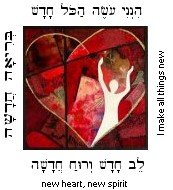
07.06.22 (Tammuz 7, 5782) How do we share the message of God with others? How do we reveal the truth of Messiah in this world? In other words, how may the Spirit of God be manifest within us? The Scriptures say first to "sanctify the Messiah" within our hearts and then we will be ready to give a reason for our hope -- though we must do so in humility and reverence before heaven" (1 Pet. 3:15). We sanctify the Lord by choosing to make sacred place for him within our consciousness; we enshrine him and esteem him beautiful within our affections and actions (Exod. 15:2). When God said to his people, "Let them make for me a sacred place (i.e., mikdash: מִקְדָּשׁ) that I may dwell in their midst," then, he was inviting them to make room within their hearts (בְּתוֹכָם) for His Presence to be revealed (Exod. 25:8). As Yeshua taught us: "The Kingdom of God is within you" (Luke 17:21).
King David understood this principle: "I have set the LORD always before me..." (Psalm 16:8). In other words we must open our eyes to see; we must humble ourselves to believe; and we must open our hearts before the greatness of God. This is the first step, as Yeshua taught us: Avinu shebashamayim, yitkadesh shemekha - "Our Father in heaven, let your Name be sanctified" (Matt. 6:9). As we sanctify the Lord we bear witness of the truth of Reality, and the Spirit of God will empower us to living signs of the Divine Presence. "But the fruit of the Spirit (פְּרִי הָרוּחַ) is love, joy, peace, patience, kindness... (Gal. 5:22-23).
"Know therefore this day and lay it to your heart, that the LORD is God in heaven above and on the earth beneath; there is no other" (Deut. 4:39). Note that the phrase "lay it to your heart" in this verse may better be rendered as "return to your heart" (וַהֲשֵׁבתָ אֶל־לְבָבֶךָ), suggesting that the truth of the LORD is found there within the heart that truly seeks him (Jer. 29:13). Hashivenu! In other words, the truth is found in the heart's seeking for the LORD and His love. Know this truth today... "The most important part of teaching is to teach what it is to know," that is, to know "in your heart."
Hebrew Lesson
Psalm 16:8 reading (click):
|




















































